Matthew Freeman
Dr. Freeman is the Asa Griggs Candler Professor of Environmental Health in the Gangarosa Department of Environmental Health, Rollins School of Public Health.
Emory University
The Rollins School of Public Health at Emory University is a top-ranked public health program located in Atlanta, Georgia, USA.
Our Projects
Our work focuses on enteric disease transmission, behavioral outcomes, equity and gender, and educational outcomes all over the world.
Dr. Matthew Freeman, Dr Marlene Wolfe and Dr. Bethany Caruso will be taking part in the launch of the BMJ - Global Health Supplement in London September 18th. The five papers from this supplement, all led by Emory (plus a commentary led by the WHO), reviewed the literature on hand hygiene in community settings and will directly support the first ever WHO/UNICEF Global Guideline on Hand Hygiene in Community Settings. The launch will also preview the launch of the guidelines and include discussants from WHO, UNICEF, the BMJ, and the UK Government, among others. Co-authors across the papers also include 10 students and staff from Rollins School of Public Health.
Congrats to Hemali Oza, who will be joining the University of Richmond as an Assistant Professor of Health Studies. Hemali uses an interdisciplinary approach, drawing on tools from epidemiology, microbiology, psychometrics, science communication, and public health practice.
Congrats to Courtney Victor, who will be joining the 2025 cohort of the Epidemic Intelligence Service (EIS) at the Centers for Disease Control and Prevention. Established in 1951, EIS has trained over 4,000 disease detectives who have investigated and responded to a wide range of public health challenges and emergencies.
Becky passed her PhD dissertation defense from the University of Washington’s Department of Environmental & Occupational Health Sciences today! Becky was an MPH student in our group and continued collaborating with us through the PAASIM Study as a member of Dr. Karen Levy’s group. Becky’s work was on evaluating the effects of water storage and meteorological conditions on enteric infections in Beira, Mozambique.
Courtney passed her PhD dissertation defense from Emory University’s Environmental Health Sciences Graduate Program today! Courtney’s work was on evaluating the influence of an improved piped water network on water quality and gut microbiome composition among children in Beira, Mozambique.
This month, Rollins Research Review highlighted multiple papers authored by our research group.
Sydney passed her PhD dissertation defense from Emory University’s Environmental Health Sciences Graduate Program today! Sydney’s work was on evaluating the efficacy of water, sanitation, and hygiene interventions in the context of climate change with a focus on urban, coastal Mozambique.
We applied a systems thinking approach to for effective and sustained hygienic systems and discussed strategies that could move us beyond behavior-specific approaches and a behavior change approaches focused predominantly on end-users. This focus beyond individual end-user behaviors will require removing silos across sectors and ministries, the generation of relevant evidence for policymakers and the localization of guidance.
Incomplete reporting of WASH interventions is a critical challenge to learning in the sector. This lack of transparent reporting limits our ability to understand what works, how and where. To address this challenge, a multidisciplinary team of researchers and implementers developed a reporting standard that can be used to insure clear communication of implementation activities for both research and practice: TiDIER WASH. This is derived from the broader movement for transparent implementation reporting with TiDIER.
Inconsistent reporting of WASH implementation illustrates a major challenge in the sector. It is difficult to know what interventions are actually being evaluated and how to compare evaluation results.
Our findings support growing literature that water and food insecurity are important to mental well-being, a key aspect of overall health. Further research is needed to confirm causality along these pathways and determine specific mechanisms through which these interactions take place.
We find clear indications that enteric viral pathogens are associated with growth shortfalls, specifically among asymptomatic children. These findings highlight the need for preventive strategies targeting children with enteric viral pathogens, which could address the consequences of growth faltering.
Research Group Updates
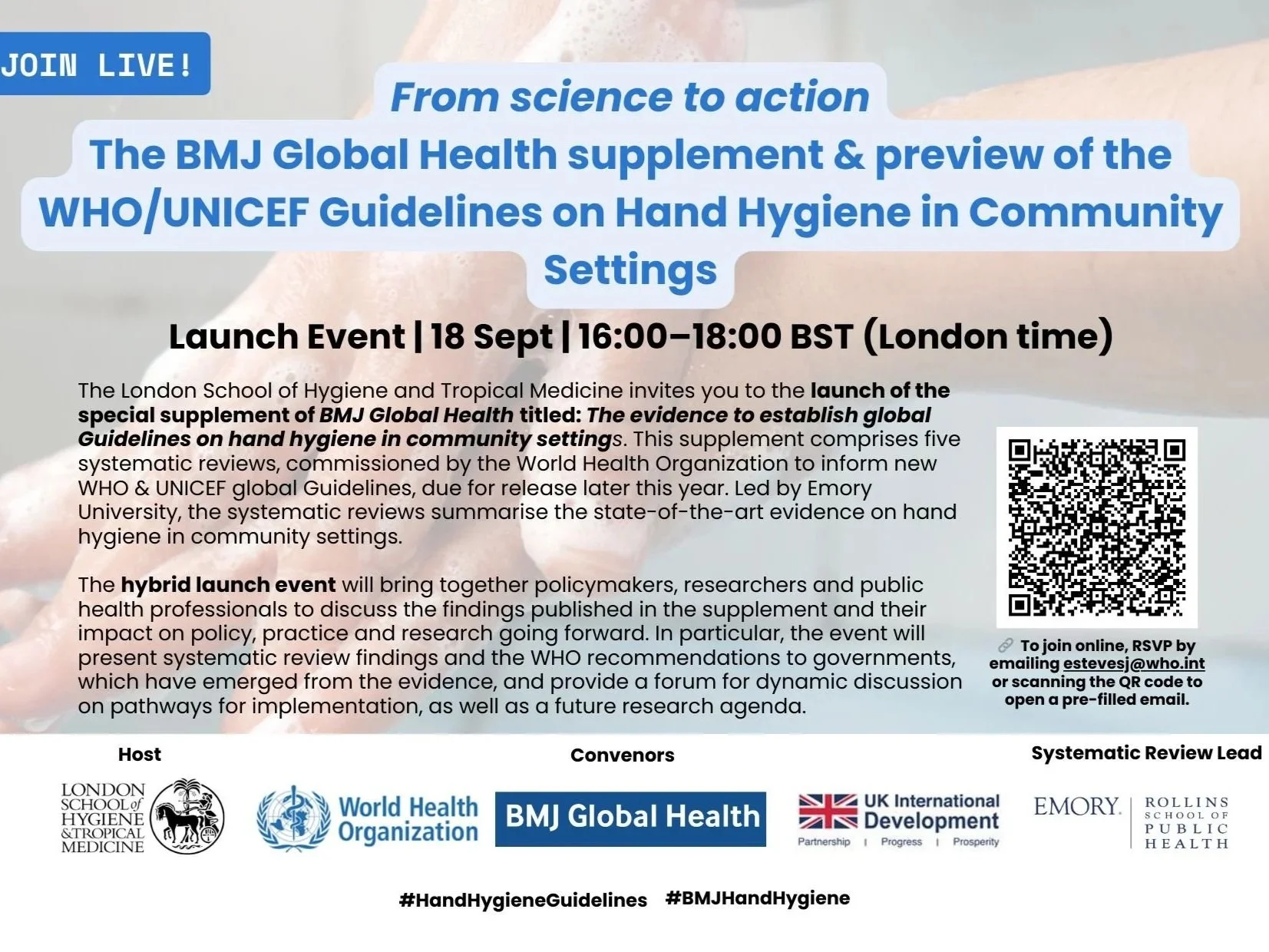
Findings from our systematic review on hand hygiene in community settings will be shared live!

Vannak (Emory) and DP (iDE) out in the field testing our stove use monitoring (SUM) approaches for the AIR-C3 Study. These devices will allow us to track cooking practices across different stove types and generate critical data to inform our clean cooking research in Cambodia.

As part of the AIR-C3 Study, our Emory team members Devi and Vannak, together with iDE colleagues held a training on the design of our willingness-to-pay (WTP) study for the AIR-C3 Study. This effort will help us better understand household demand for induction stoves in Cambodia and generate evidence to guide how clean cooking solutions can be scaled.

Congrats Dr. Courtney Victor on your graduation from the Environmental Health Sciences Program!
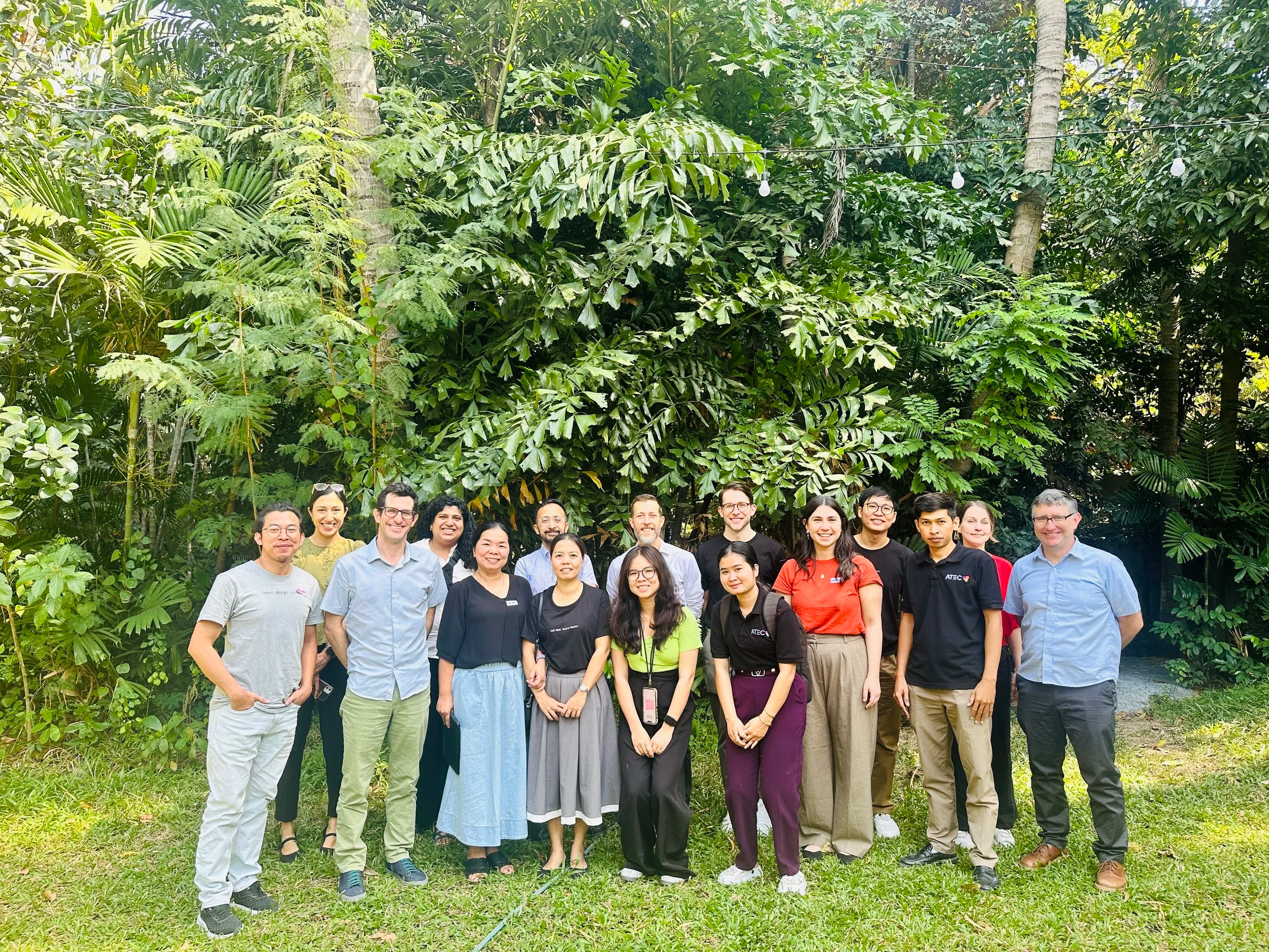
Kicking off the AIR-C3 Study in Cambodia! Our team gathered for a workshop to launch this exciting new project focused on clean cooking. Together with partners from Emory, UC Berkeley, iDE, University of South Carolina, and Colorado State University, we’re working to understand how to make induction stoves more accessible and sustainable for households.

Kicking off soil sample collection training in Quelimane as part of the QUEST Study! Alongside mapping neighborhoods and collecting child health and environmental data, this step will help us better understand links between the urban environment, disease, and wellbeing in Mozambique.
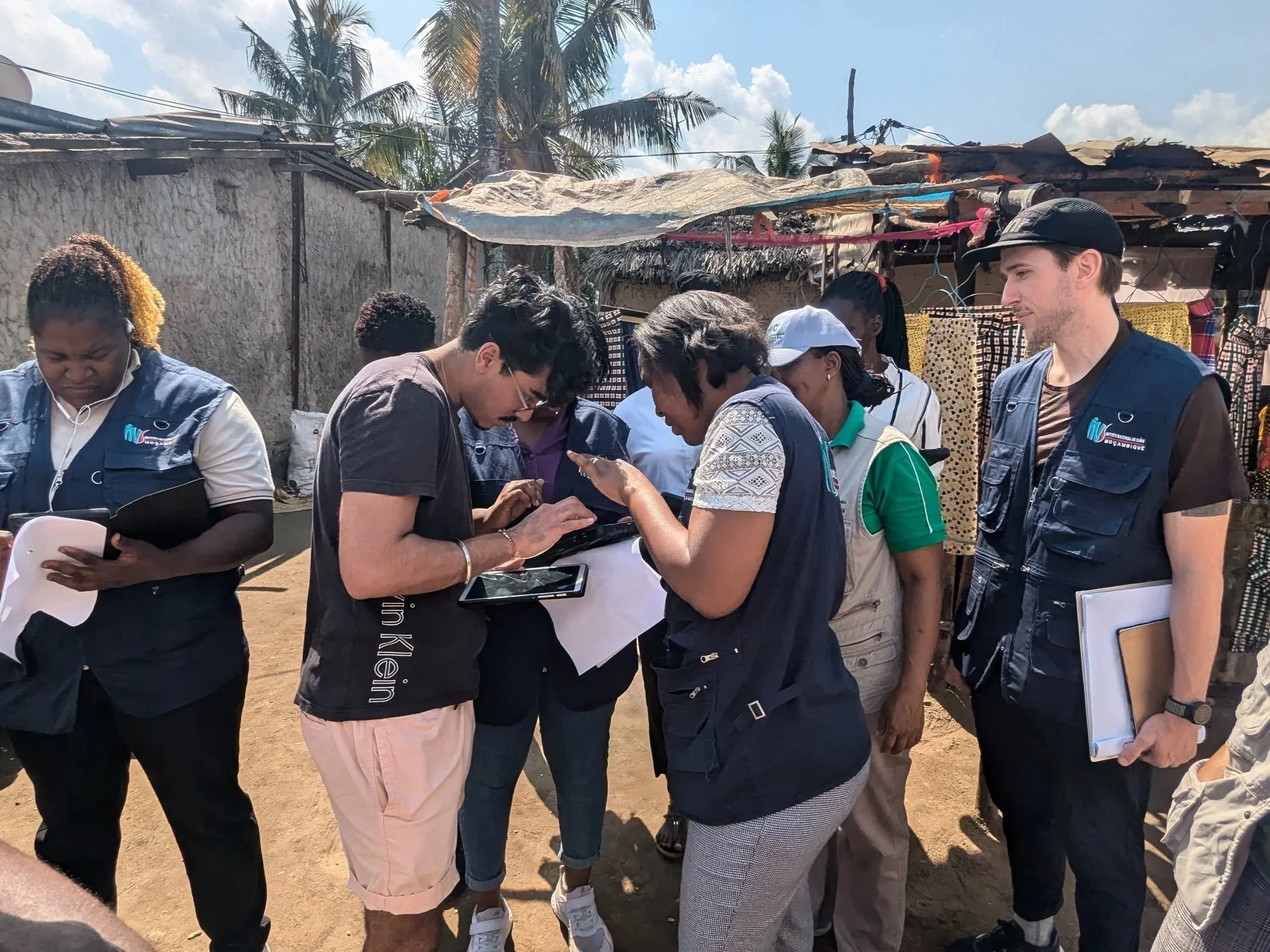
We’ve kicked off a rapid analysis for the QUEST Study to explore how access to water and sanitation varies across neighborhoods. First step: testing mobile surveys with our enumerators — nothing better than seeing the tools in action on the ground!

The last batch of stool samples from our PAASIM Study have officially landed! Next up: processing and analysis to test if and how improvements in water supply in urban Beira, Mozambique reduce or delay enteric pathogen infection, alter gut microbiome composition, and influence enteric dysfunction and other health outcomes in infants.

Celebrating the end of PAASIM Study sample collection with the incredible water and parasitology lab team at Centro de Investigação Operacional da Beira (CIOB) — and marking the occasion with a little chocolate!
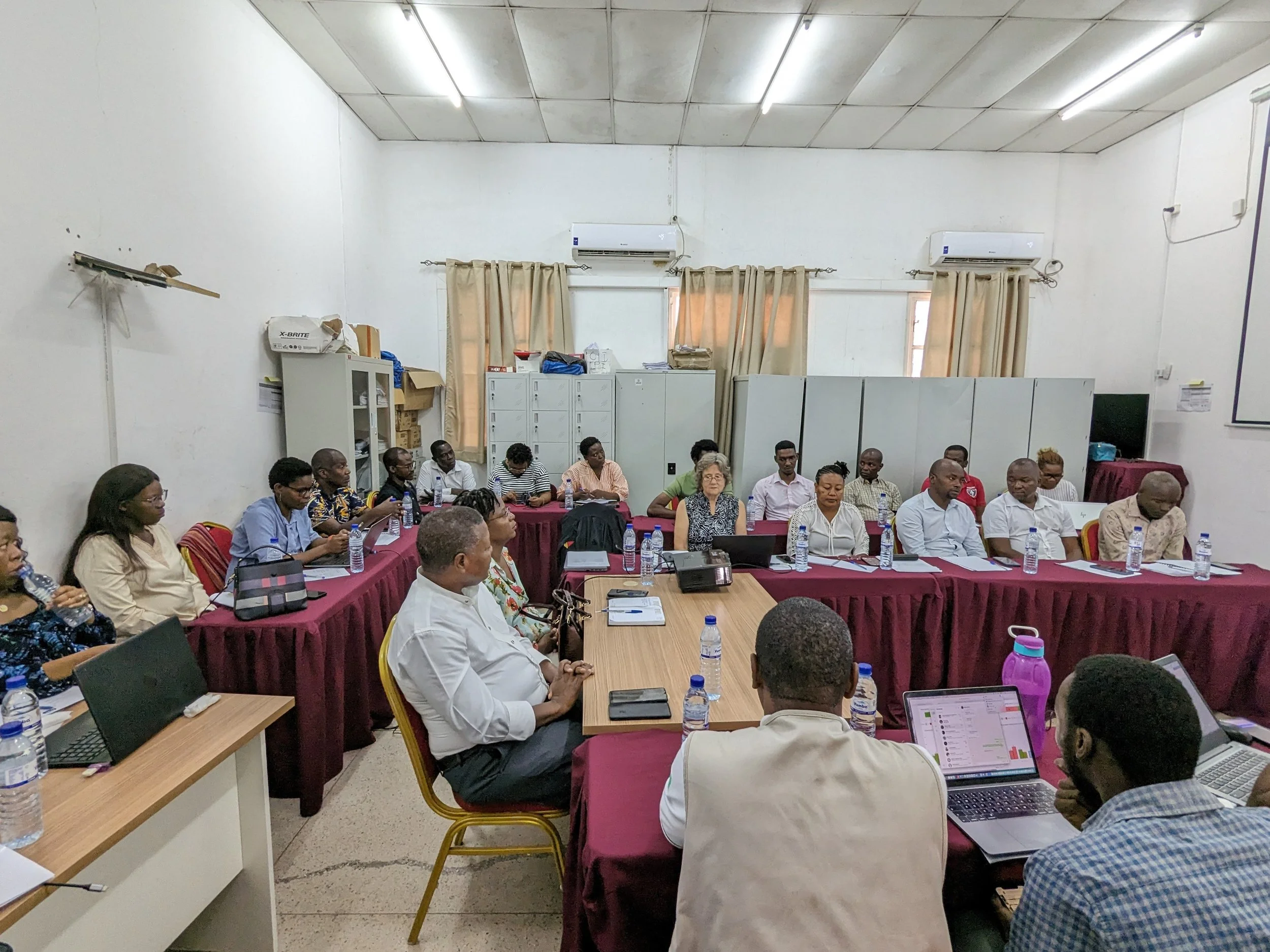
We brought together colleagues at Centro de Investigação Operacional da Beira (CIOB) to celebrate the successful completion of data collection for the PAASIM Study. The event was a chance to recognize everyone’s contributions with certificates of appreciation and to share preliminary results with key stakeholders in Beira. A wonderful moment to reflect on what’s been achieved together and the exciting next steps ahead.

Our systematic review made the cover of The Lancet today! Read more here.
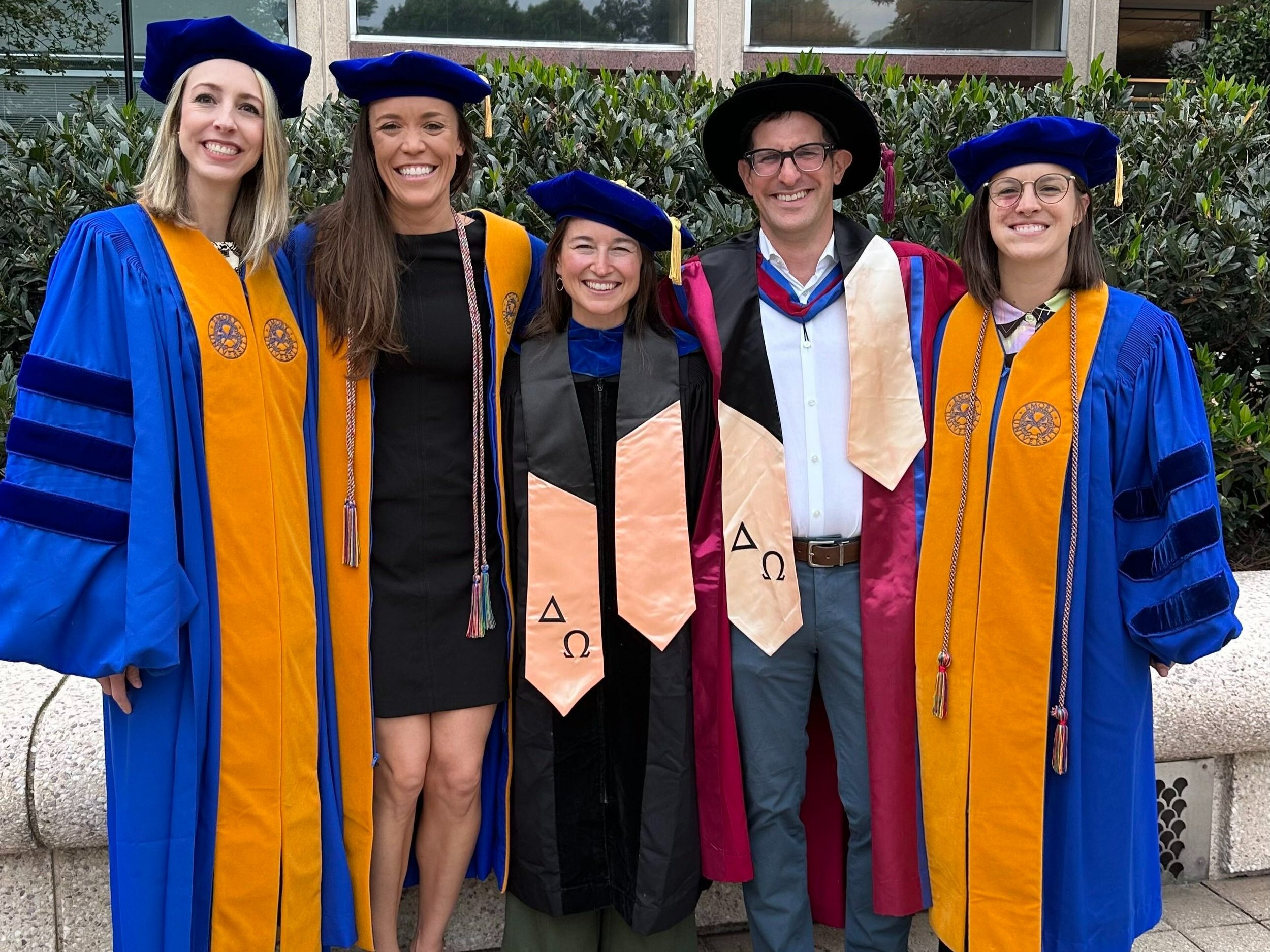
Congrats to the our Environmental Health Sciences Program graduating PhDs including Julia Sobolik, Sydney Hubbard, and April Ballard!
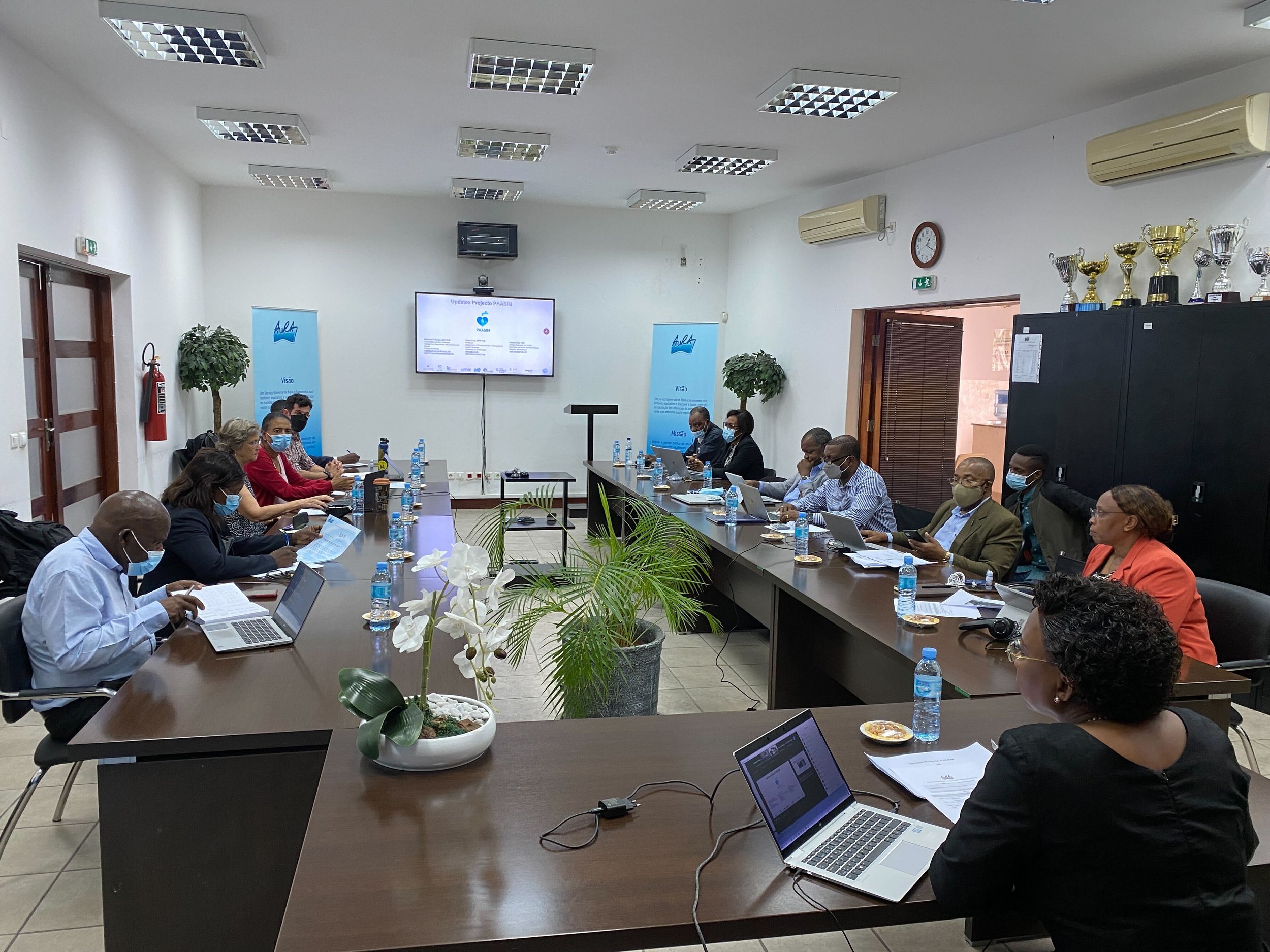
Great stakeholder meeting at AURA for our PAASIM Study. AURA is a partner on the study and a Mozambique institution responsible for ensuring the balance between the quality of the water supply and sanitation services, the interests of users and the economic sustainability of the water supply systems.
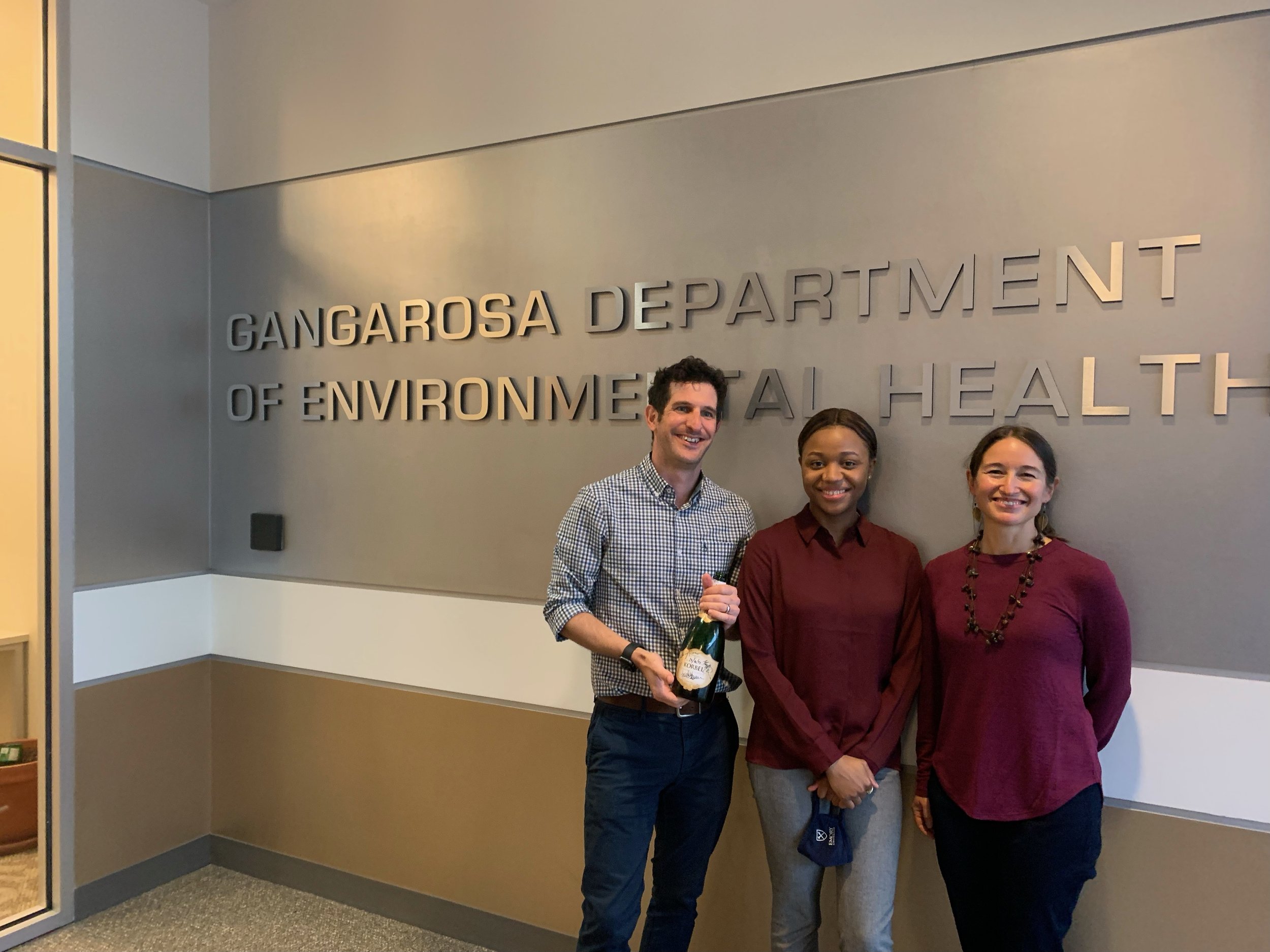
Congrats Dr. Lamar! Next stop, postdoctoral training as a FIRST (Fellowships in Research and Science Teaching) Program Fellow at Emory.
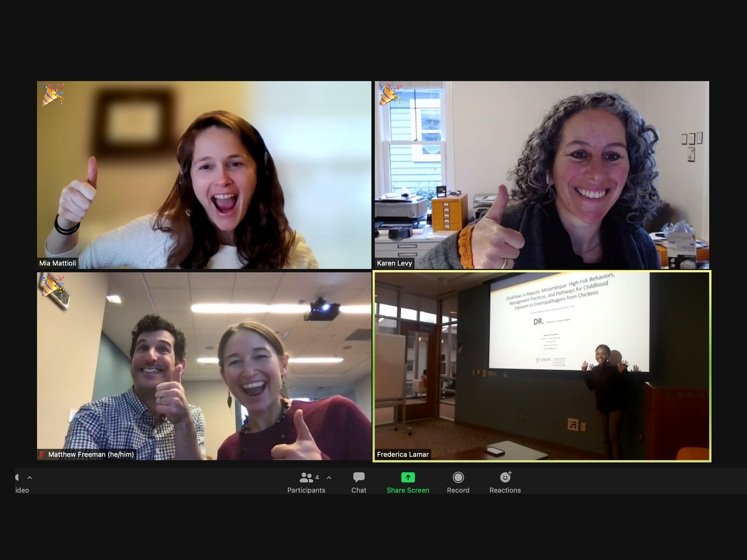
Congrats Dr. Lamar! Next stop, postdoctoral training as a FIRST (Fellowships in Research and Science Teaching) Program Fellow at Emory.
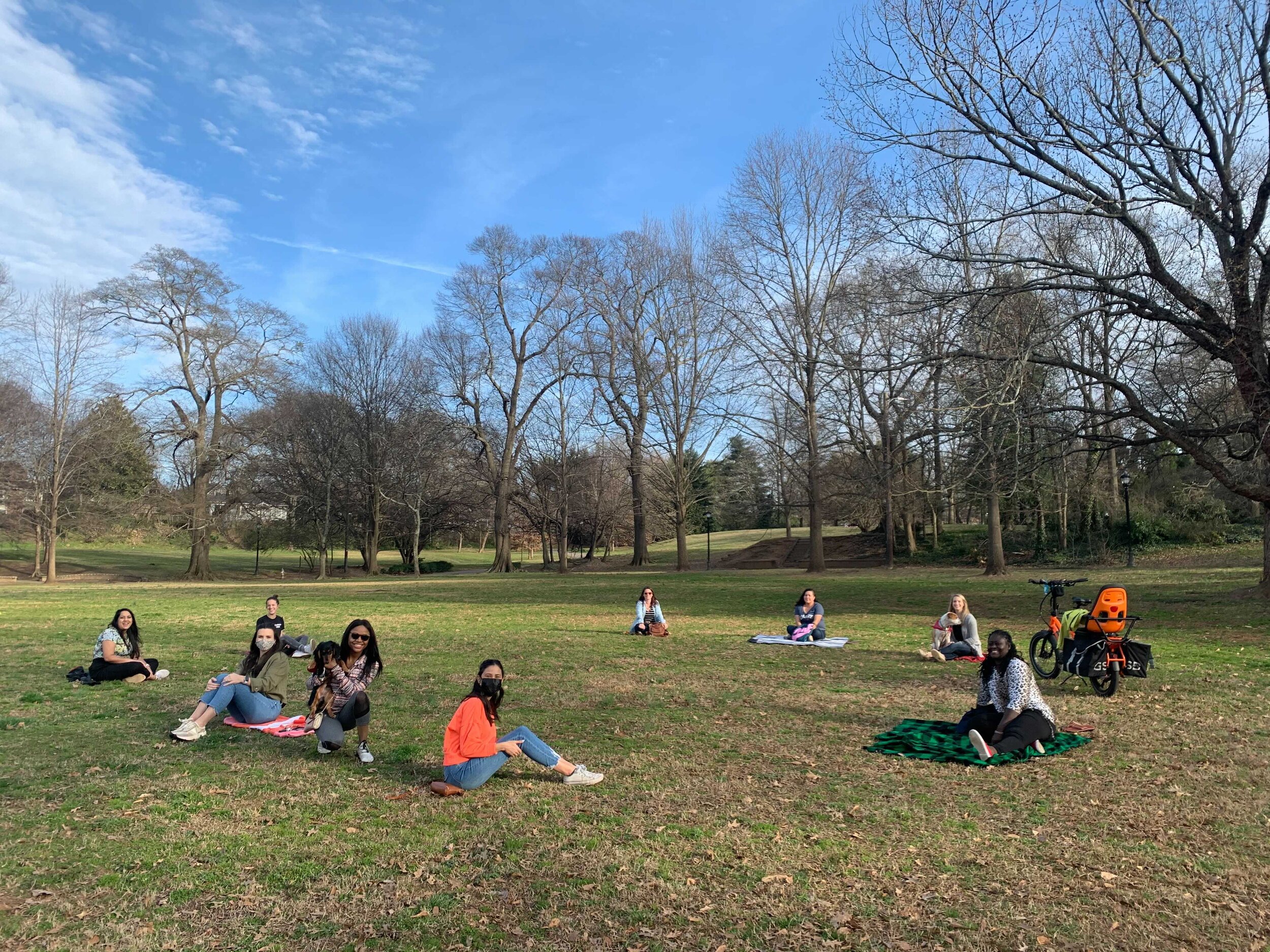
The group got together for a socially distanced meeting to enjoy this Atlanta spring weather!
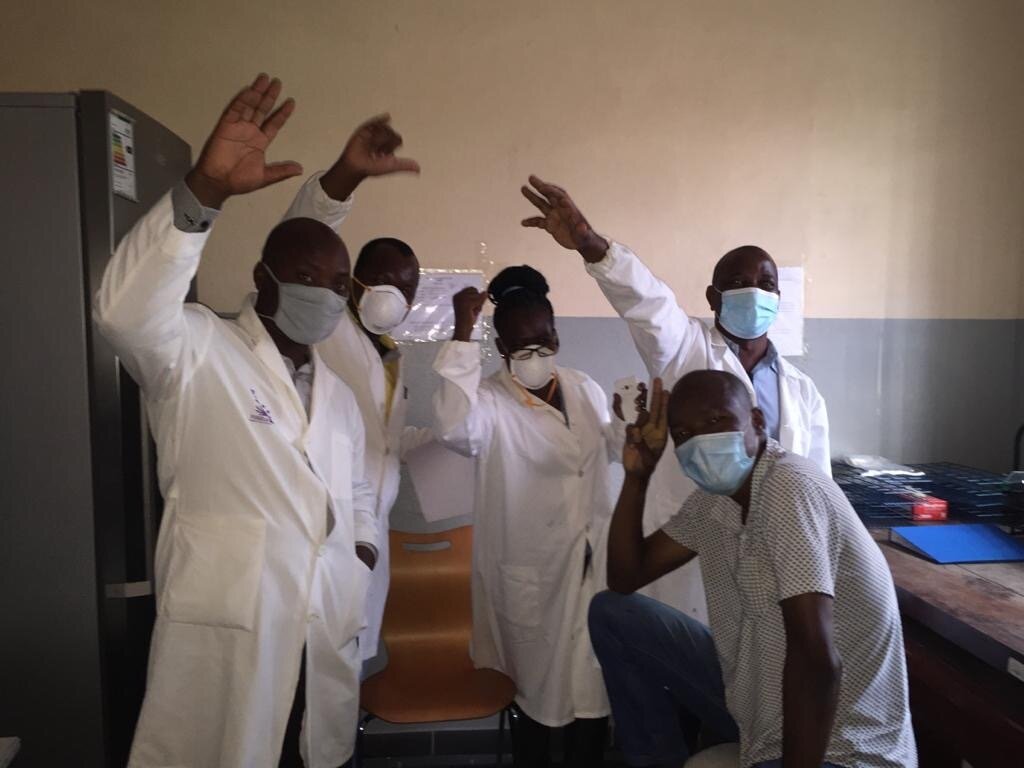
Meet our PAASIM lab team! Over the next two years, this group will be processing thousands of water samples collected from study households throughout Beira, Mozambique and diagnosing potential parasitic infections from fecal samples of study children.
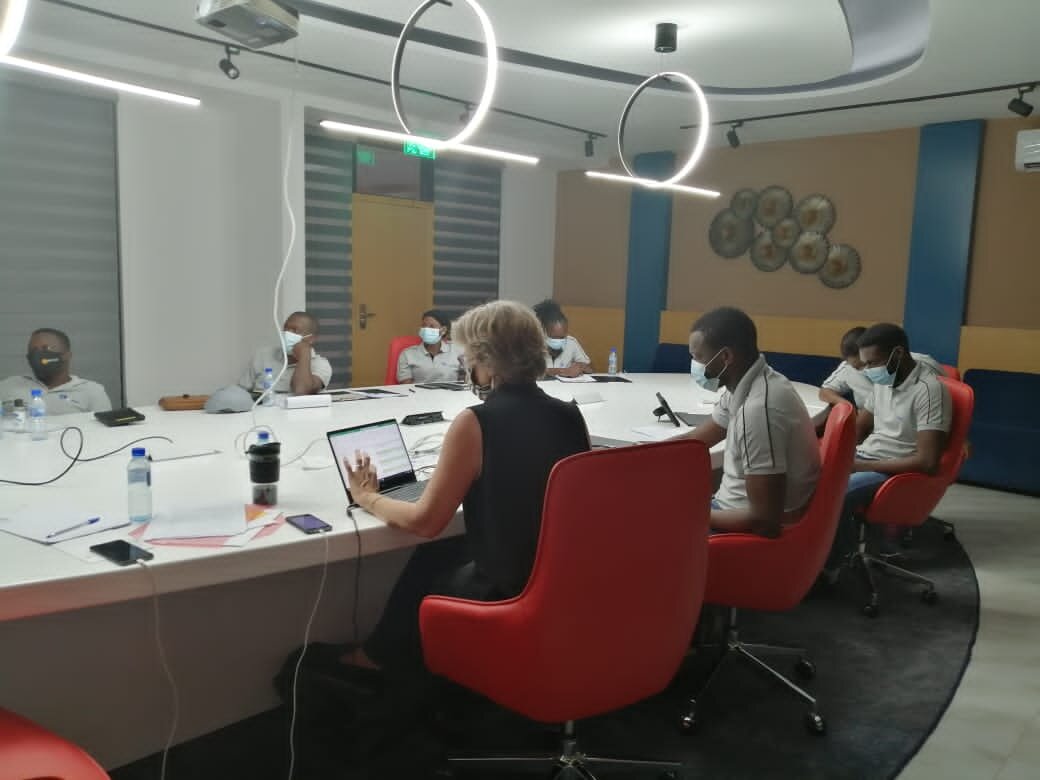
Our socially distanced training for enrollment of pregnant mothers into our PAASIM study is officially underway! For this study we are evaluating if and how improvements in water supply in urban areas of Mozambique reduce or delay enteric pathogen infection, alter gut microbiome composition, and affect enteric dysfunction and other health outcomes in infants.
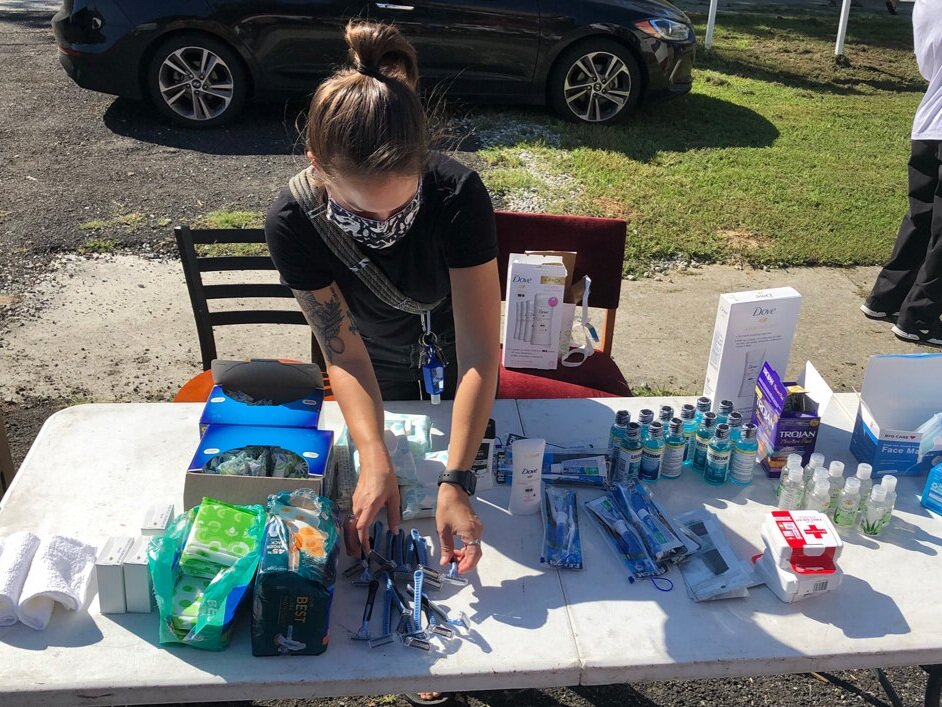
April Ballard (PhD Candidate) and two other Rollins students established The Dignity Pack Project which supplies people experiencing homelessness in Atlanta, Georgia with basic hygiene supplies, period supplies, condoms, and PPE. Read more on April’s work as a community change agent here!
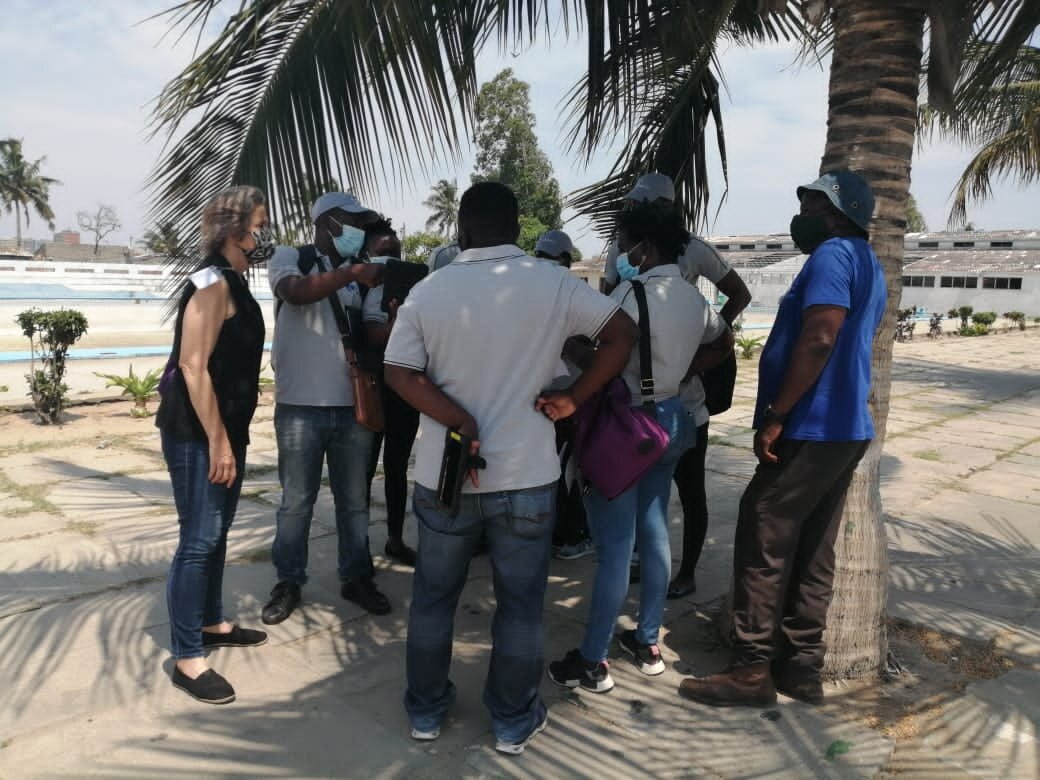
One year later, our partners in Mozambique are at it again! We are working with WeConsult to conduct a rapid assessment survey in 1,700 households throughout Beira, Mozambique as part of the PAASIM project. The survey will help identify the impact COVID-19 has had on participants in our study areas and barriers they may face in preventative measures such as hand hygiene and ability to socially distance.
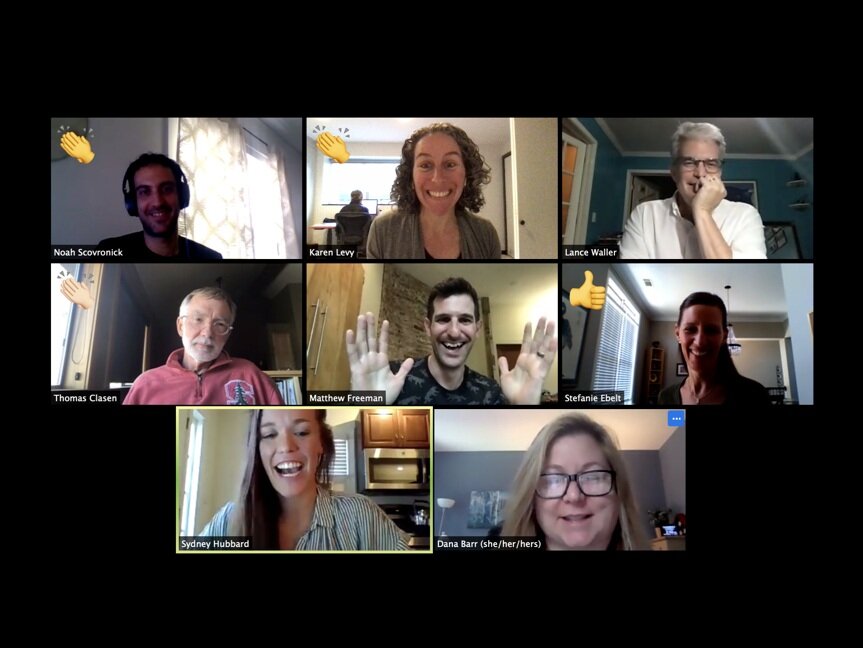
Congratulations to Sydney Hubbard (PhD candidate) on passing her qualifying exams unconditionally (and virtually)!
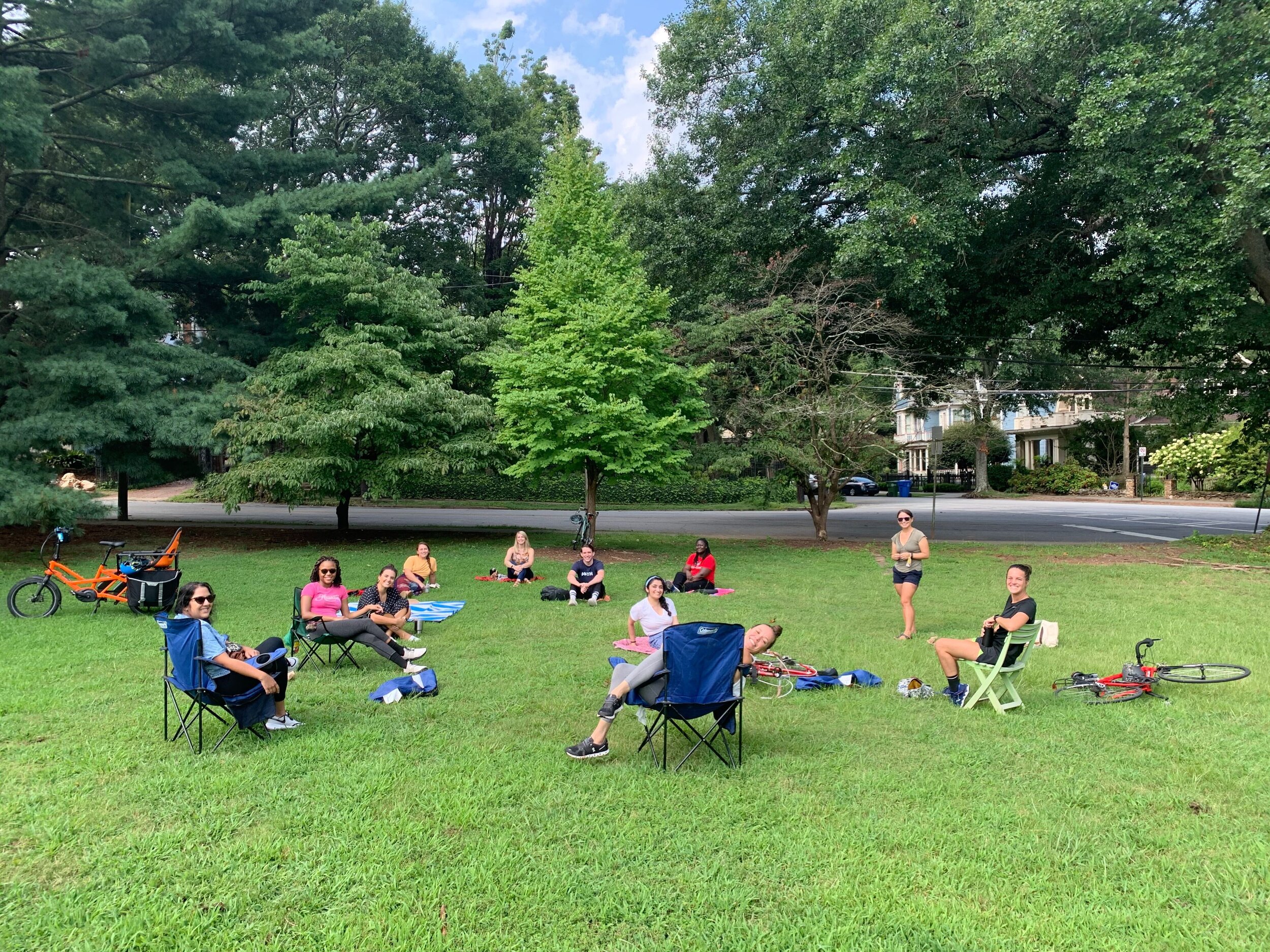
The group is getting ready for the next school year with a socially distant get-together in the park :)
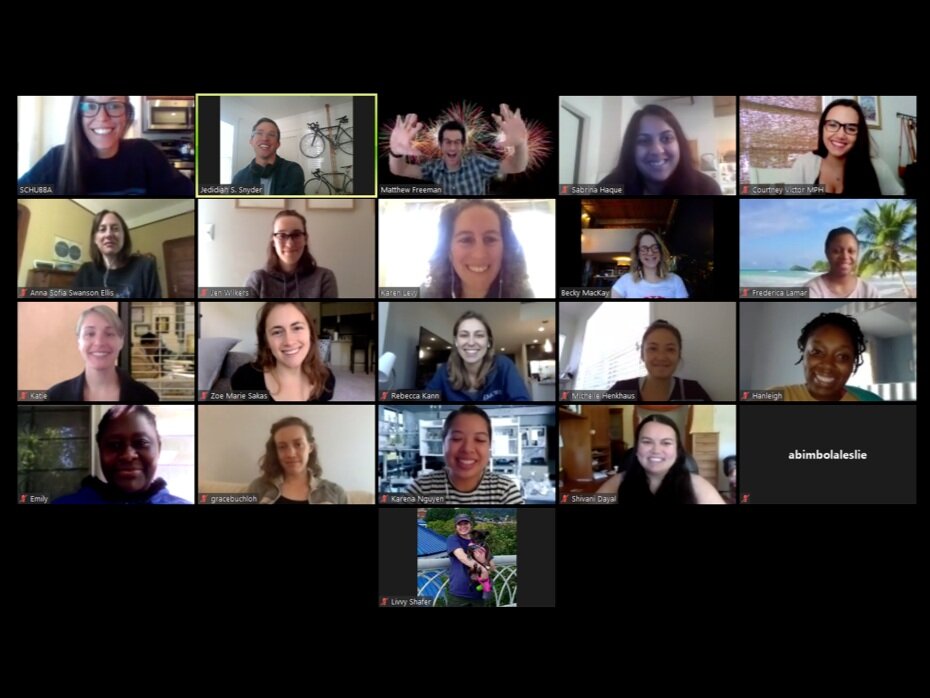
Celebrating the end of the school year in style! A special congratulations and best wishes to the Class of 2020! We and the Gangarosa Department of Environmental Health are all so incredibly proud of you.
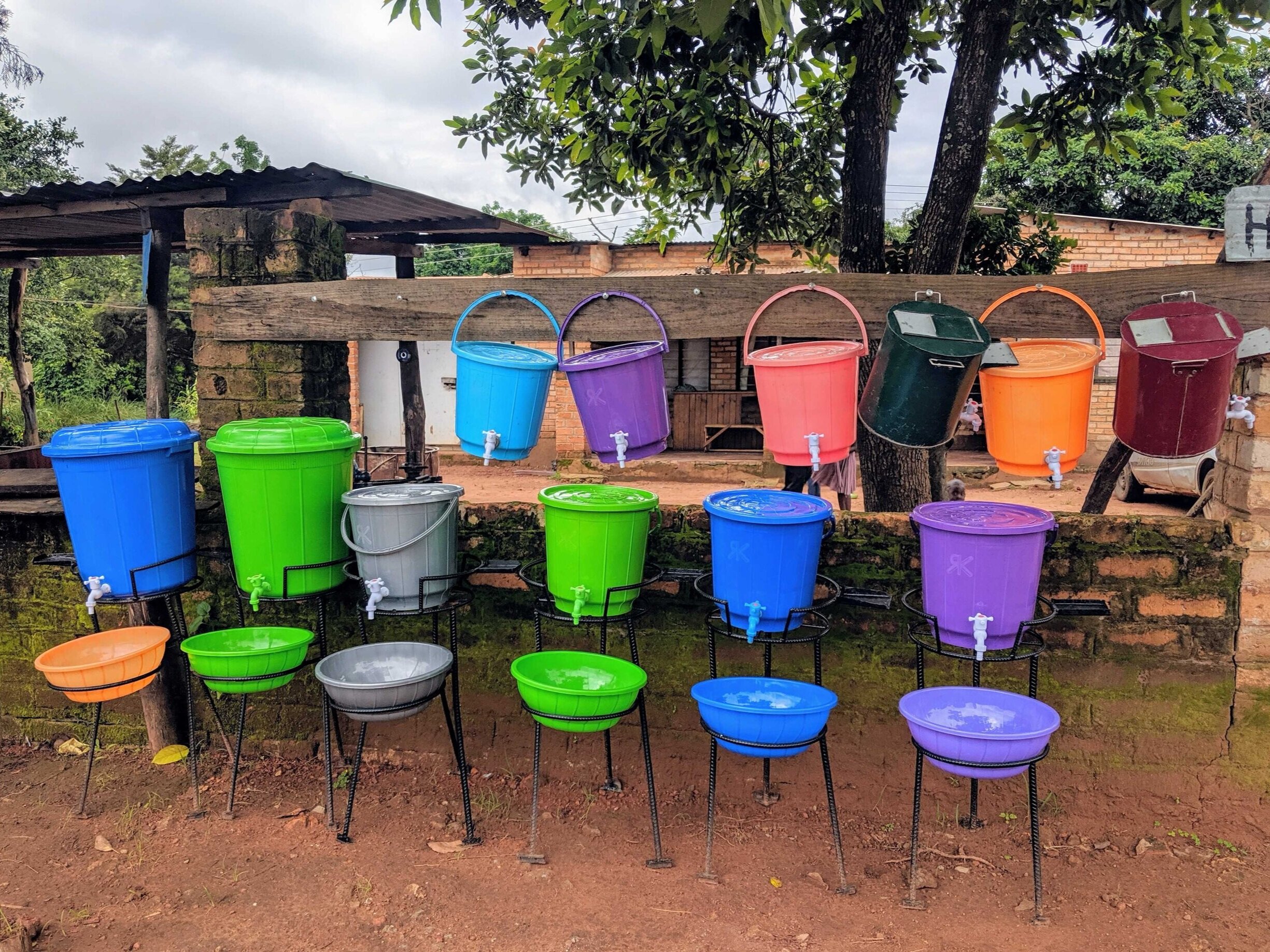
What color would you pick??? Zoe Sakas stopped by a mason’s workshop in Kasama, Zambia to check out handwashing stations for sale.
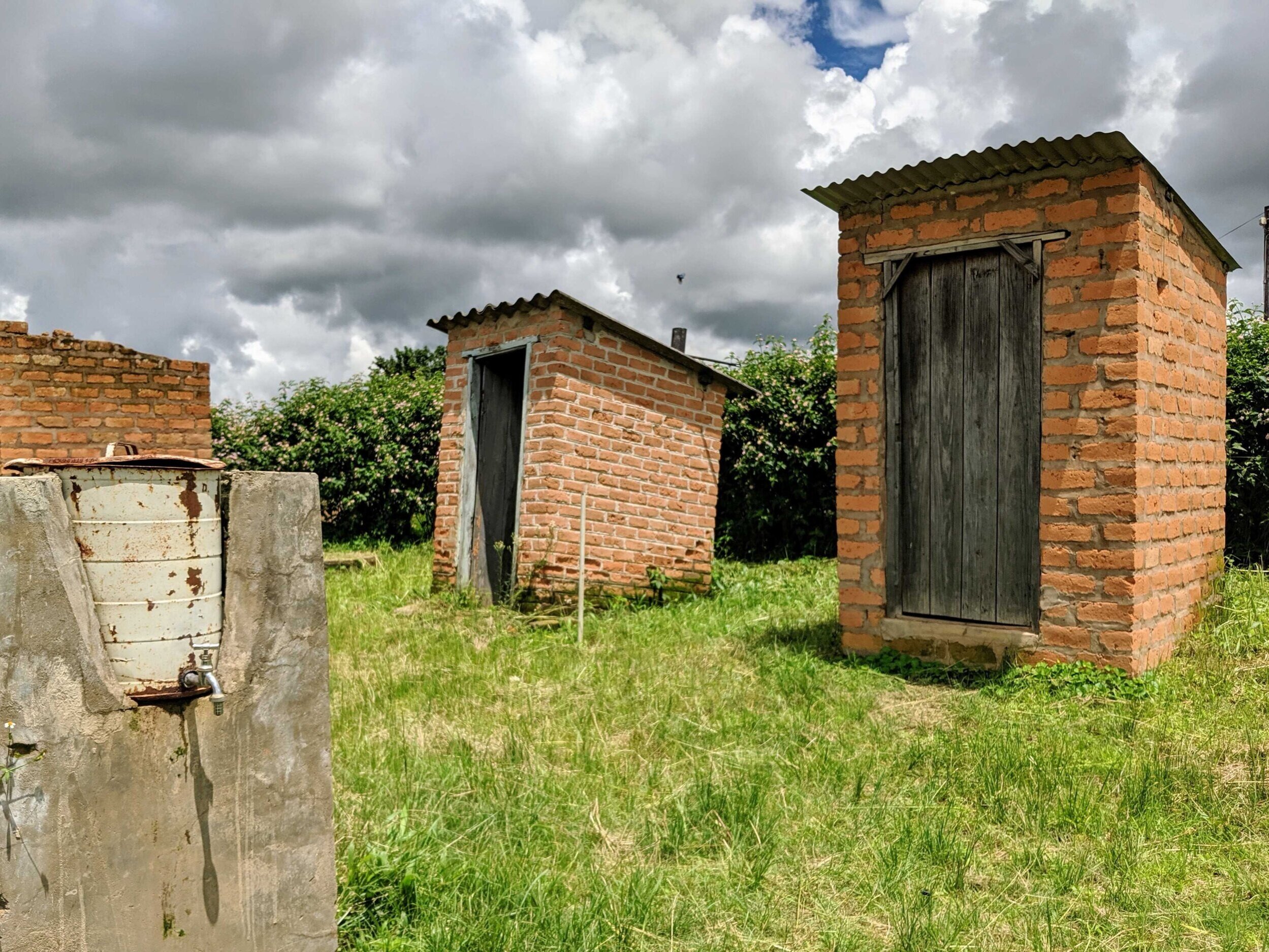
Zoe Sakas snapped a great picture of latrines and a handwashing station while conducting field work in Zambia.
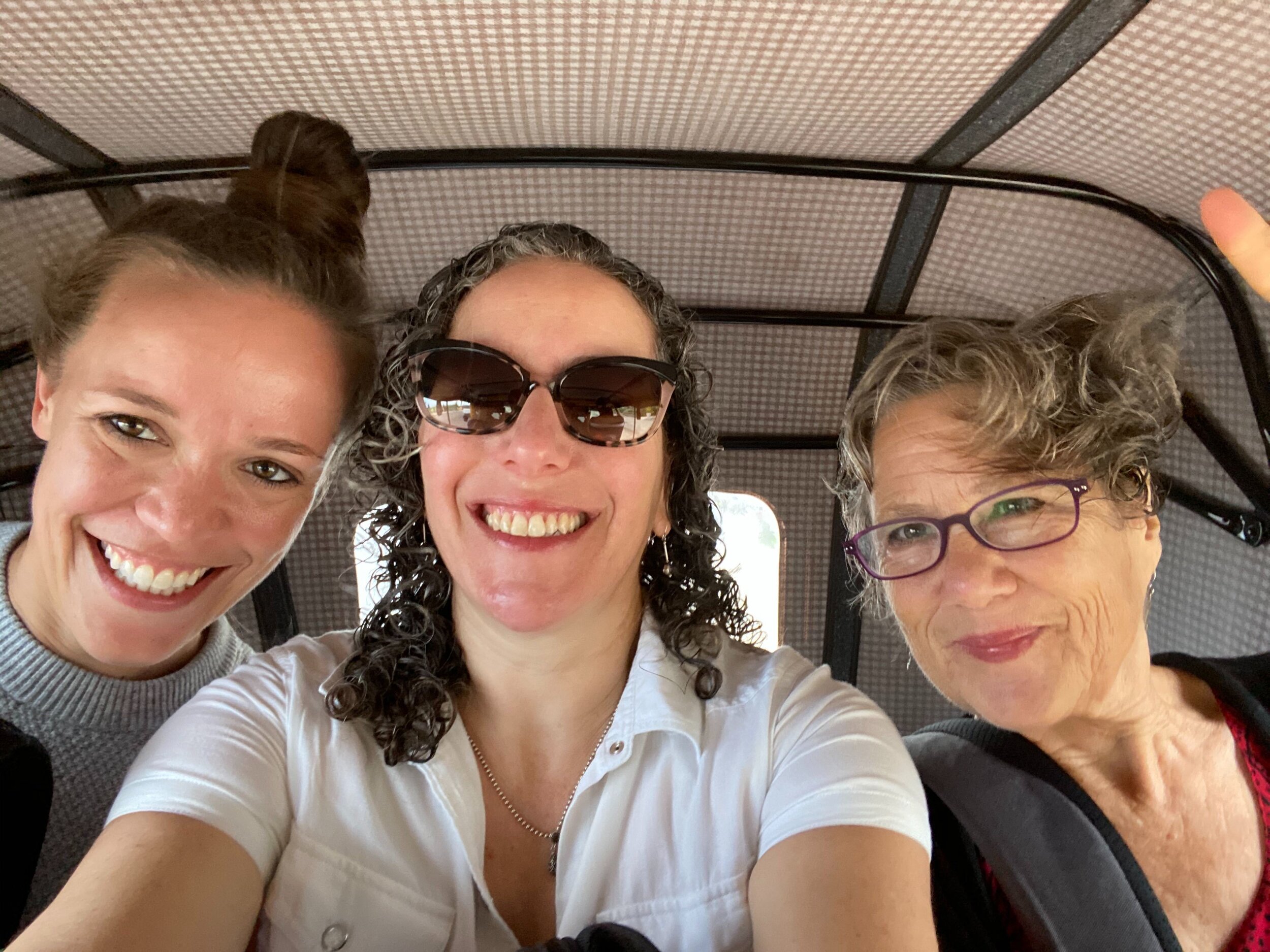
How many scientists can fit into a Chapa… Karen and Matt join PhD Student, Sydney Hubbard and Study Manager, Sandy Mcgunegill in Mozambique in preparation of baseline data collection for PAASIM.
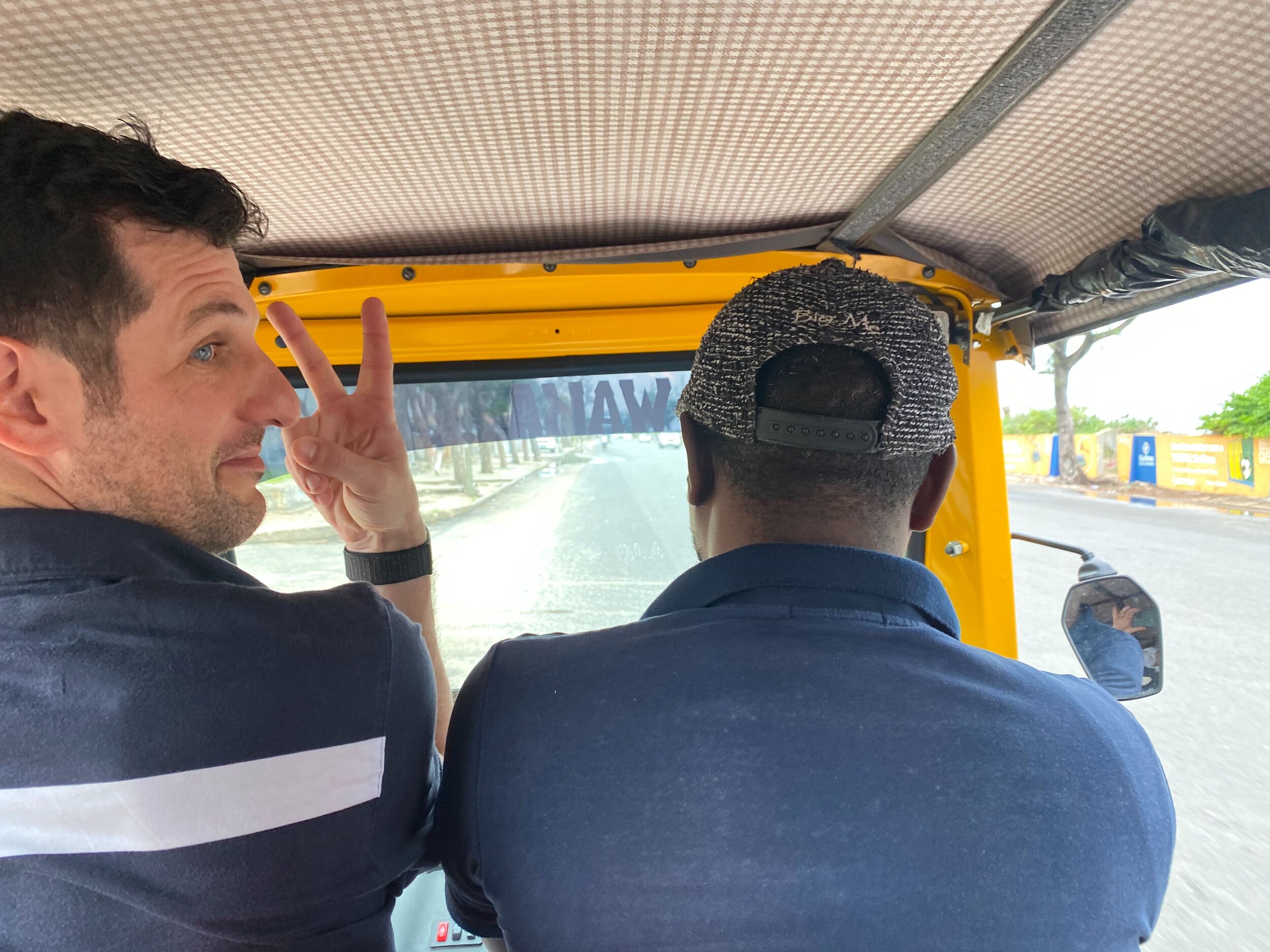
How many scientists can fit into a Chapa… Karen and Matt join PhD Student, Sydney Hubbard and Study Manager, Sandy Mcgunegill in Mozambique in preparation of baseline data collection for PAASIM.
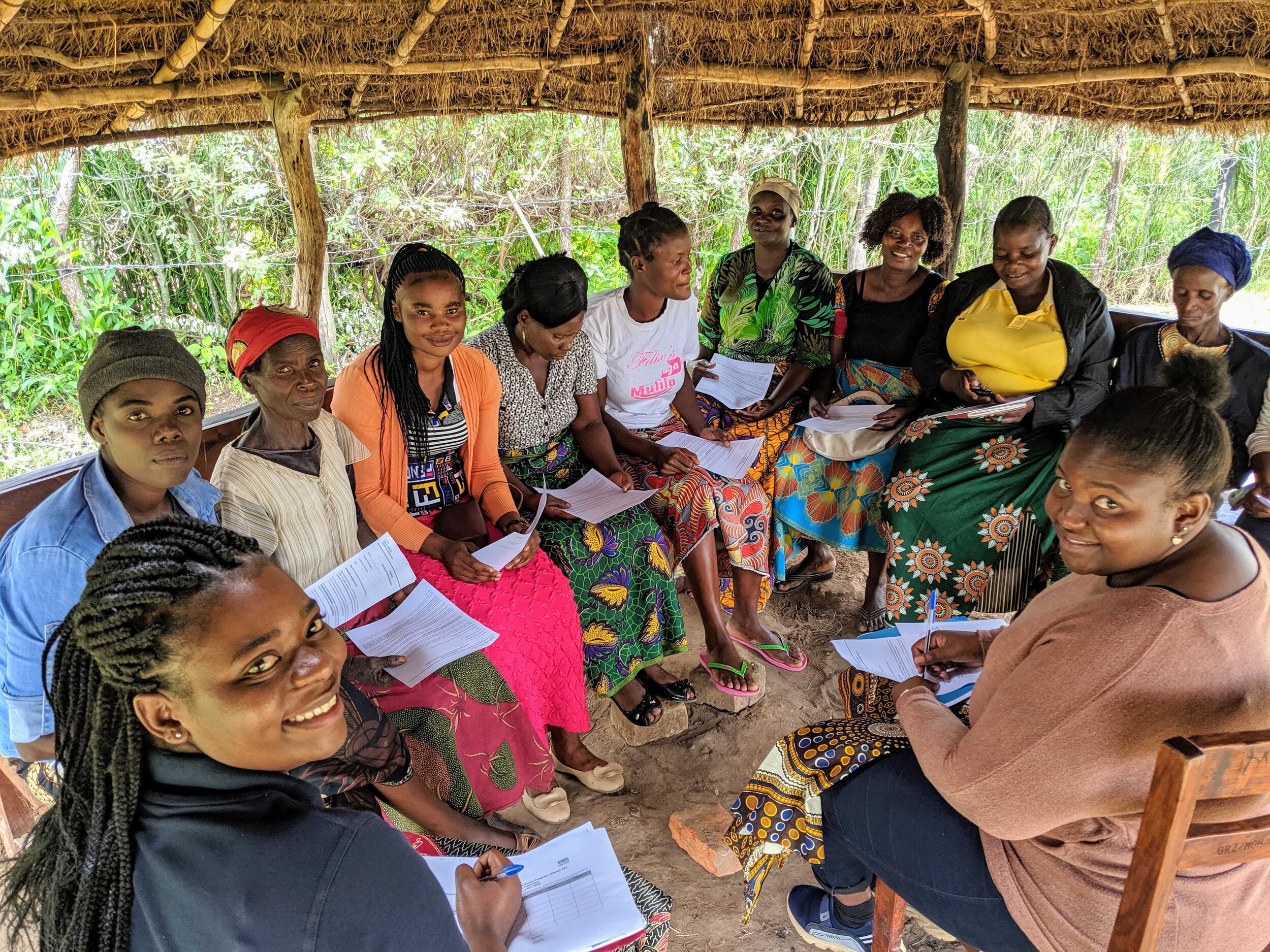
Health clinic workers in Mporokoso, Northern Zambia lead a focus group discussion on rural sanitation service delivery programs.
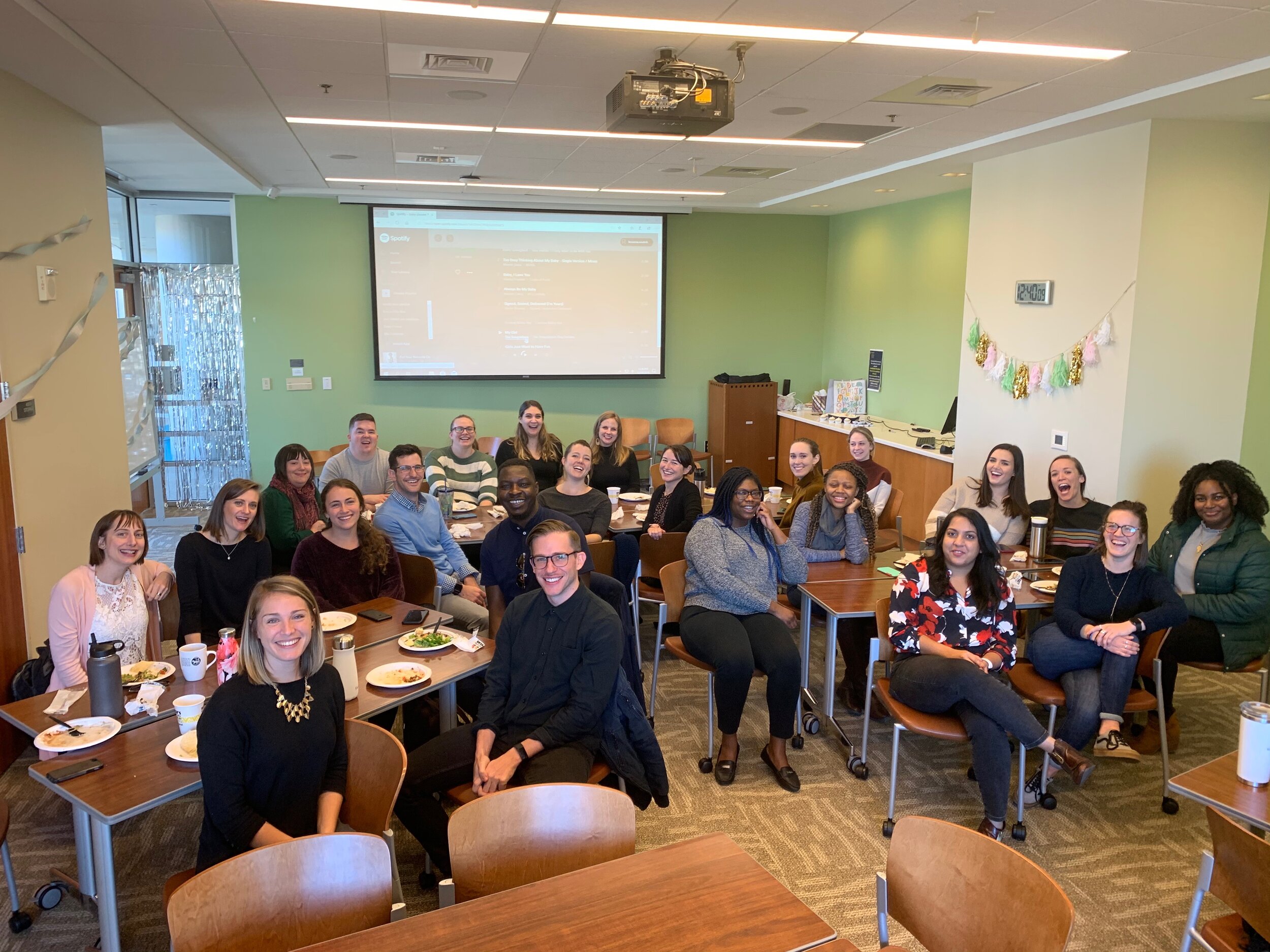
Happy Holidays! So much to celebrate this year - here’s to another great year in 2020.
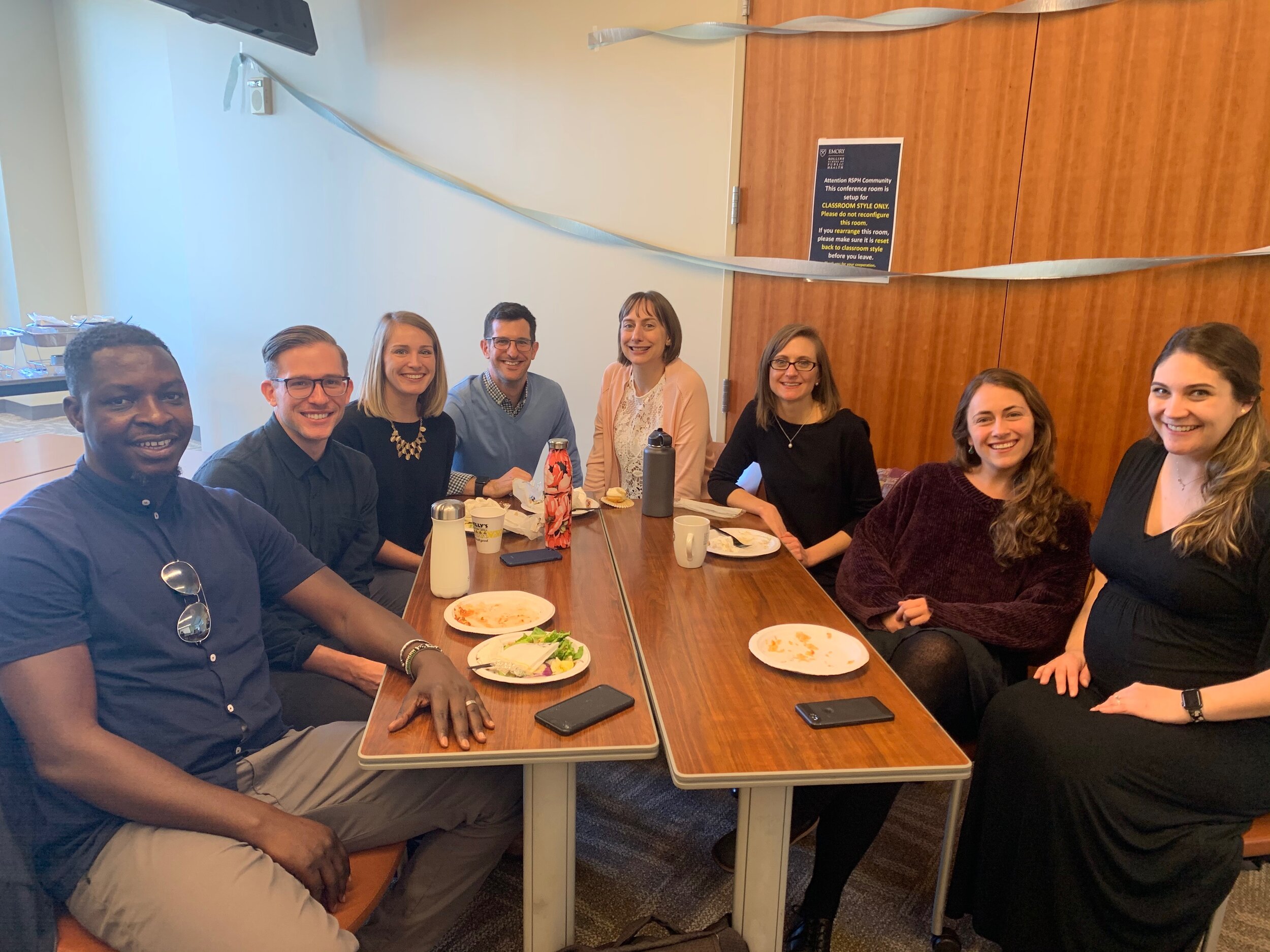
Happy Holidays! So much to celebrate this year - here’s to another great year in 2020.
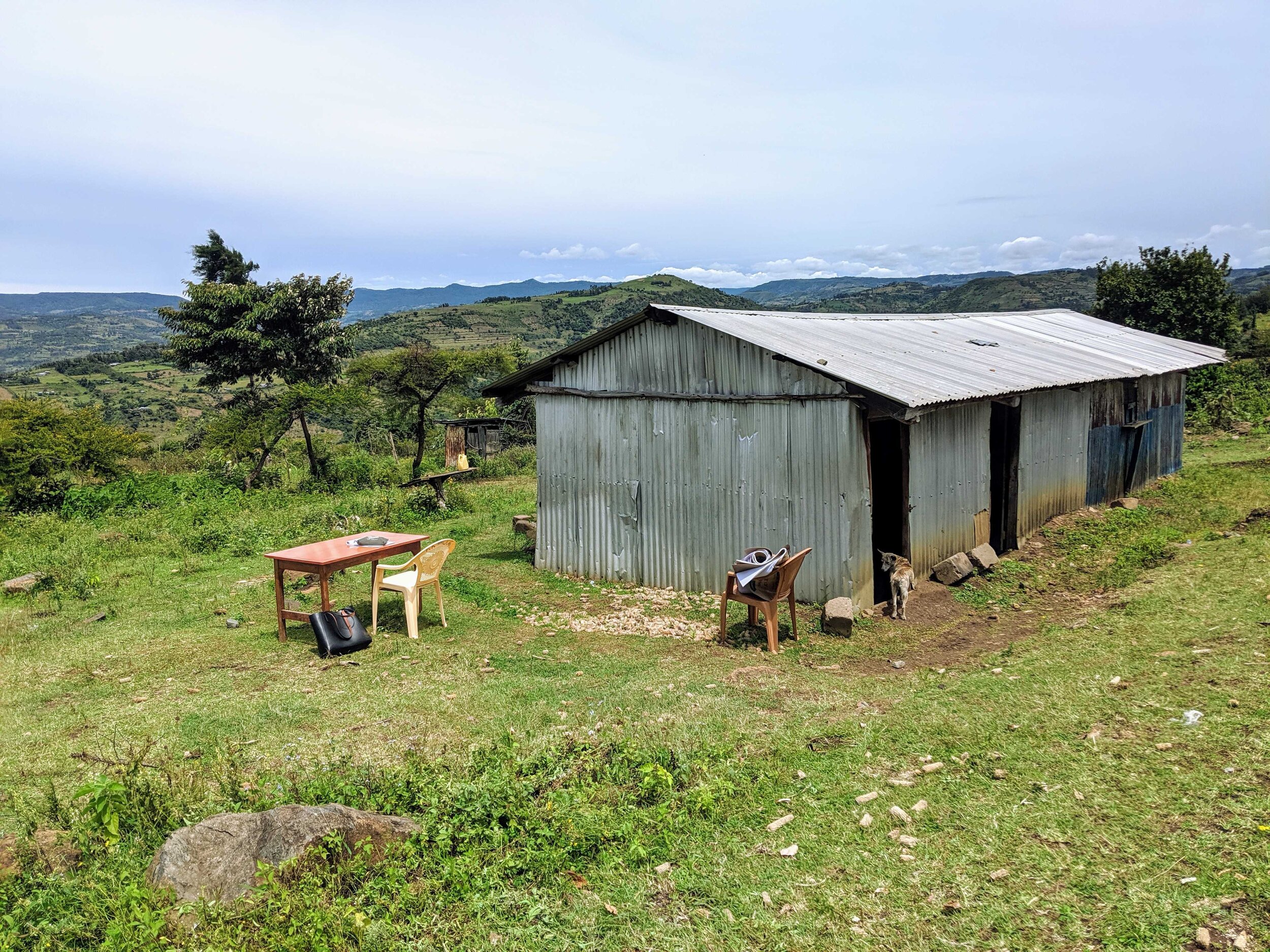
Check out Zoe Sakas’ office today! She is currently in Kenya conducting a qualitative study with SNV assessing rural sanitation delivery programs.
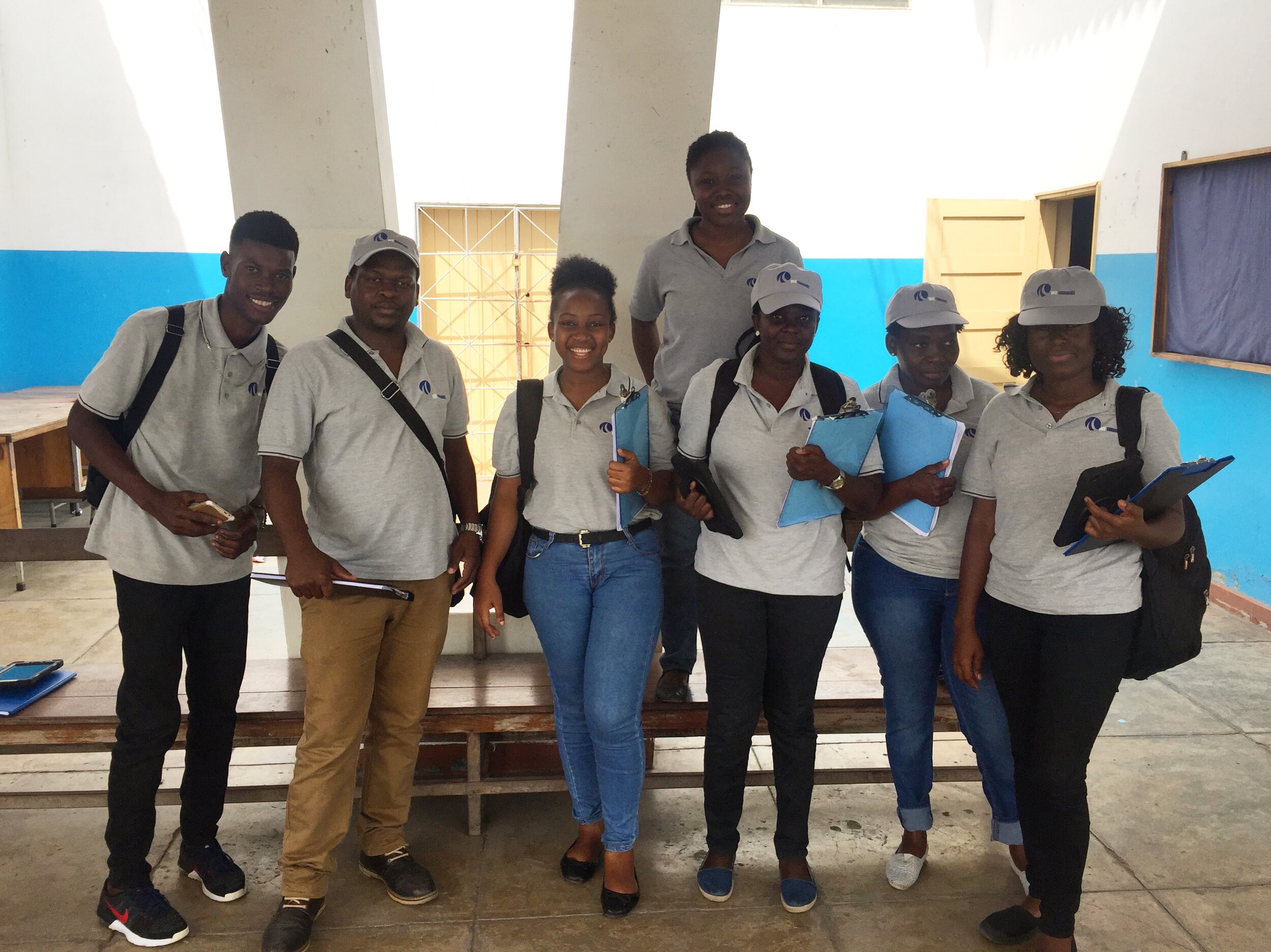
We are working with WeConsult to conduct a rapid assessment survey in 1,500 households throughout Beira, Mozambique as part of the PAASIM project. The survey will help us begin enrolling participants into the study which looks to test if and how improvements in water supply reduce or delay enteric pathogen infection, alter gut microbiome composition, and affect enteric dysfunction and other health outcomes in infants.
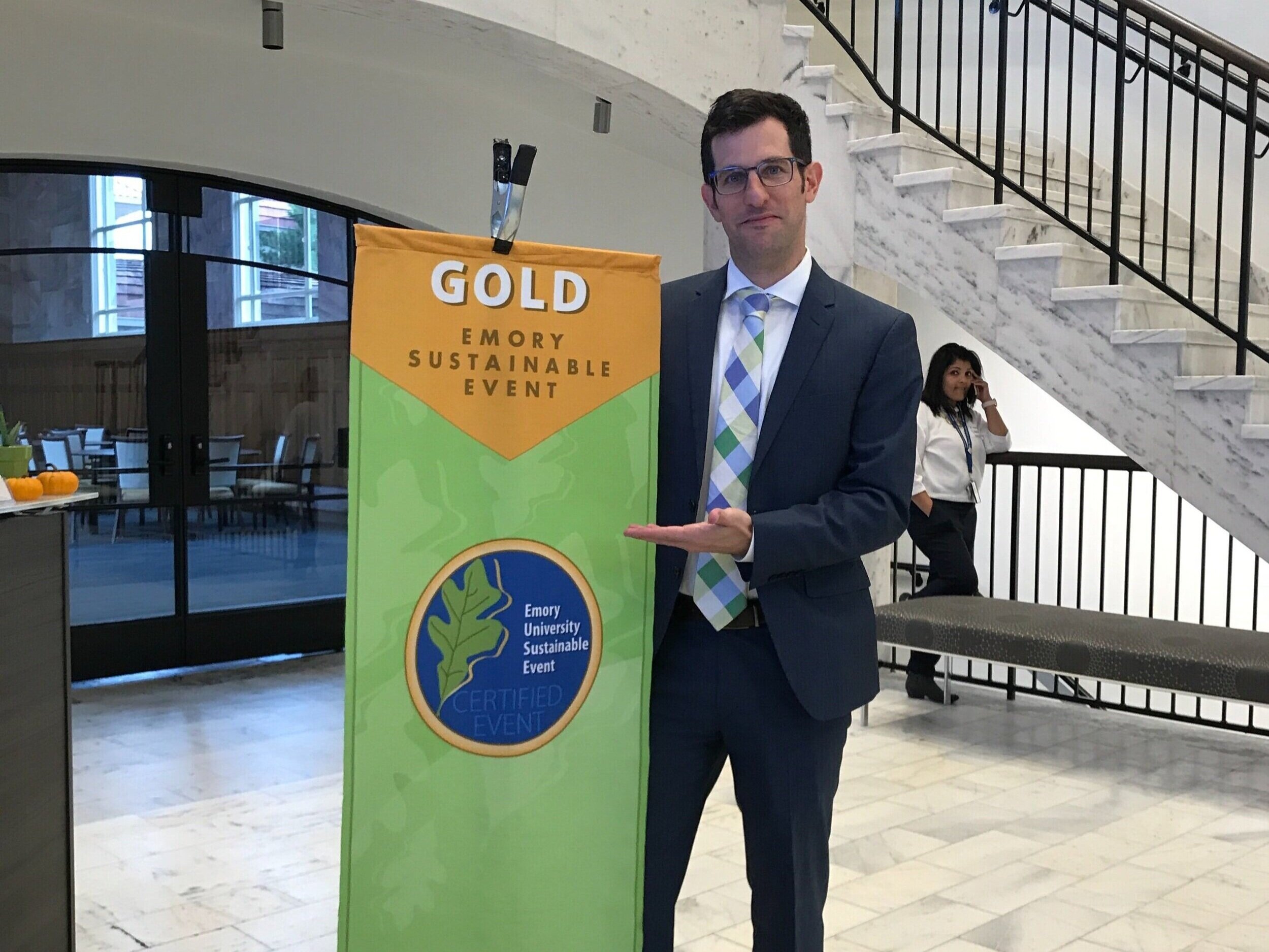
To us, sustainability extends beyond water, sanitation, and hygiene delivery. Proud to share that our Network for Evaluation and Implementation Sciences at Emory event is a certified gold sustainable event!

Matt opens the two-day Implementation Science Conference and Workshop that was hosted by the Network for Evaluation and Implementation Sciences at Emory.
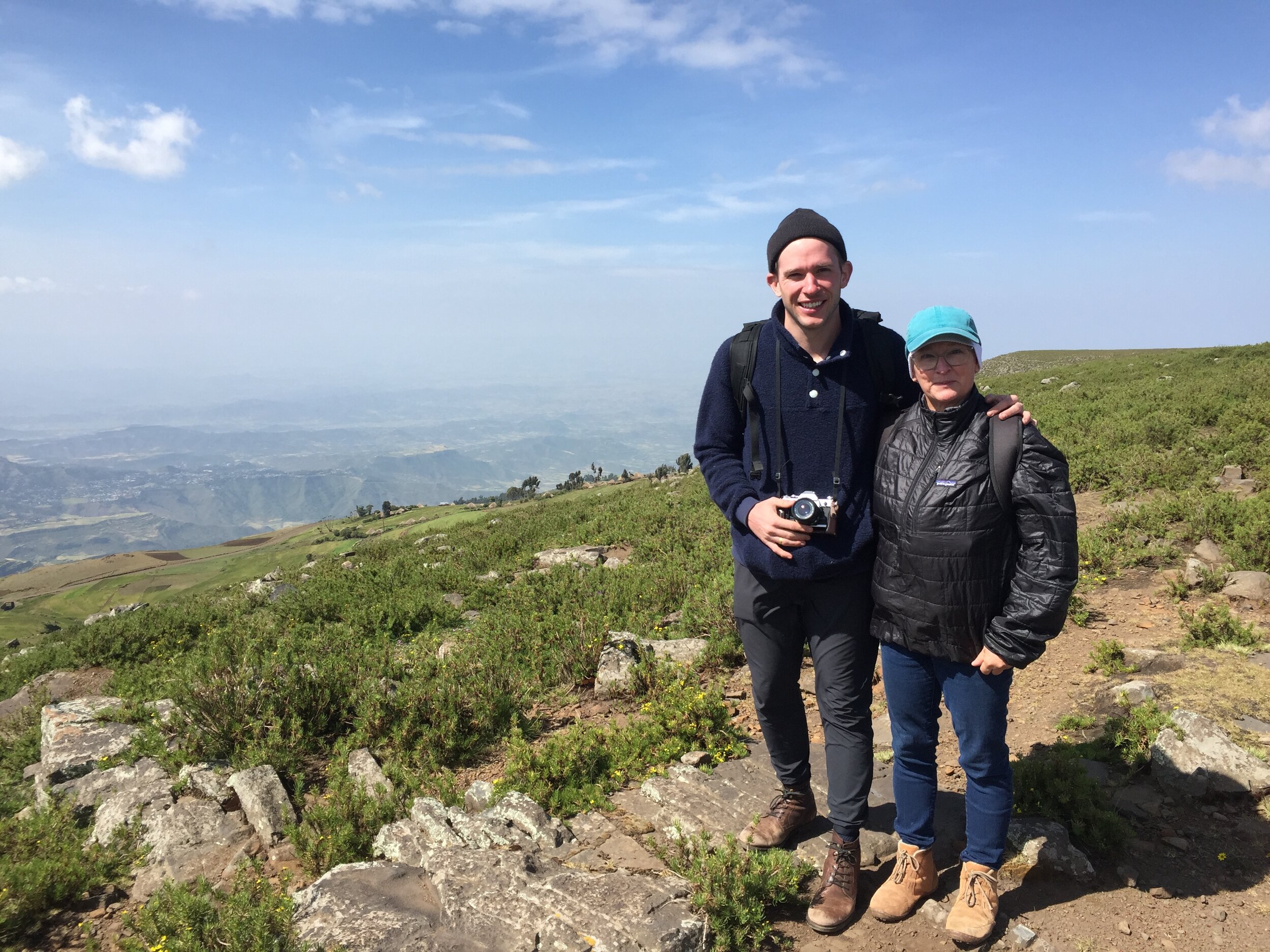
Jed Snyder brings his mom to the workplace! The two took some time away from work to hike the mountains just outside of Lalibela, Ethiopia.

13 years of SWASH+ comes to a close. Alex Mwaki, Kelly Alexander, Charles Boera, Jed Snyder, and Mitchell Oguna meet with Kenya stakeholders to celebrate how the lasting partnership has helped improve the quality of life and learning environment for school children across Kenya. See our summary of the project’s success here.

Anna Ellis observes a vaccination day during a site visit to Nepal as part of our Vaccine Exempars project. The project seeks to identify and understand “exemplar” immunization programs at a national and subnational level which performed better than their peers in driving improvements in high and sustainable vaccine coverage.
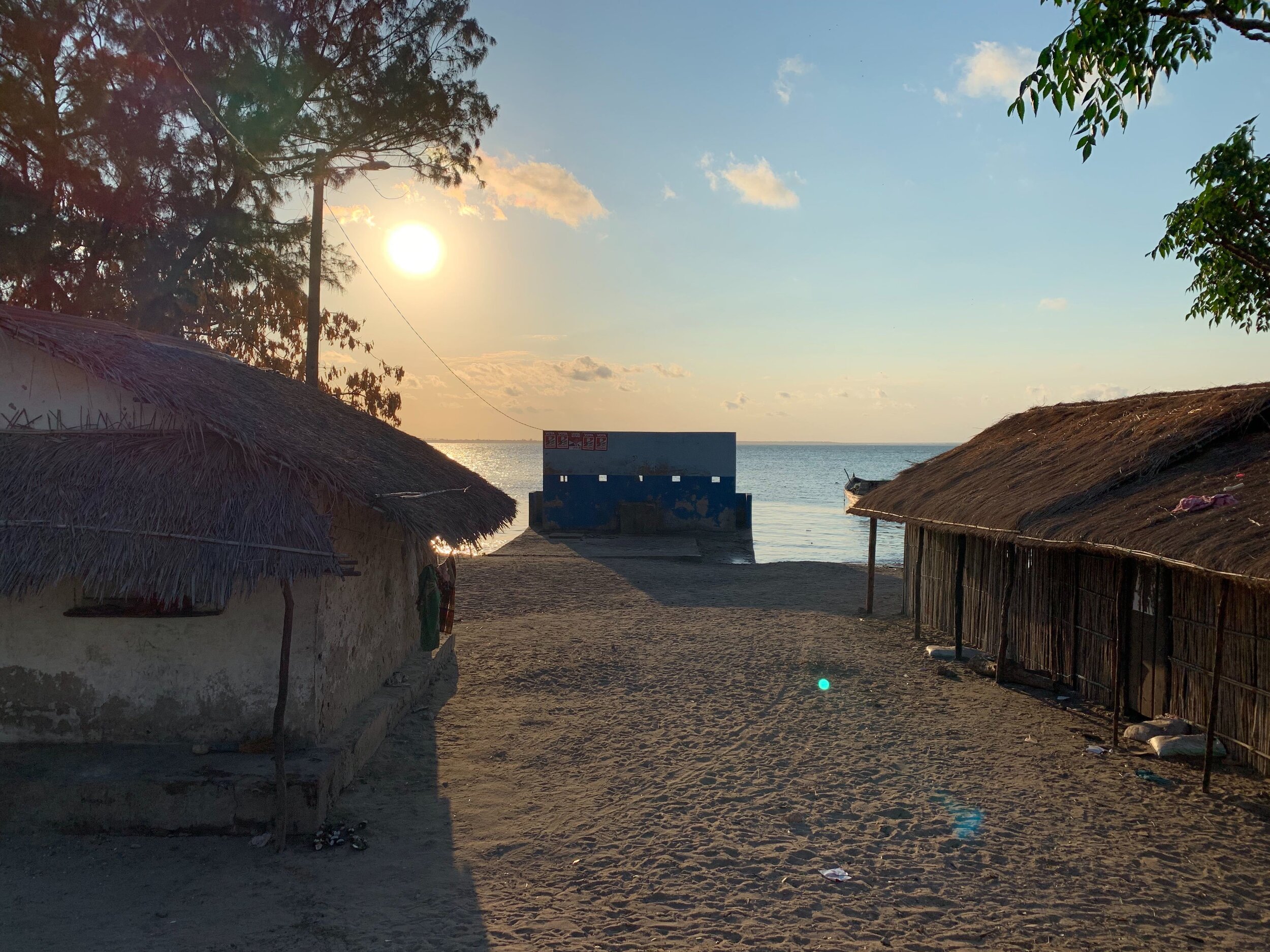
Matt is currently in Mozambique meeting with project partners on the PAASIM study. Check out the sweet views from this toilet block!
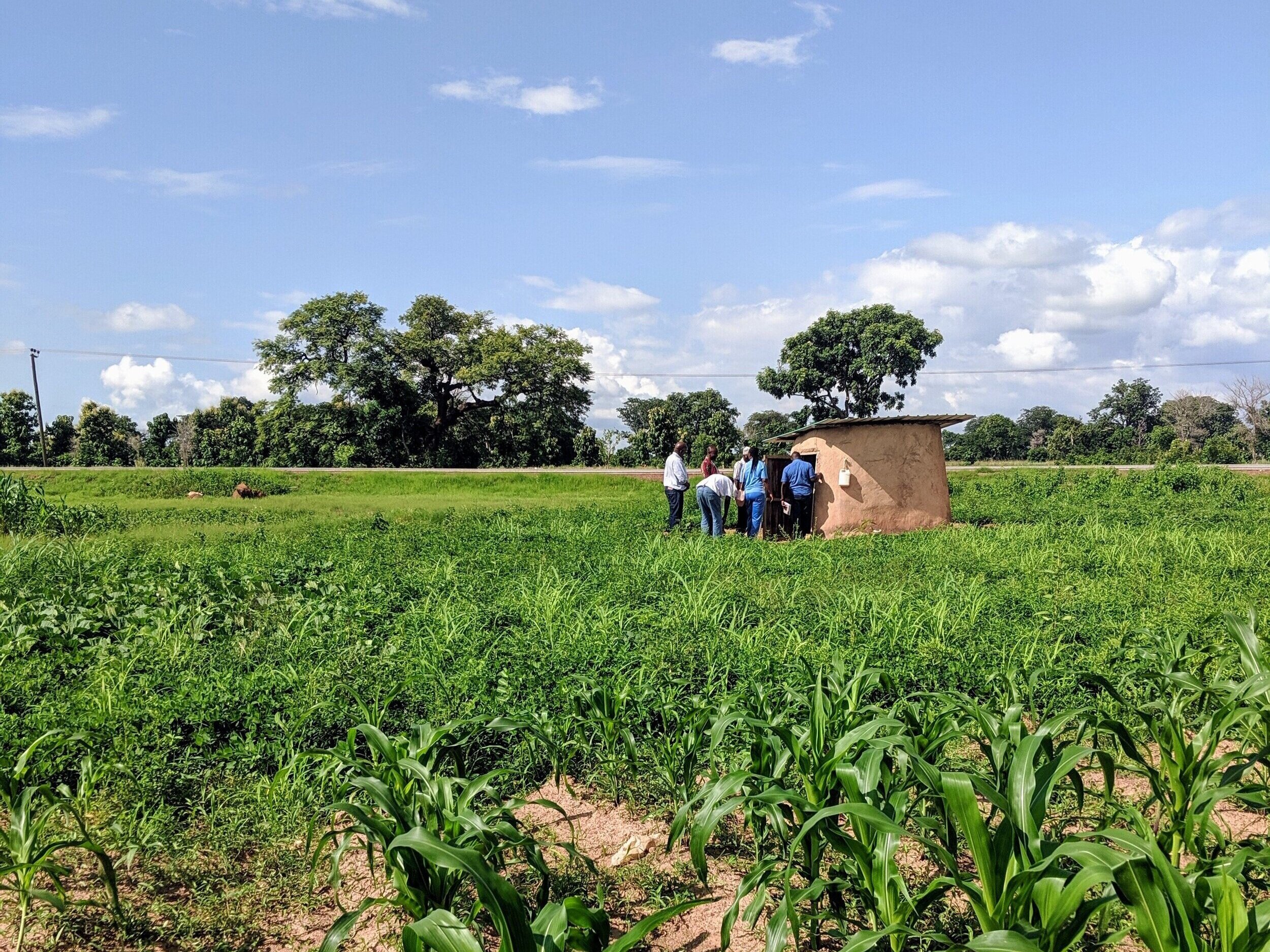
Zoe Sakas traveled to Ghana as part of our project in conjunction with SNV. The project is looking to conduct qualitative research to assess rural sanitation delivery programs. Here, she joins the SNV team admiring a latrine in a field.
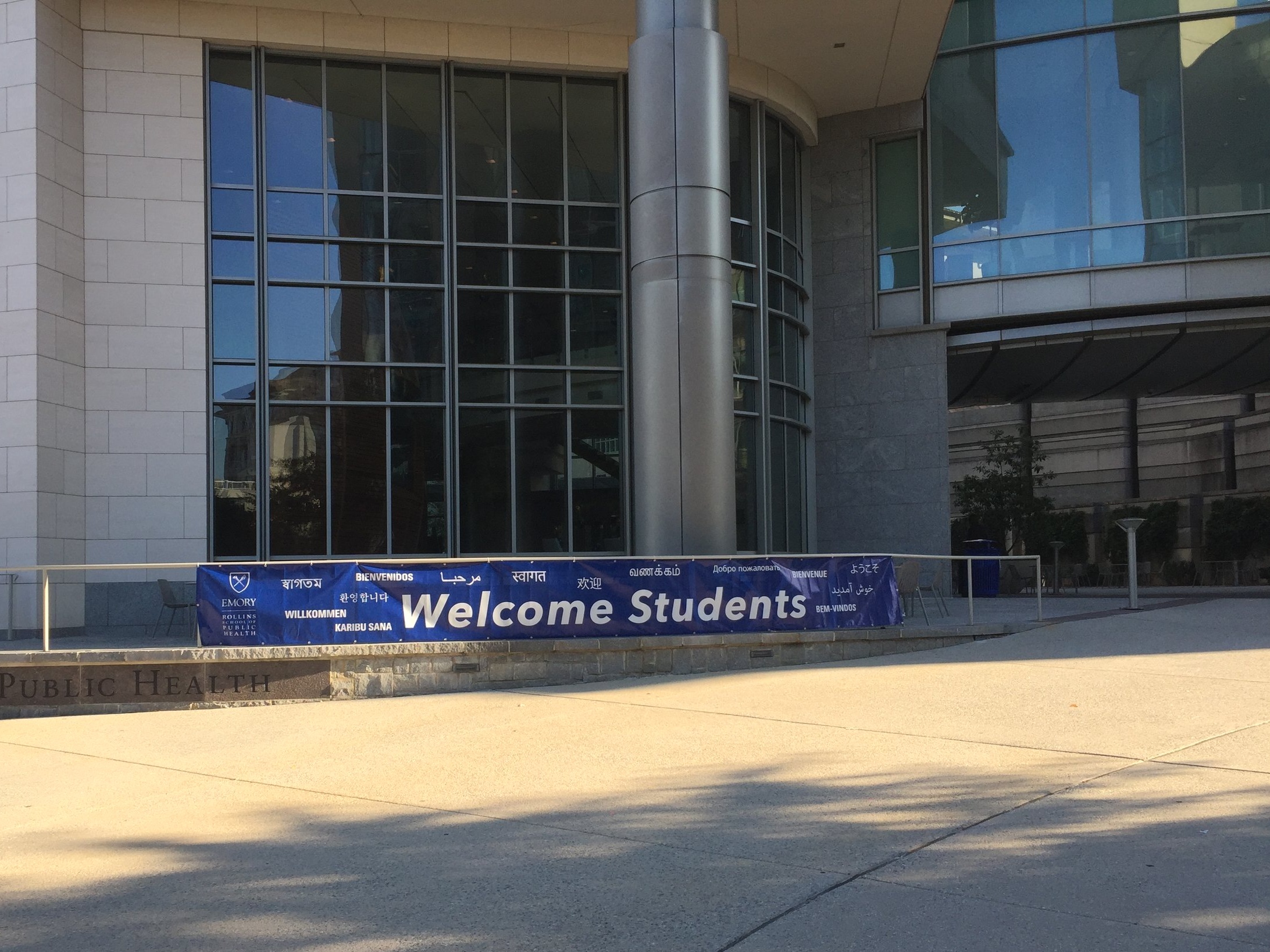
Welcome students! Hope you had a great first day of the 2019-2020 school year.
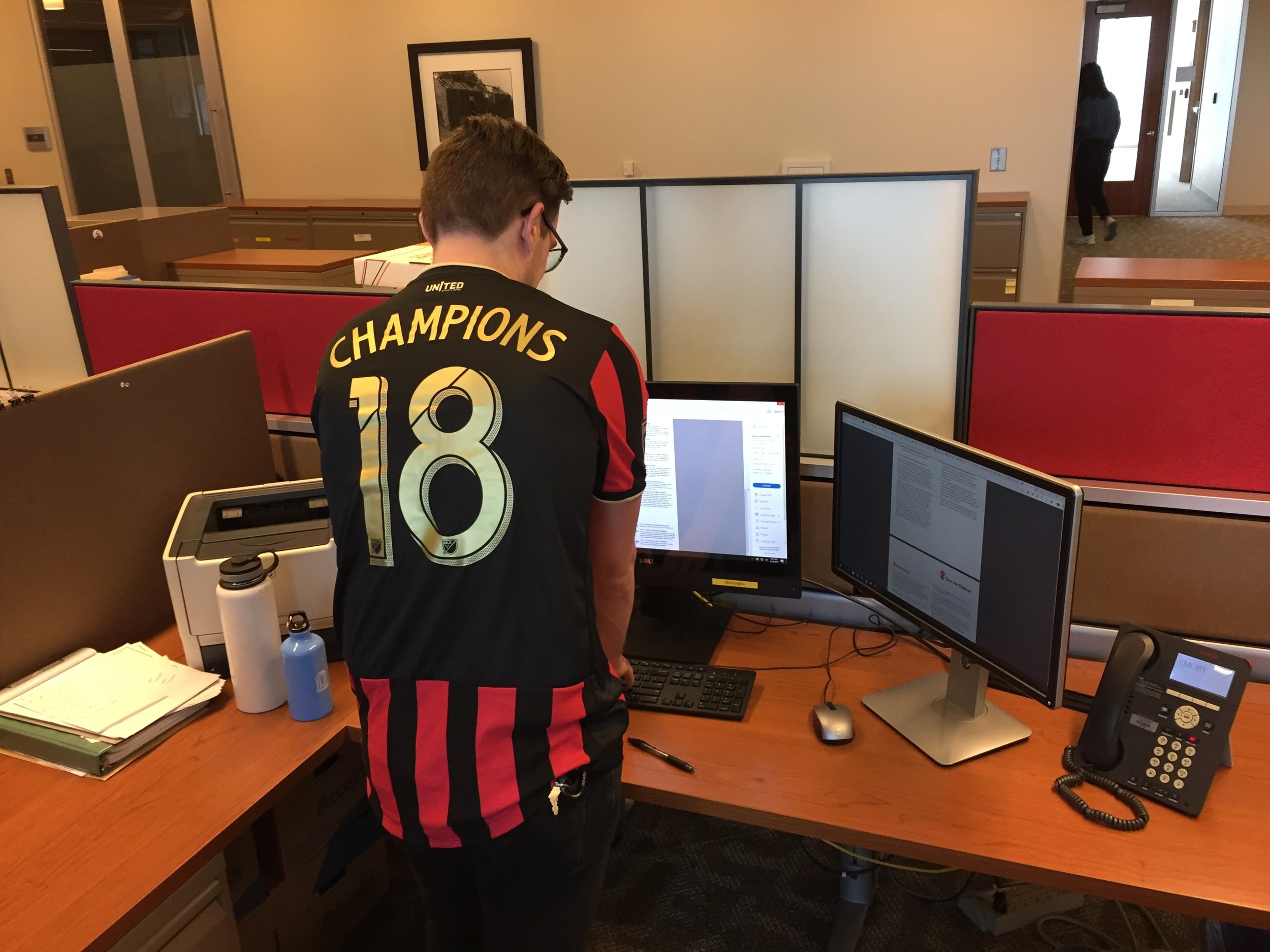
Make sure to science like a champion today! Also, go Atlanta United!
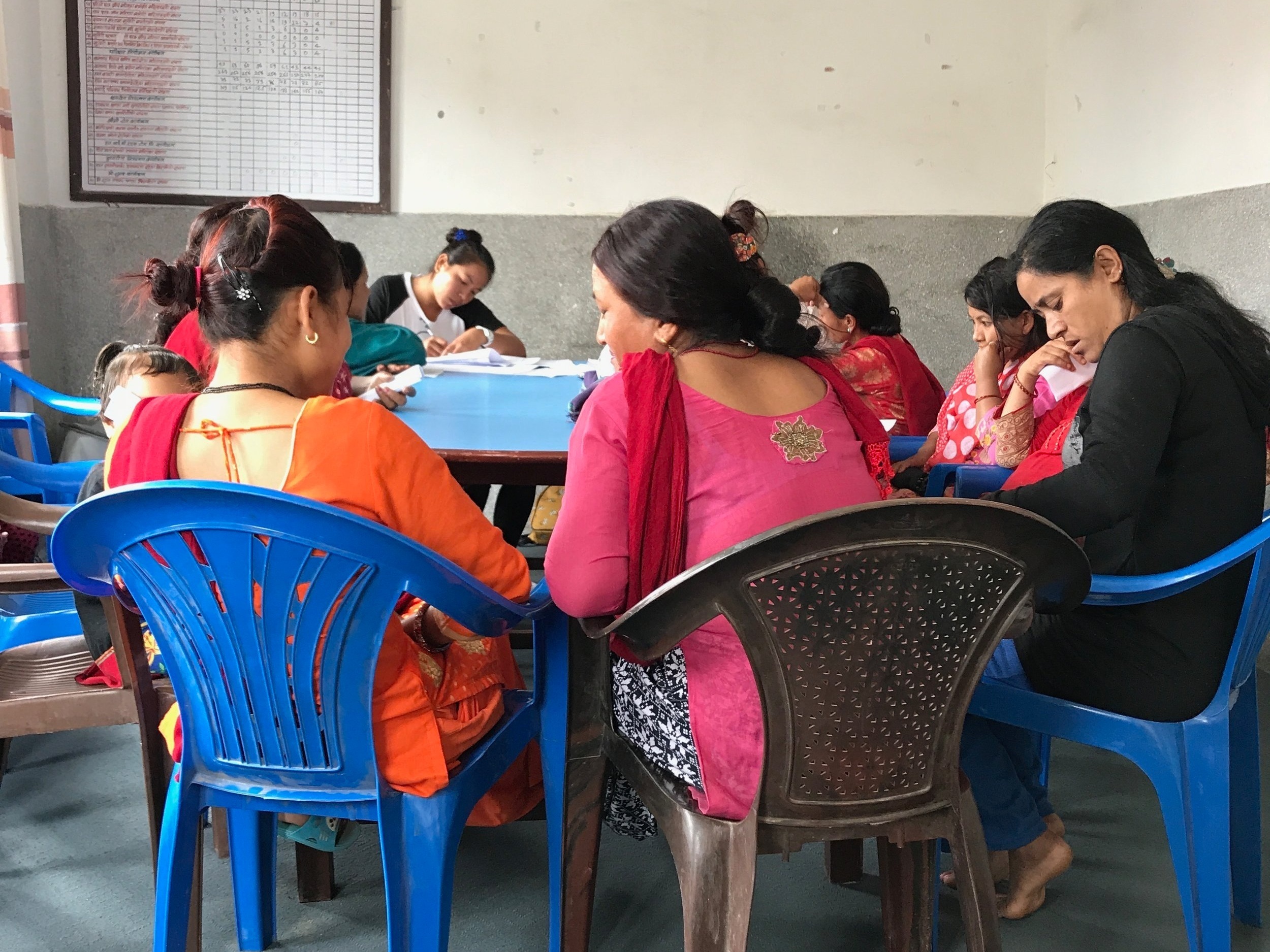
As part of the Vaccine Exemplars project, we are conducting focus group discussions with mothers in Nepal.
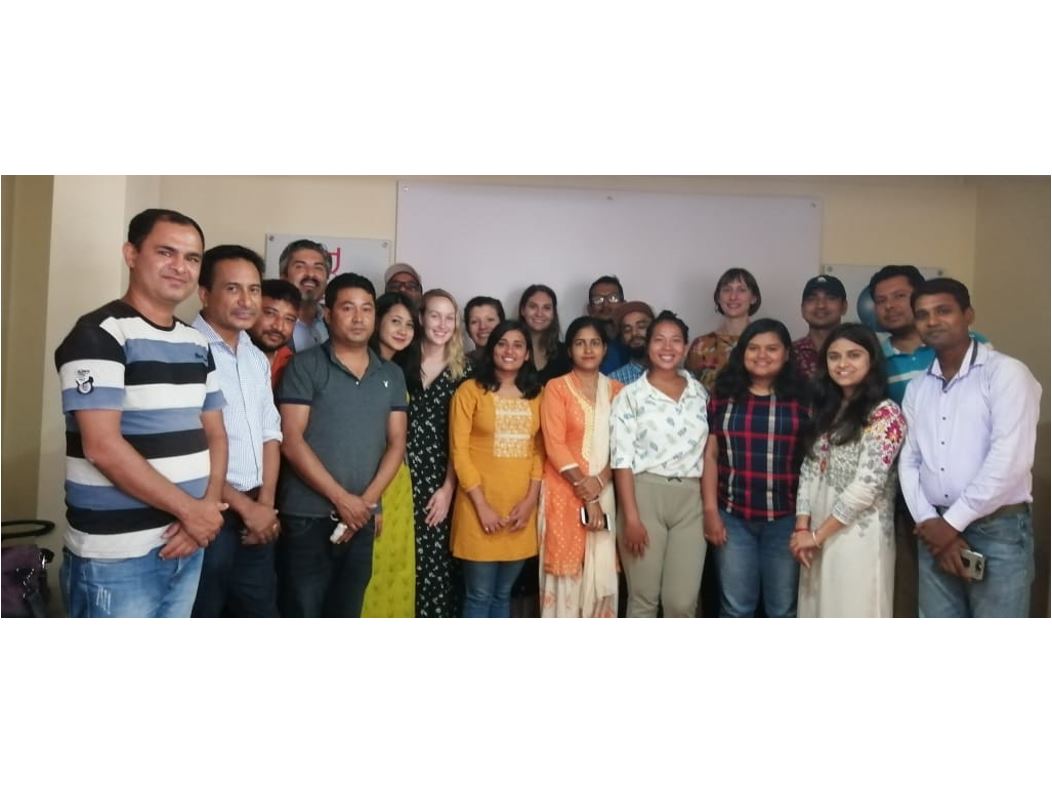
Training of the Vaccine Exemplars research team in Nepal is complete! Here, project manager Anna Ellis, study coordinator Kyra Hester, and MPH student Allison Wray celebrate the end of the training with a group photo.
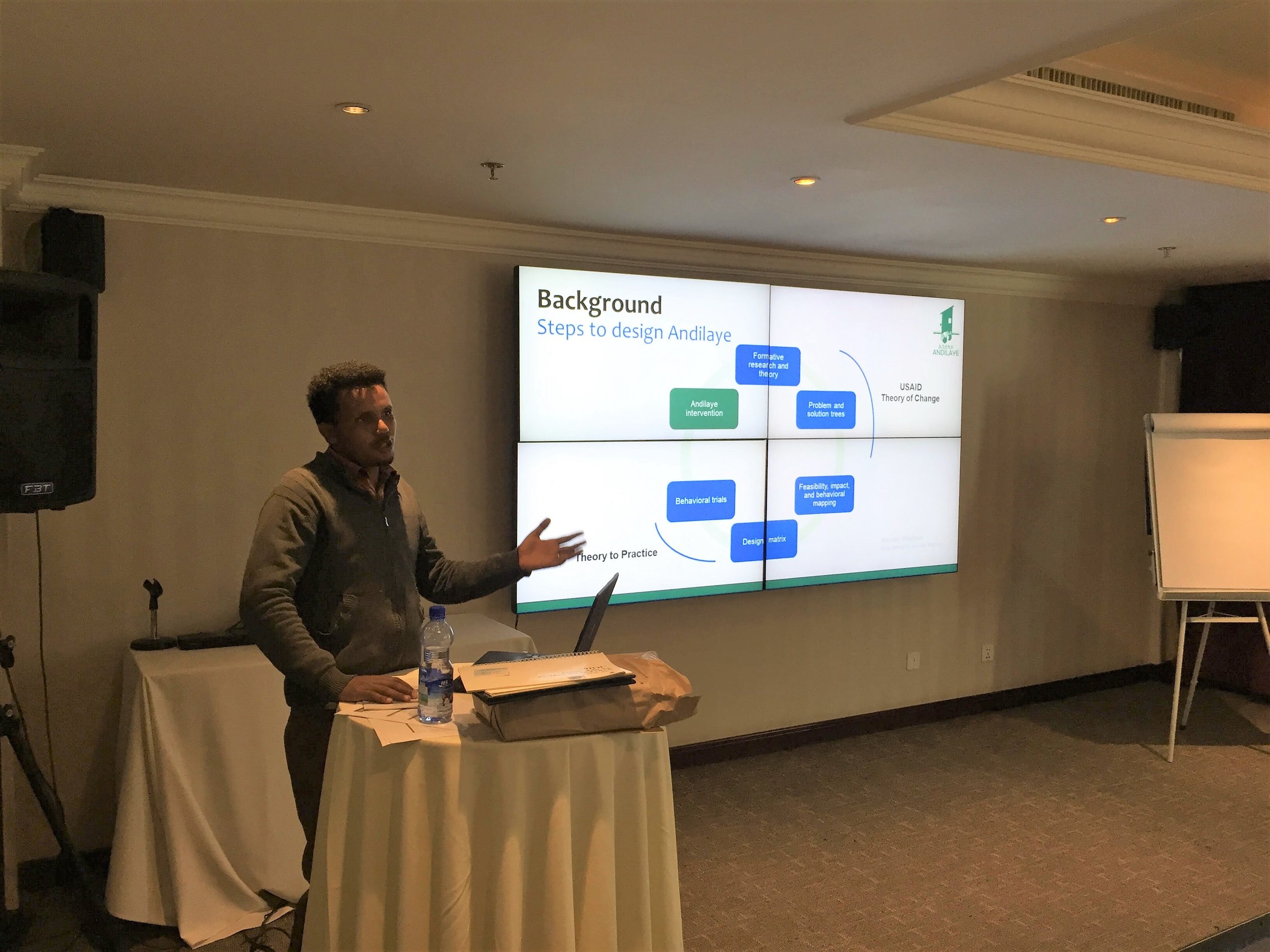
Here, Kassahun Zewudie of the Andilaye project shares our endline findings with regional and national-level NTD focal points during a meeting in Addis Ababa.
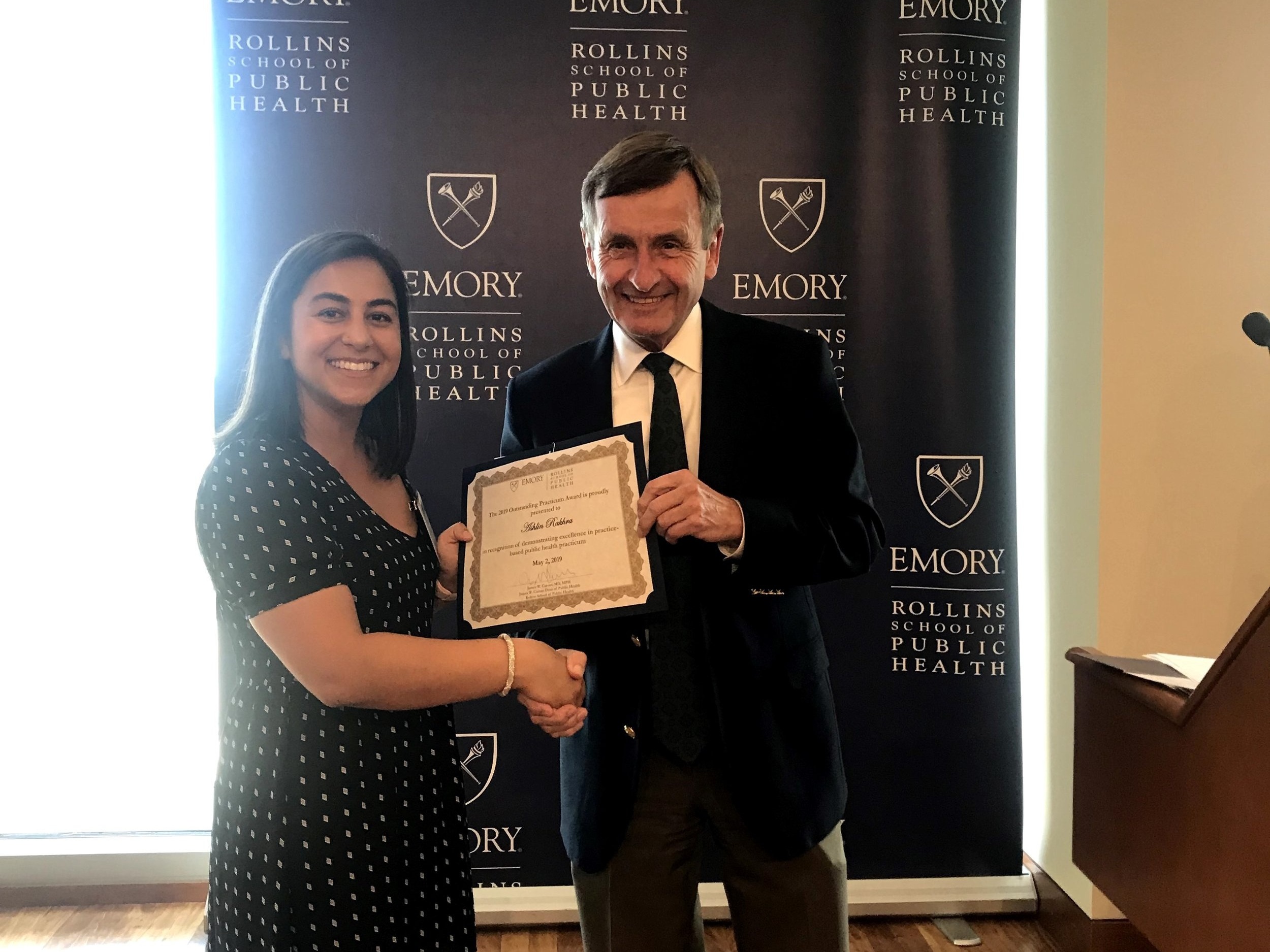
Congratulations to Ashlin Rakhra (MPH ‘19) for being awarded the Outstanding Practicum Award! Here, is Ashlin accepting the award from James W. Curran, Dean of Public Health at the Rollins School of Public Health.

Congratulations to Ashlin Rakhra (MPH ‘19) for being selected as a finalist for the 2019 Outstanding Practicum Award at Emory University! During her practicum, she led a process evaluation of Andilaye programming for a demand-side sanitation and hygiene promotion on sustained behavior change and health in Amhara, Ethiopia.
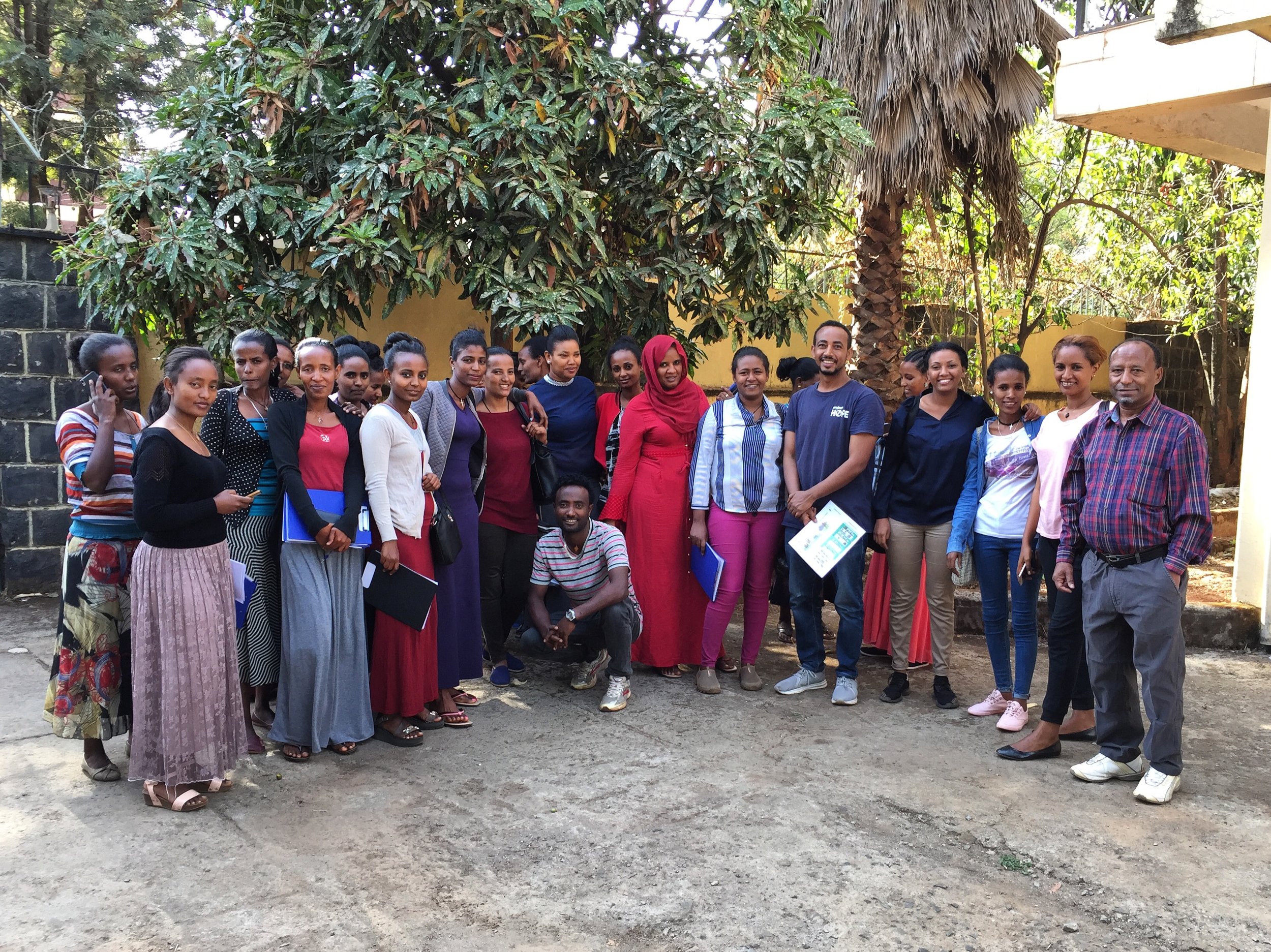
Andilaye endline data collection has begun! This dream team of enumerators, field supervisors, and Andilaye staff (Melkamu and Mulat) will be visiting over 1,500 study households within the next 40 days to conduct surveys on WASH behaviors and mental well-being - as part of the Andilaye Impact Evaluation.
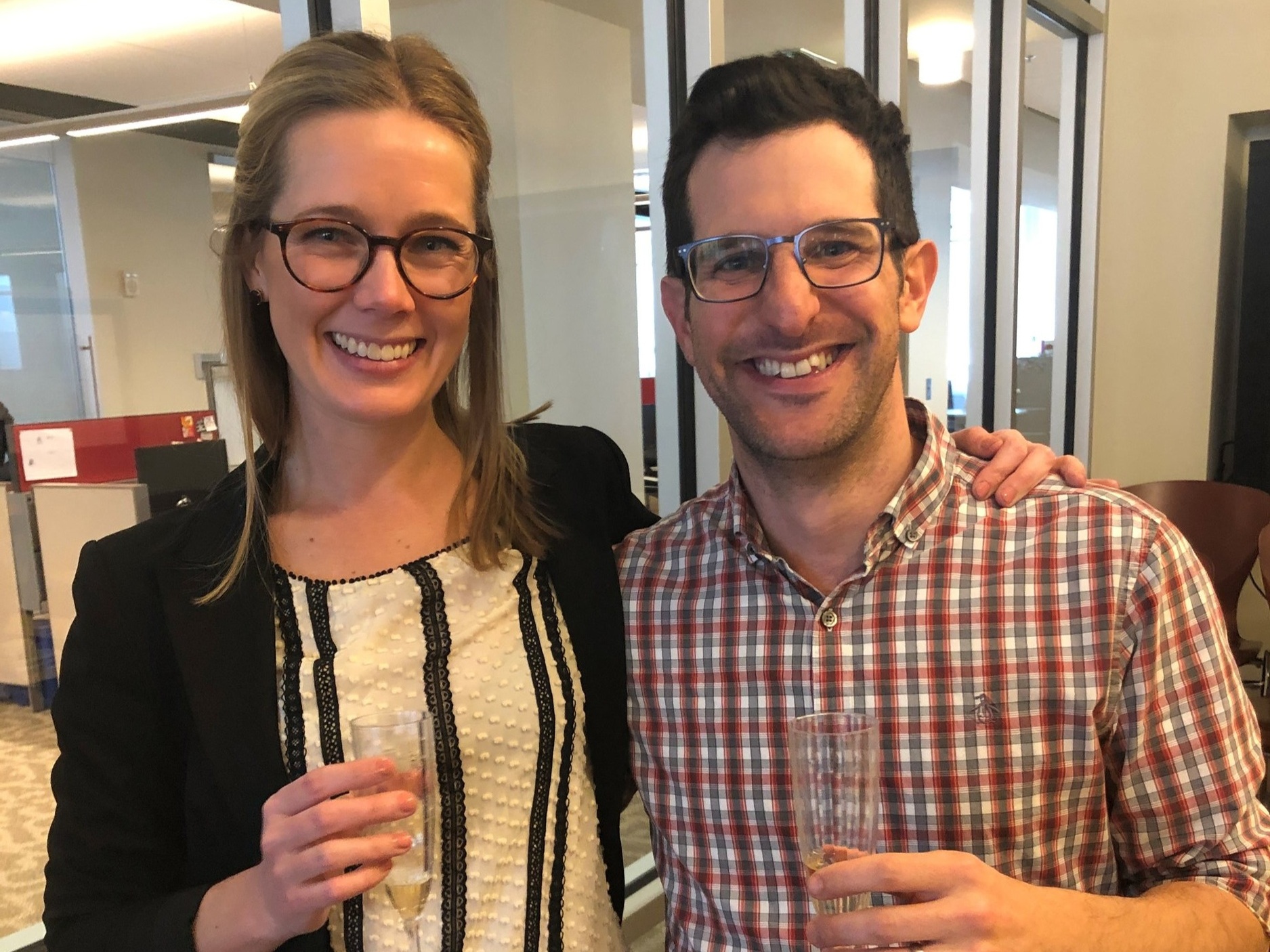
Congrats Dr. Chard! Next stop, an Epidemic Intelligence Service fellowship at the CDC!
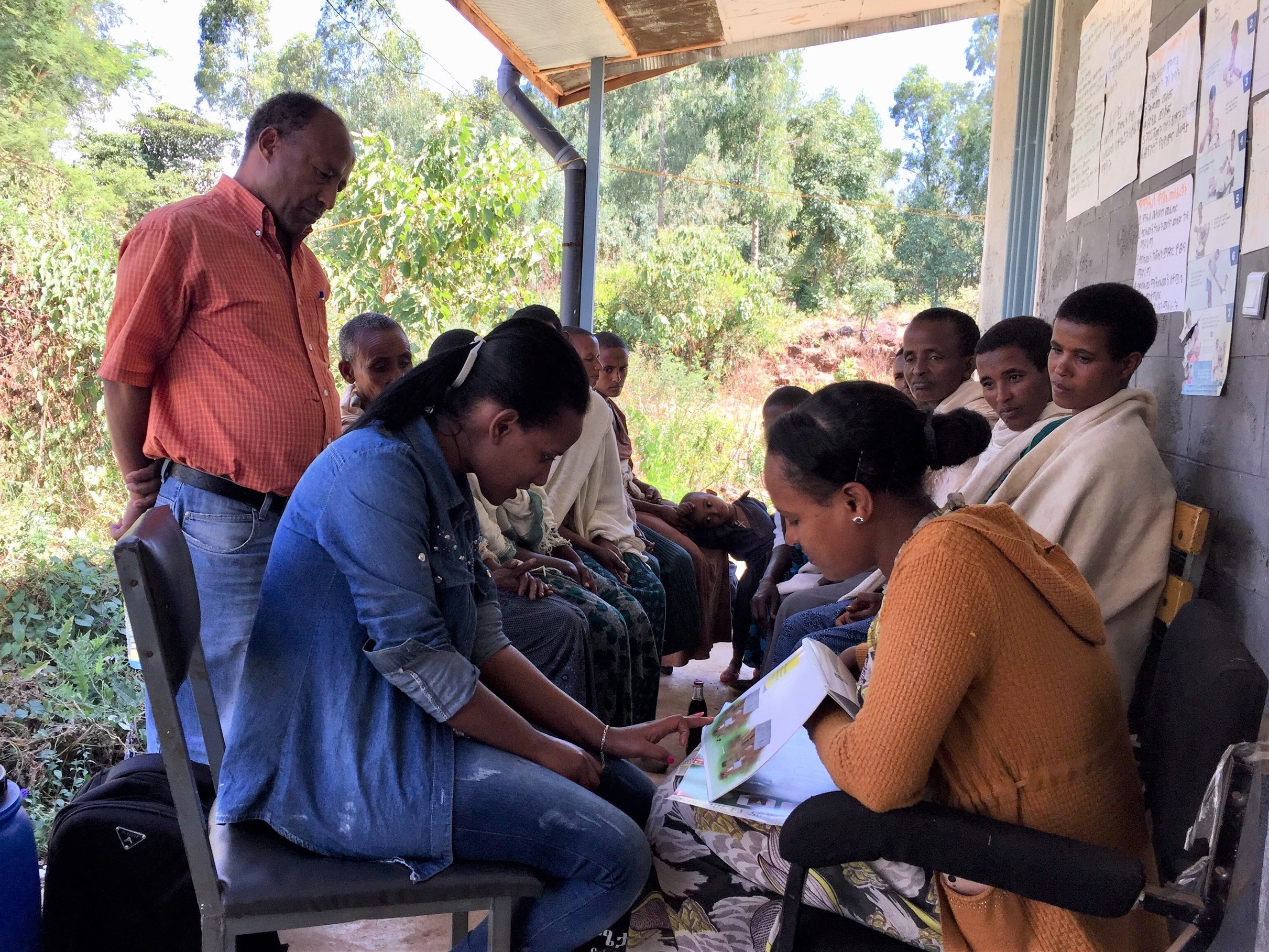
The Andilaye team is conducting another round of refresher trainings with community health volunteers. Here, the health extension workers of an intervention kebele are demonstrating a household counseling visit.
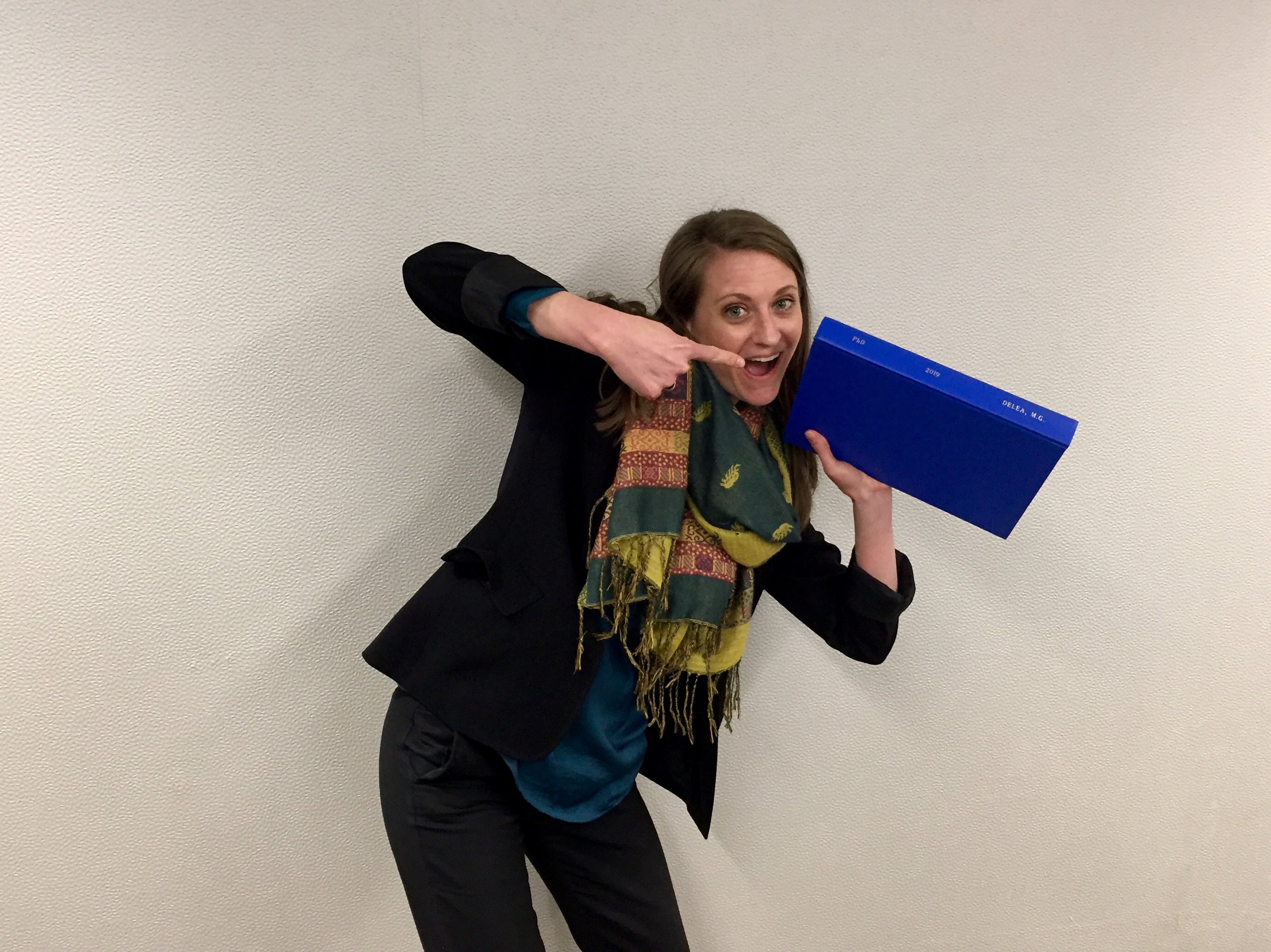
Check out that PhD dissertation! Congrats Dr. Delea!
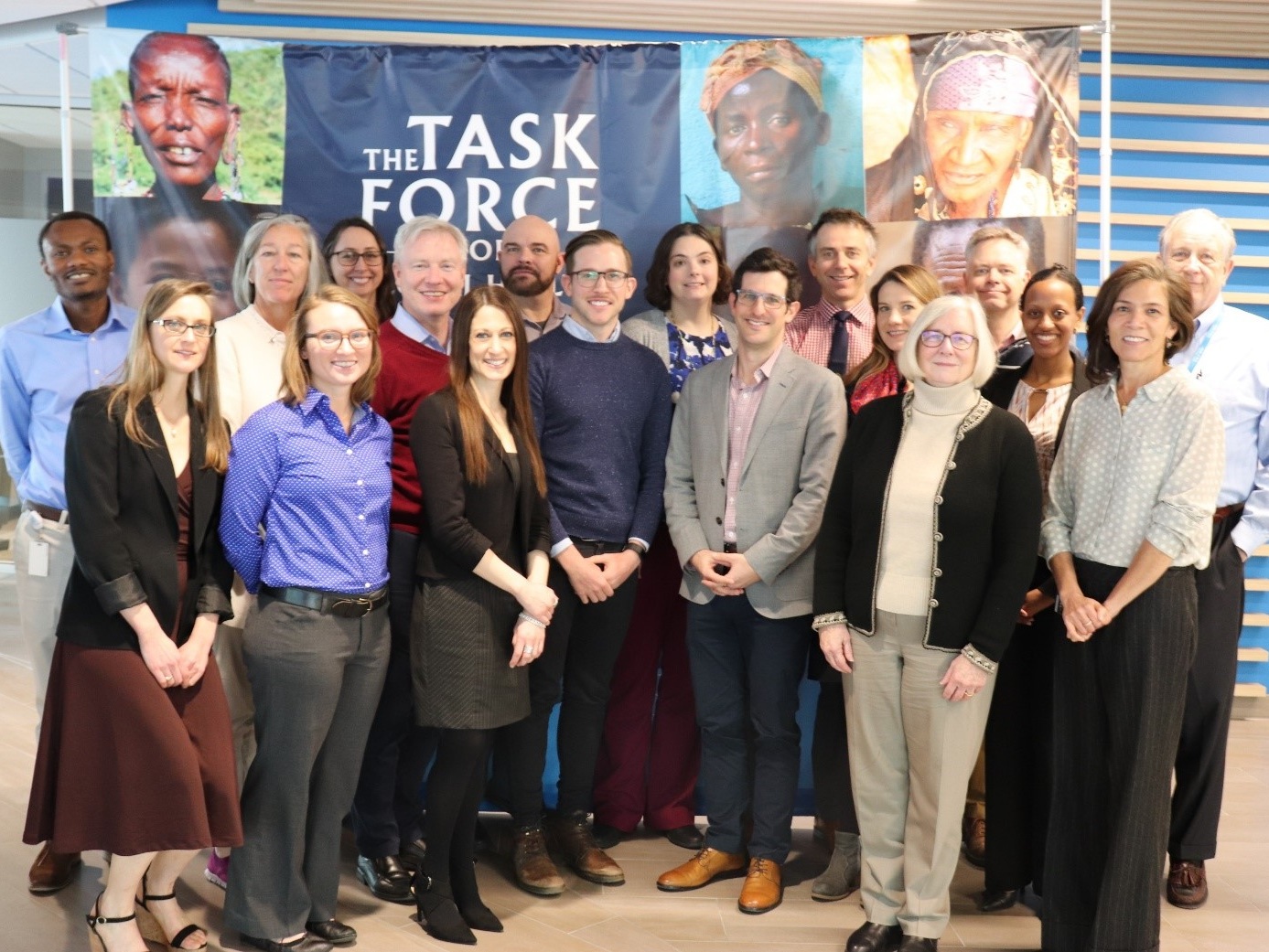
Matt, Maryann, and Jed attended an “F in SAFE” strategic technical meeting at the Task Force for Global Health to discuss and propose next steps for a methodology that reliably measures “clean face” in the context of trachoma programs and operational research.

Our Andilaye team hosted a regional workshop with Amhara project stakeholders to discuss progress of the intervention in study communities. Here, a health extension worker shares her experience with the intervention activities thus far.
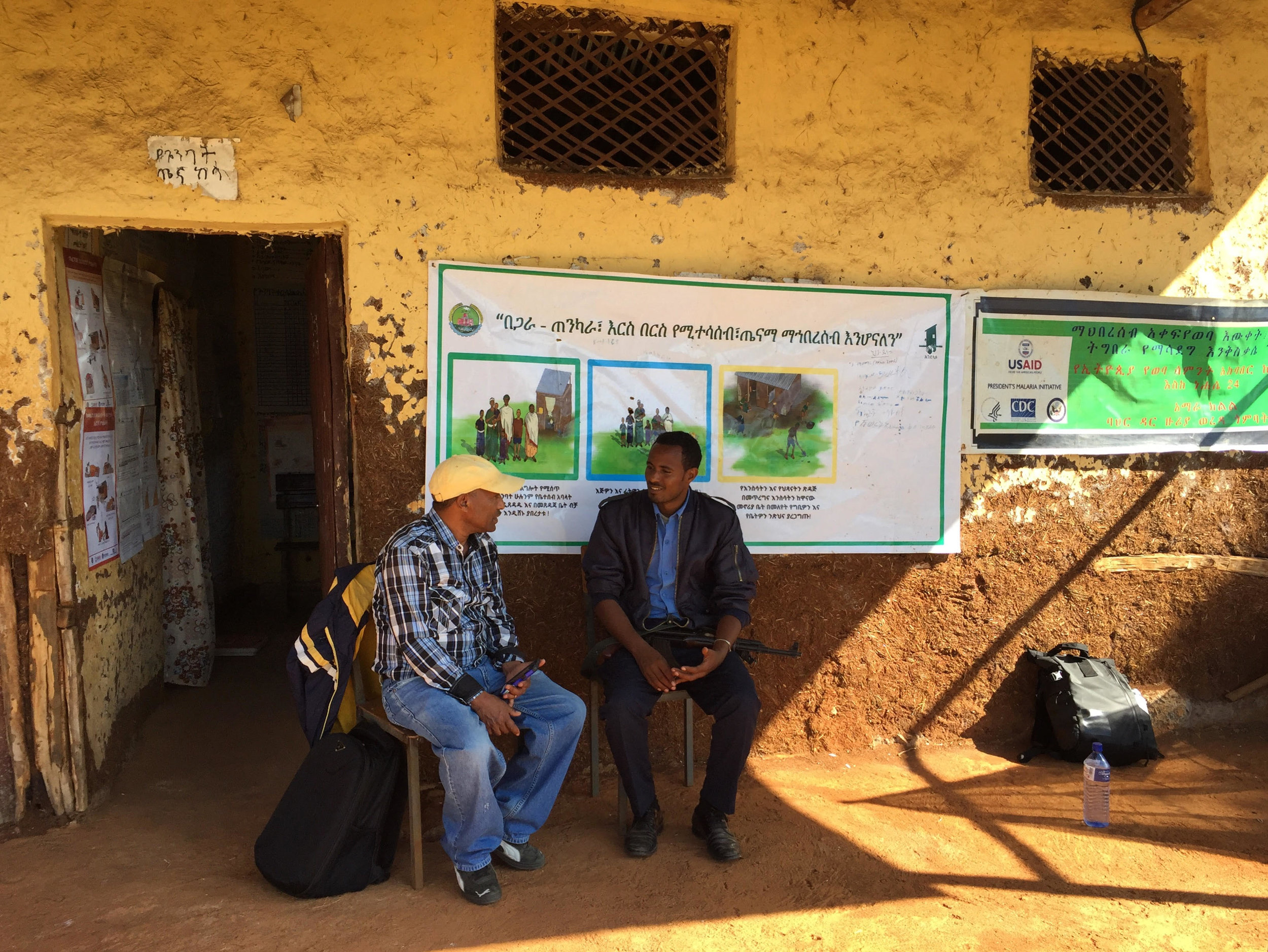
Throughout December and January, we visited Andilaye communities to learn more about how the project is being received by influential community members. Here, our project Monitoring and Evaluation Officer Mulat Woreta is interviewing a community police officer at the health post of an intervention community.
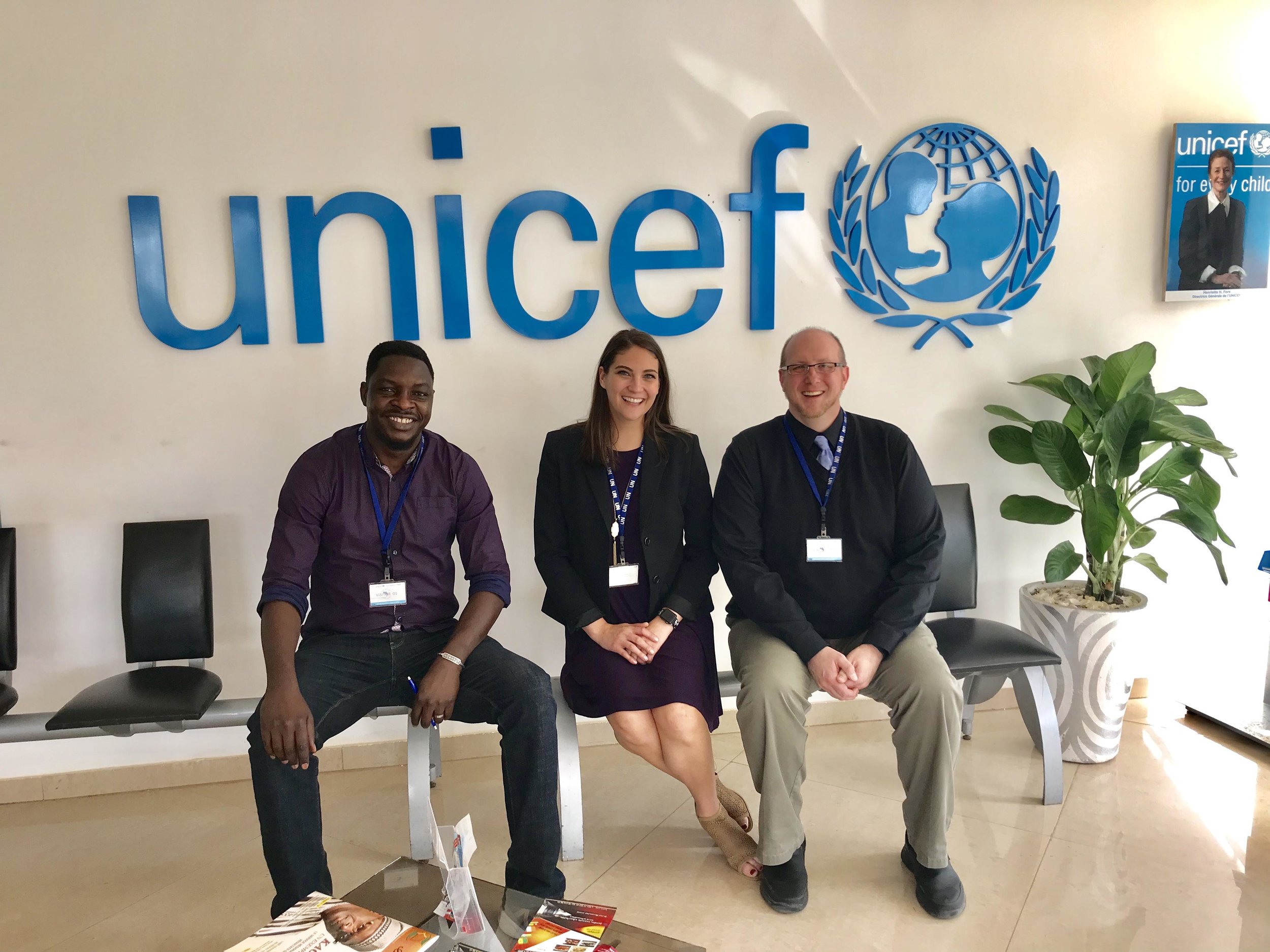
Bonheur Dounebaine, Kyra Hester, and Robert Bednarczyk traveled to Dakar, Senegal to discuss the Vaccine Exemplars Project with local partners at the Ministry of Health, UNICEF, WHO and others.
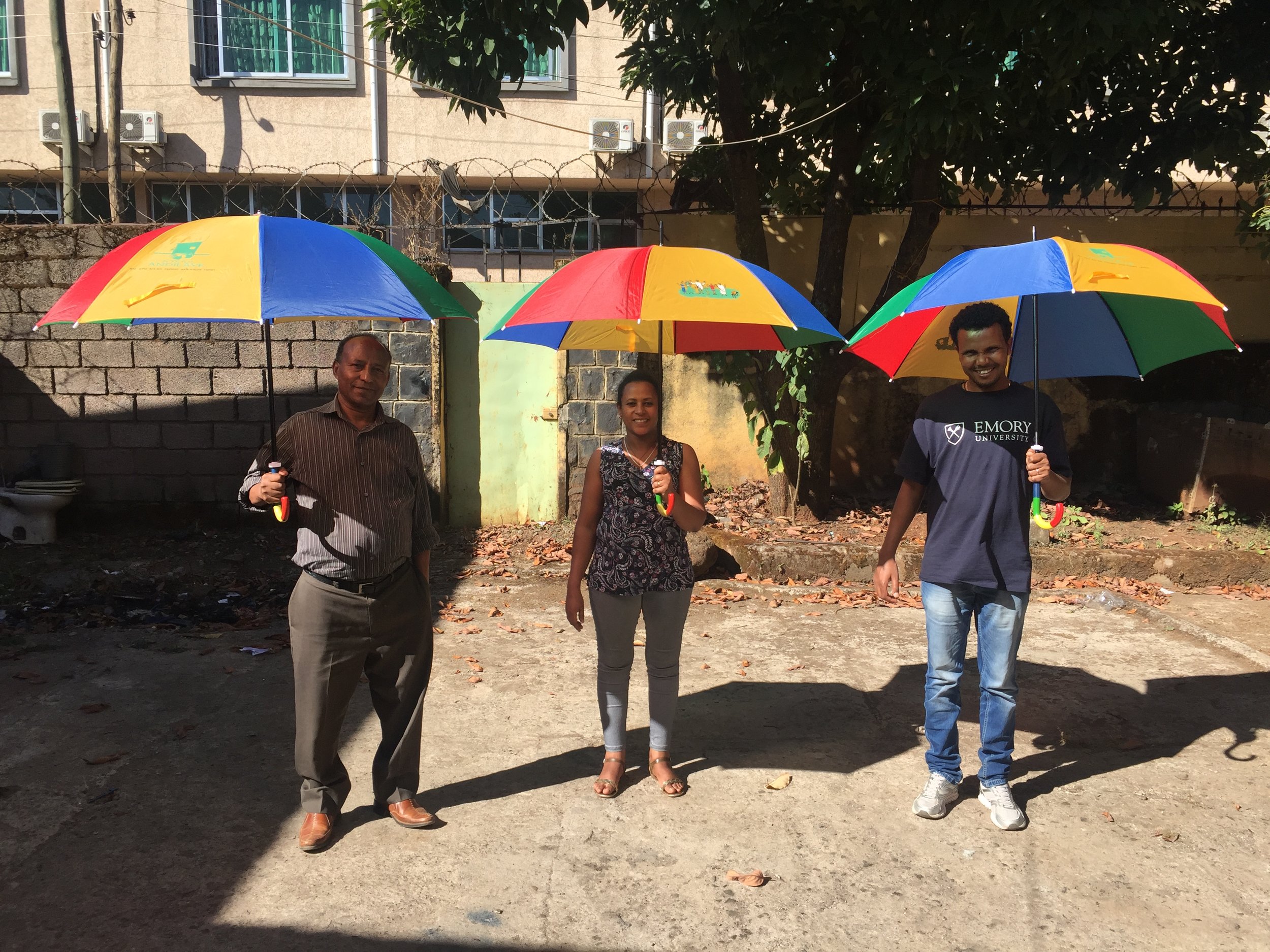
The Andilaye umbrellas are here! These in-kind umbrellas (modeled by our regional staff: Mulat, Tigist, and Kassahun) will be distributed to the Health Extension Workers and Women’s Development Army Leaders to help shade them from the strong sun as they conduct the Andilaye household counseling visits with caregivers.
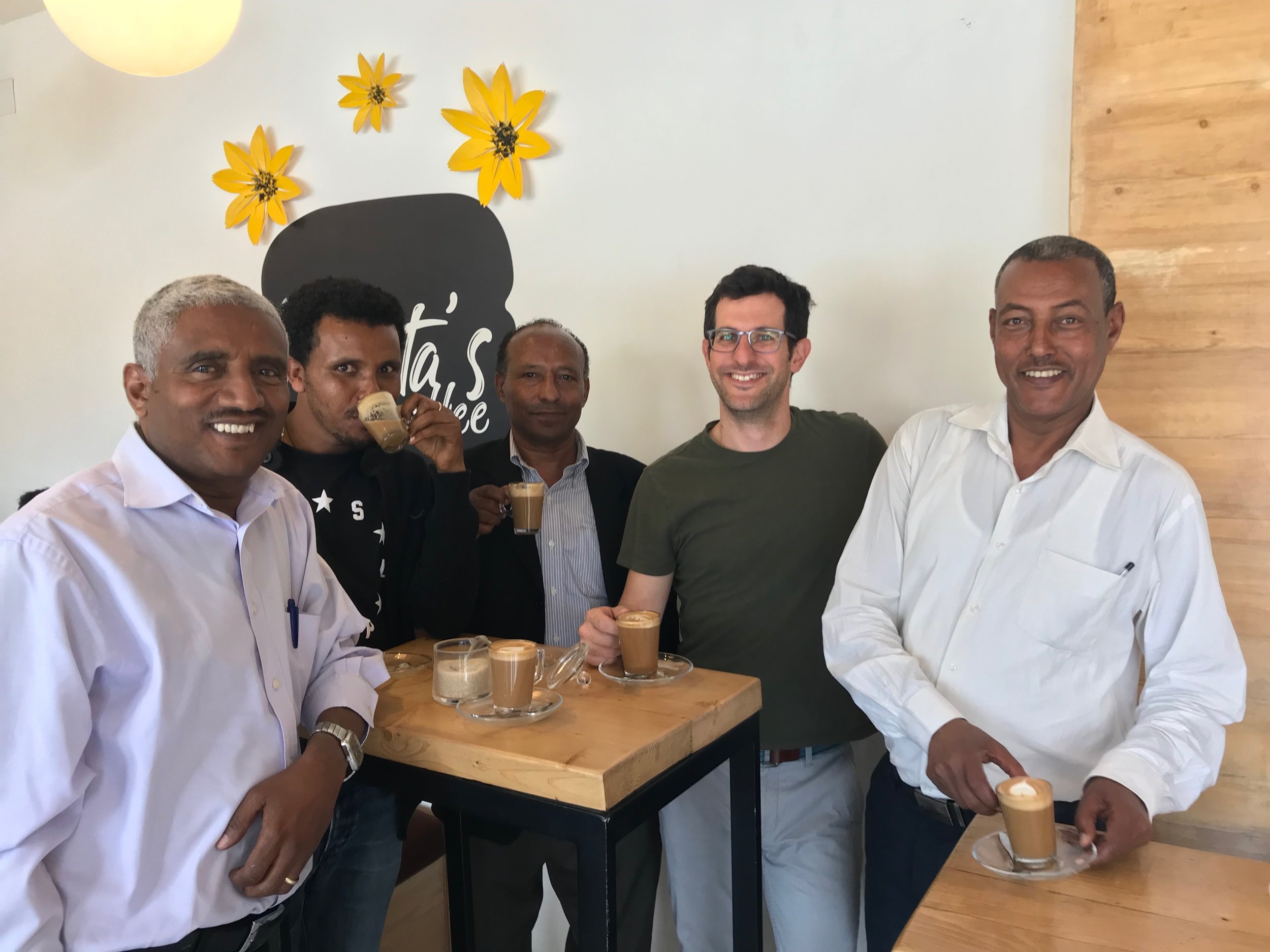
Matt and staff from the Emory Ethiopia team (Dr. Abebe, Kassahun, Mulat, and Tamiru) enjoy a cup of coffee in Addis as they prepare for the NNN 2018 annual conference. The Andilaye project was highlighted in a WASH-NTD panel discussion during the conference.
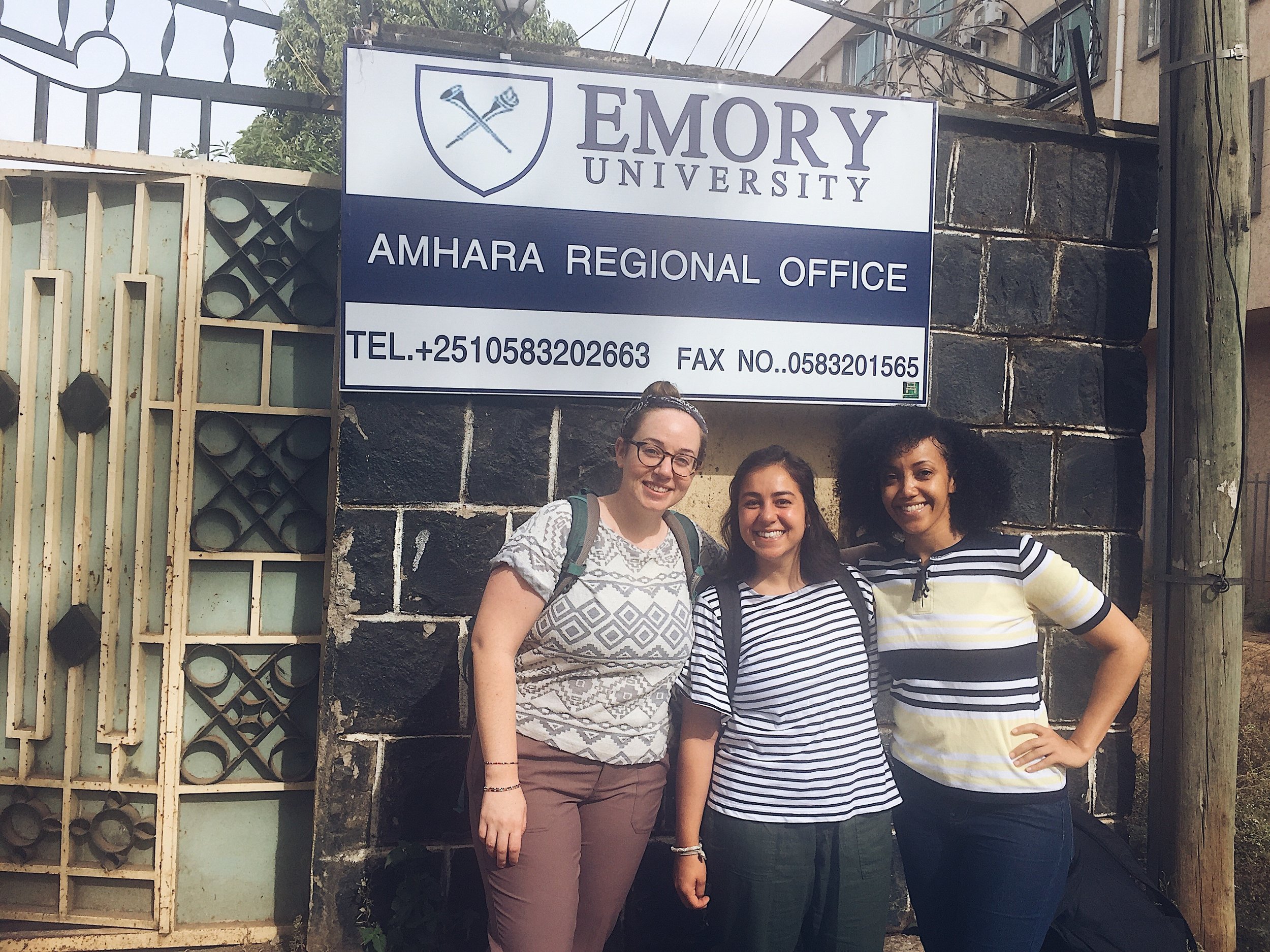
Ashlin Rakhra (MPH ‘19) and Tina Braccio (MPH ‘19) both conducted practicums at the Emory University/Ethiopia office in Amhara this past summer. Their projects involved process evaluation on our Andilaye intervention.
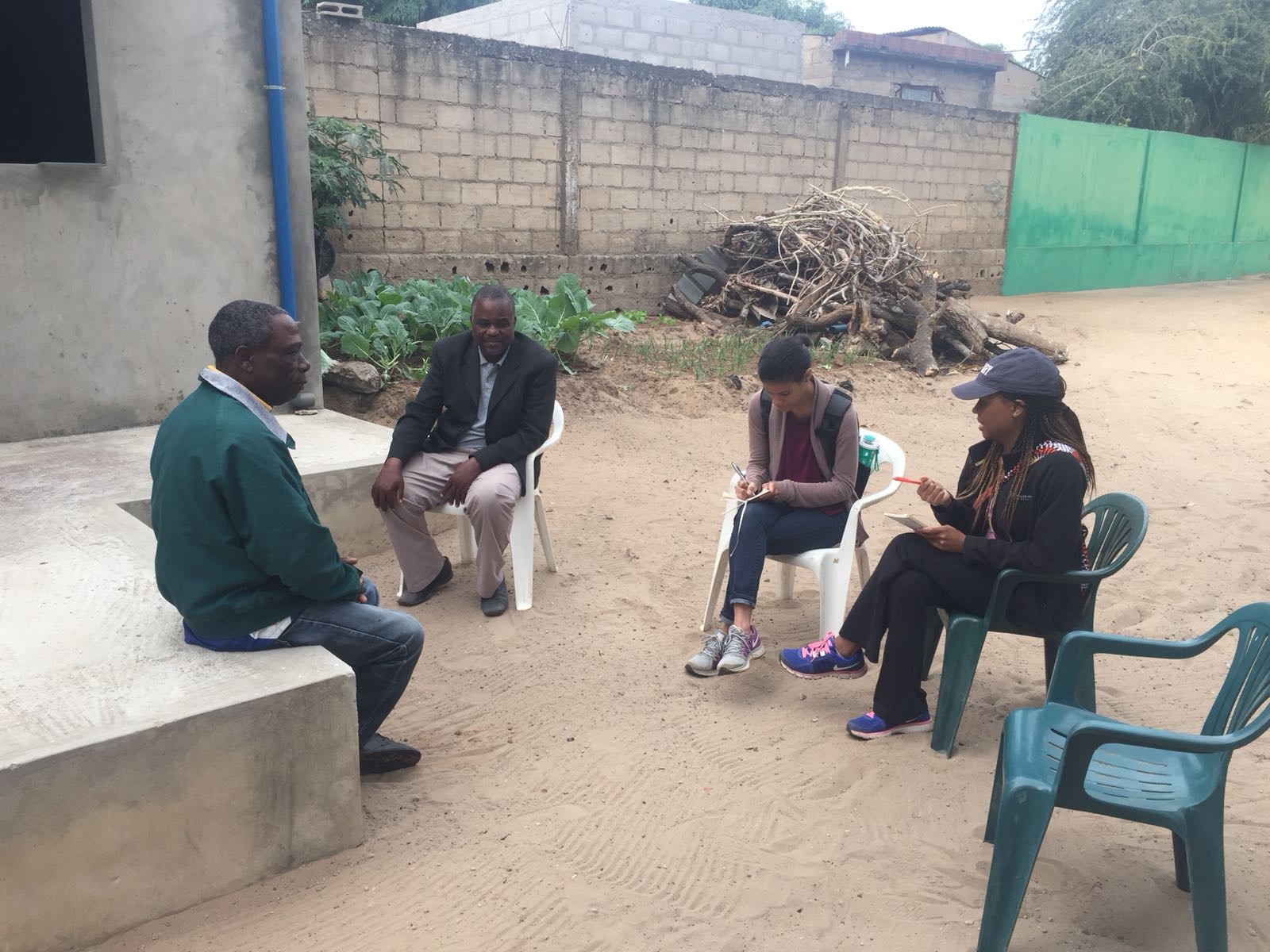
PhD student, Frederica Lamar, spent this summer collaborating with a veterinarian at Universidade Eduardo Mondlane in peri-urban Maputo, Mozambique to identify key high risk behaviors contributing to childhood exposure to chicken feces. Here, she is conducting an interview as part of formative research to gain an understanding of the value chain related to chickens.
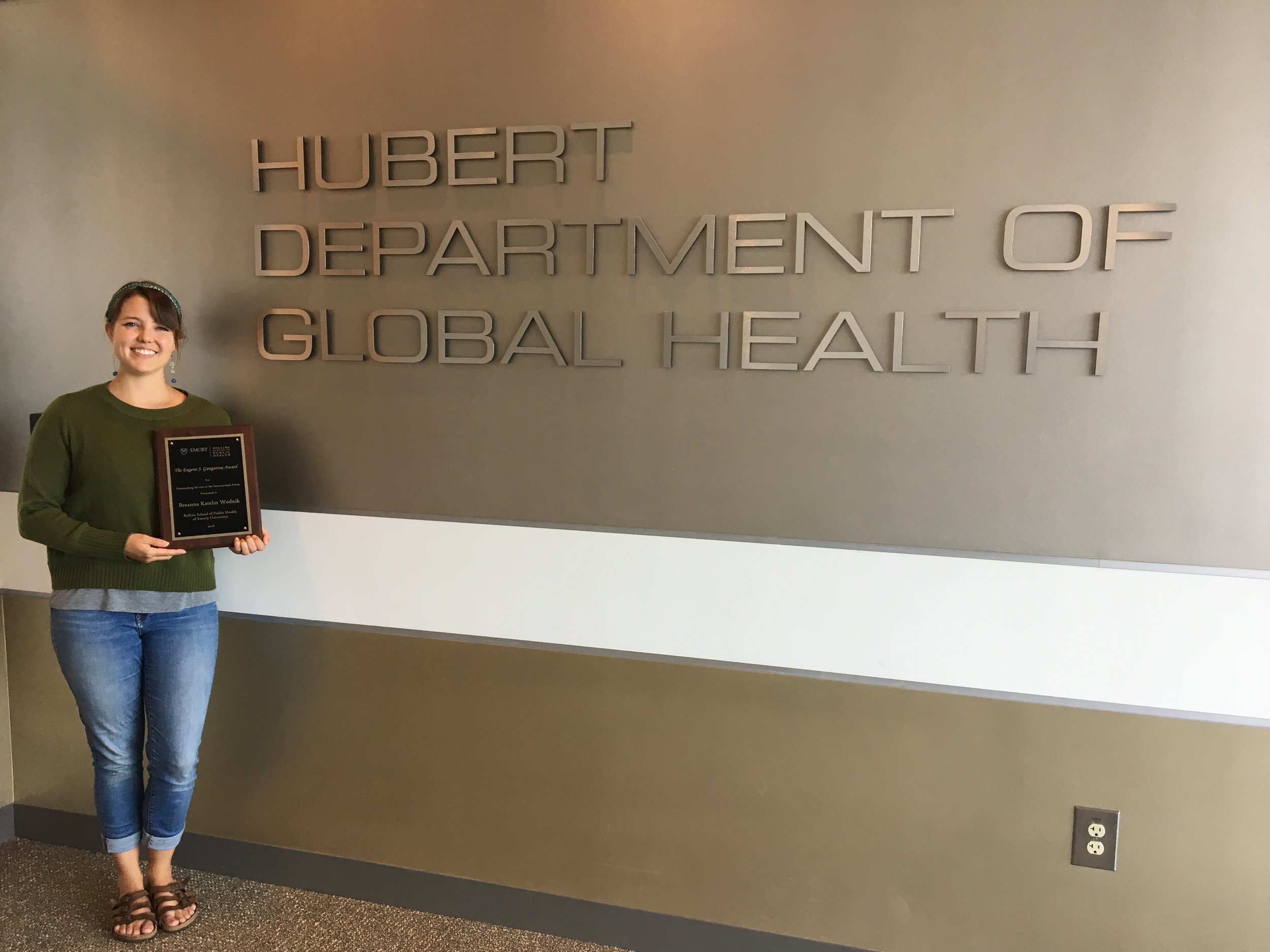
Congratulations to Breanna Wodnik (MPH ‘18) for being awarded the Eugene J. Gangarosa Award for Excellence in International Health! This award is presented to the graduating student who has demonstrated a creative approach to solving public health problems and who shows promise for outstanding service in the international arena.
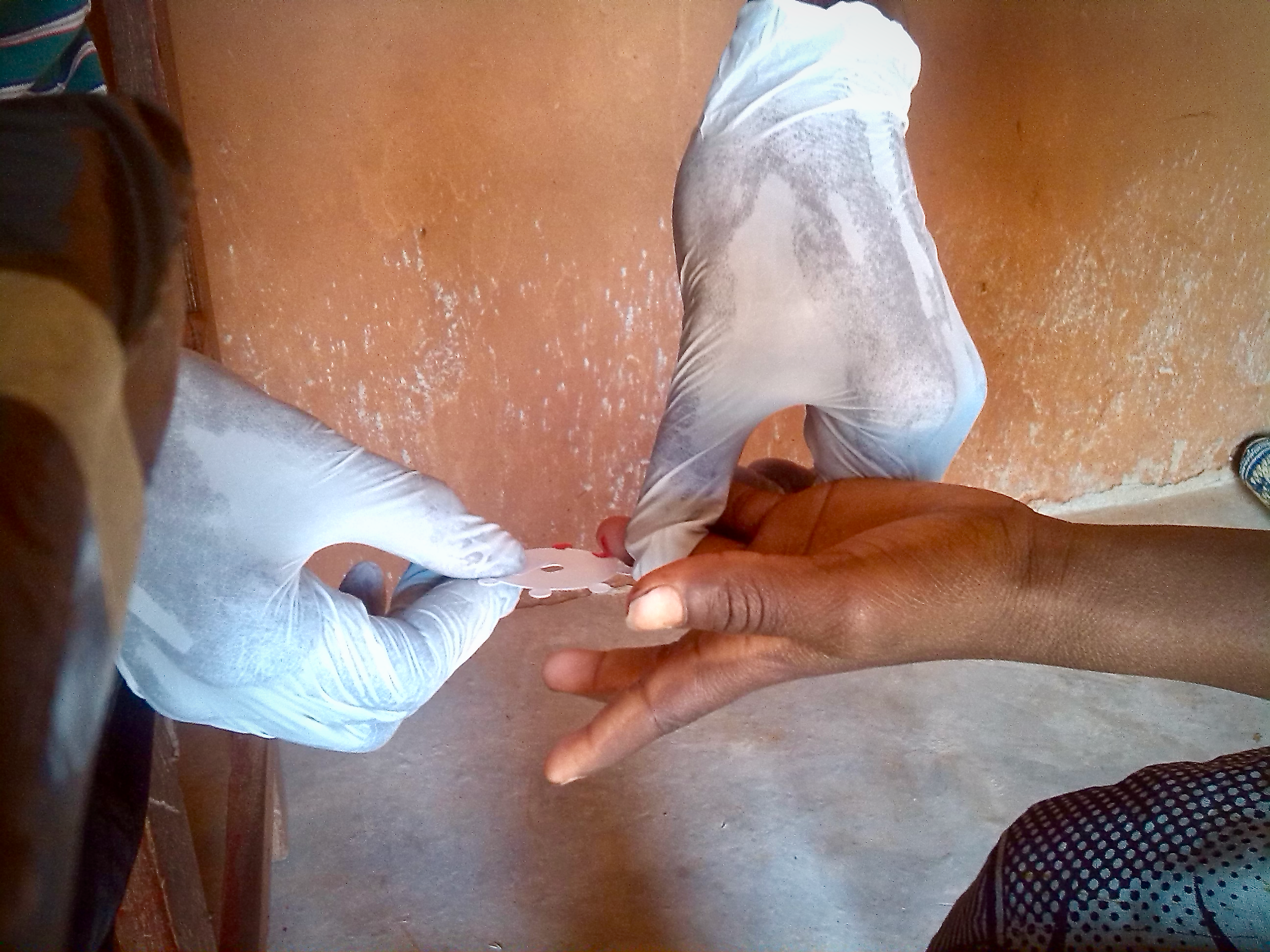
Congratulations to Anna Chard, a PhD Candidate in the group, whose paper on “The impact of WASH improvements on infections disease using serum antibody detection” was accepted as a finalist for Best of UNICEF Research 2018! Anna’s paper shows that dried blood spot (DBS) collection provided objective evidence of disease at a low cost per antigen analyzed, making it an effective measurement tool for the WASH field.
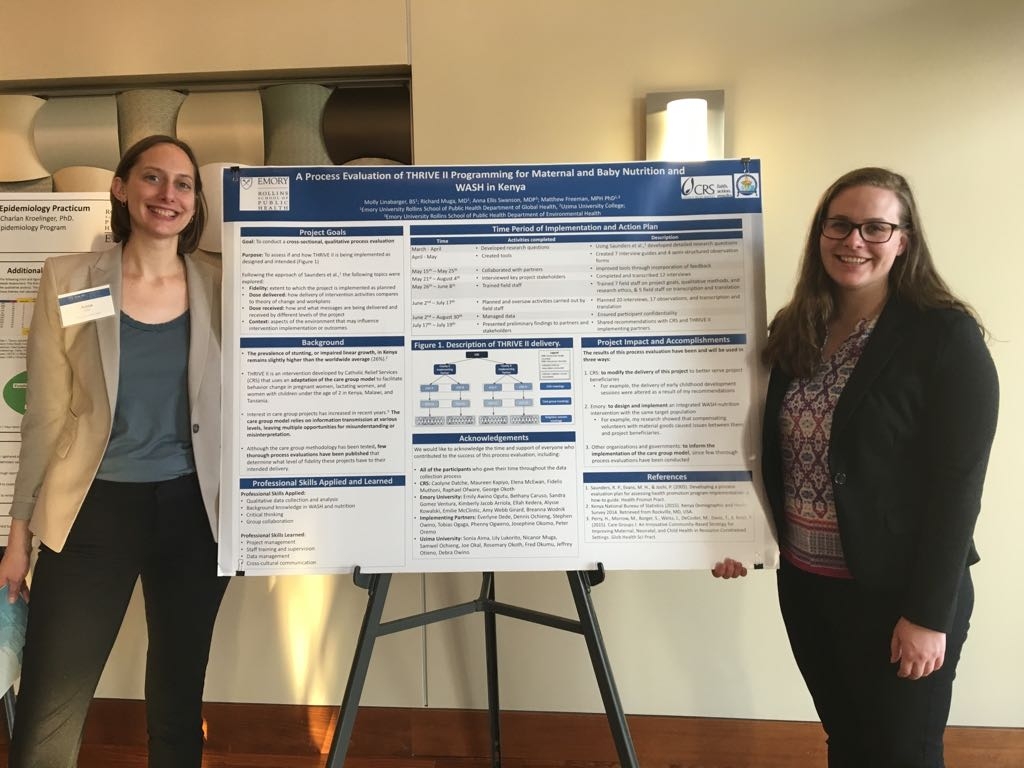

25 community mobilization and commitment events in the past 30 days. These events are a key intervention activity to Andilaye and focus on improving action knowledge, barrier identification and planning, and attitudes regarding targeted NTD-preventive WASH behaviours through a form of contextually appropriate and interactive edutainment. The events also initiate the process of shifting social norms through community-generated and managed by-laws and sanctions and public commitment thereof.
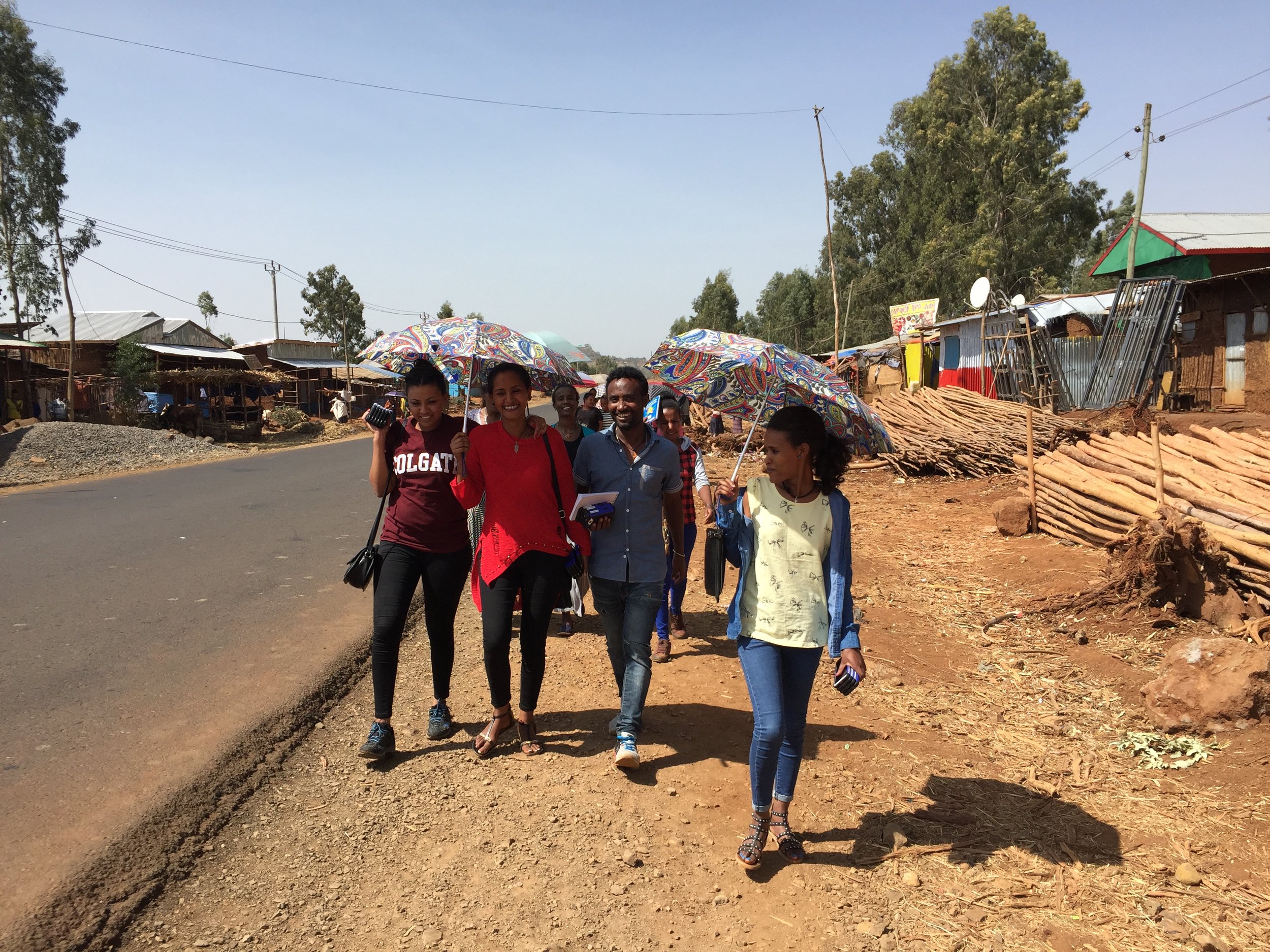
Midline data collection for the Andilaye project has begun! Here our data collection supervisors (left to right: Rosie Abesha, Tigist Abebe, Destaw Asnakew, and Yeseresh Gashu) lead our data collectors to a community to administer midline surveys.
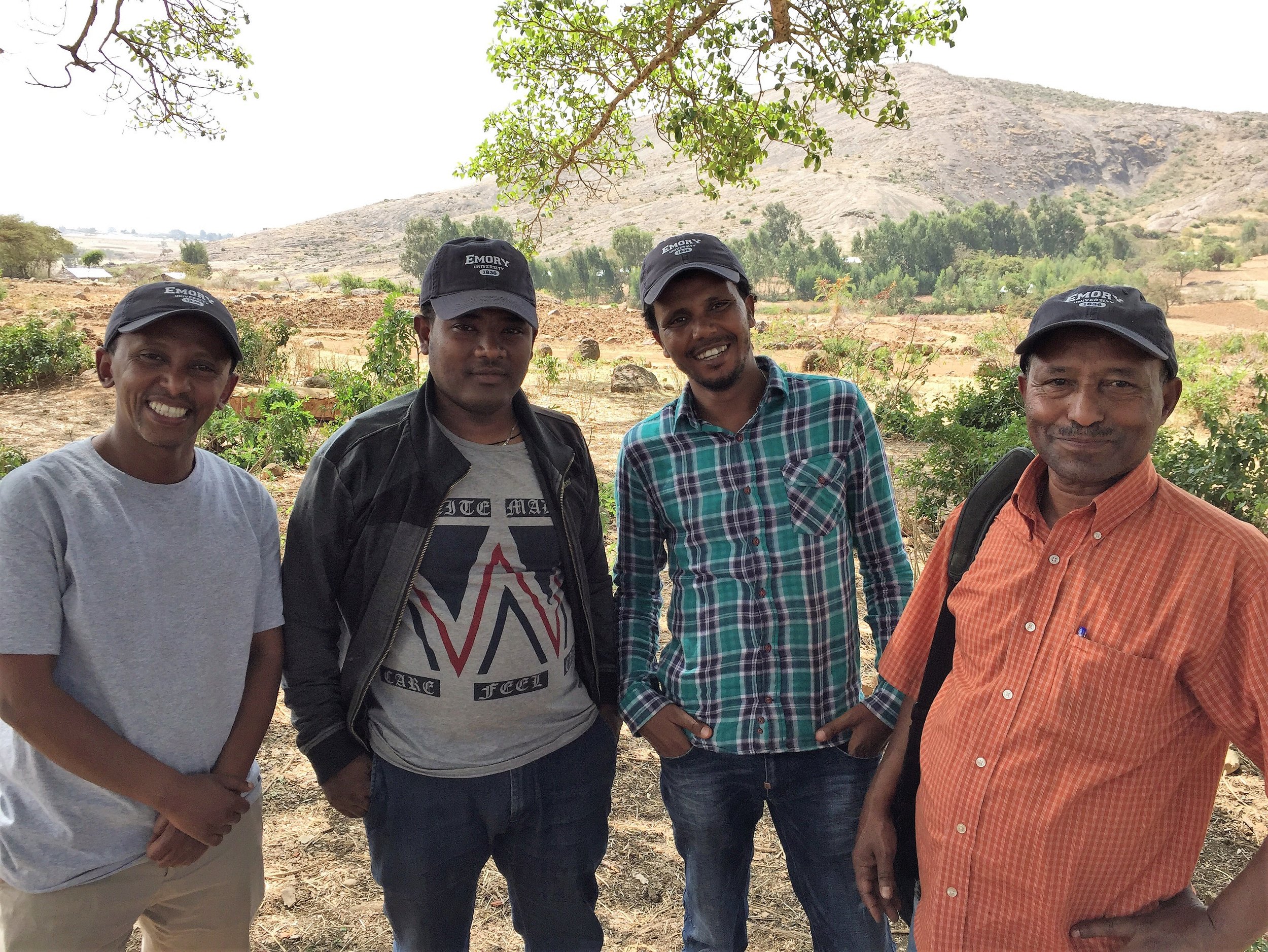
The Emory-Ethiopia team is looking pretty sharp in Emory University gear. From left to right it's Yihenew (an Oregon State University PhD Candidate), Resom, Kassahun, and Mulat (Emory-Ethiopia Amhara regional staff). Over the past year, this team has been designing and implementing the Emory-Ethiopia project call project Andilaye (Amharic for togetherness) whose core message is "Together we can be a strong, caring, healthy community."
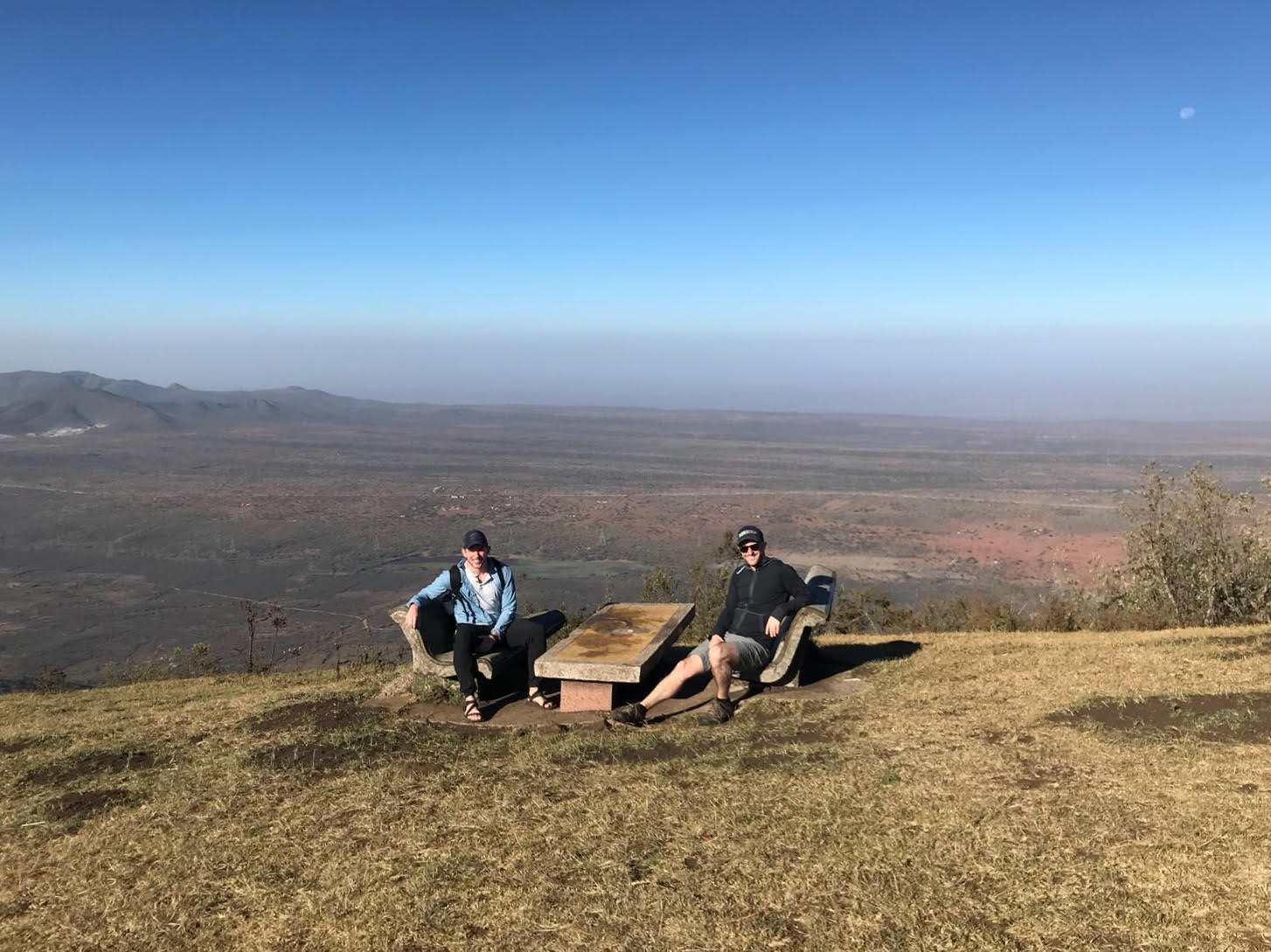
After busy week of field work and meetings with project stakeholders in Kenya, Matt and Jed enjoy a Saturday morning at the Ngong Hills just outside of Nairobi.
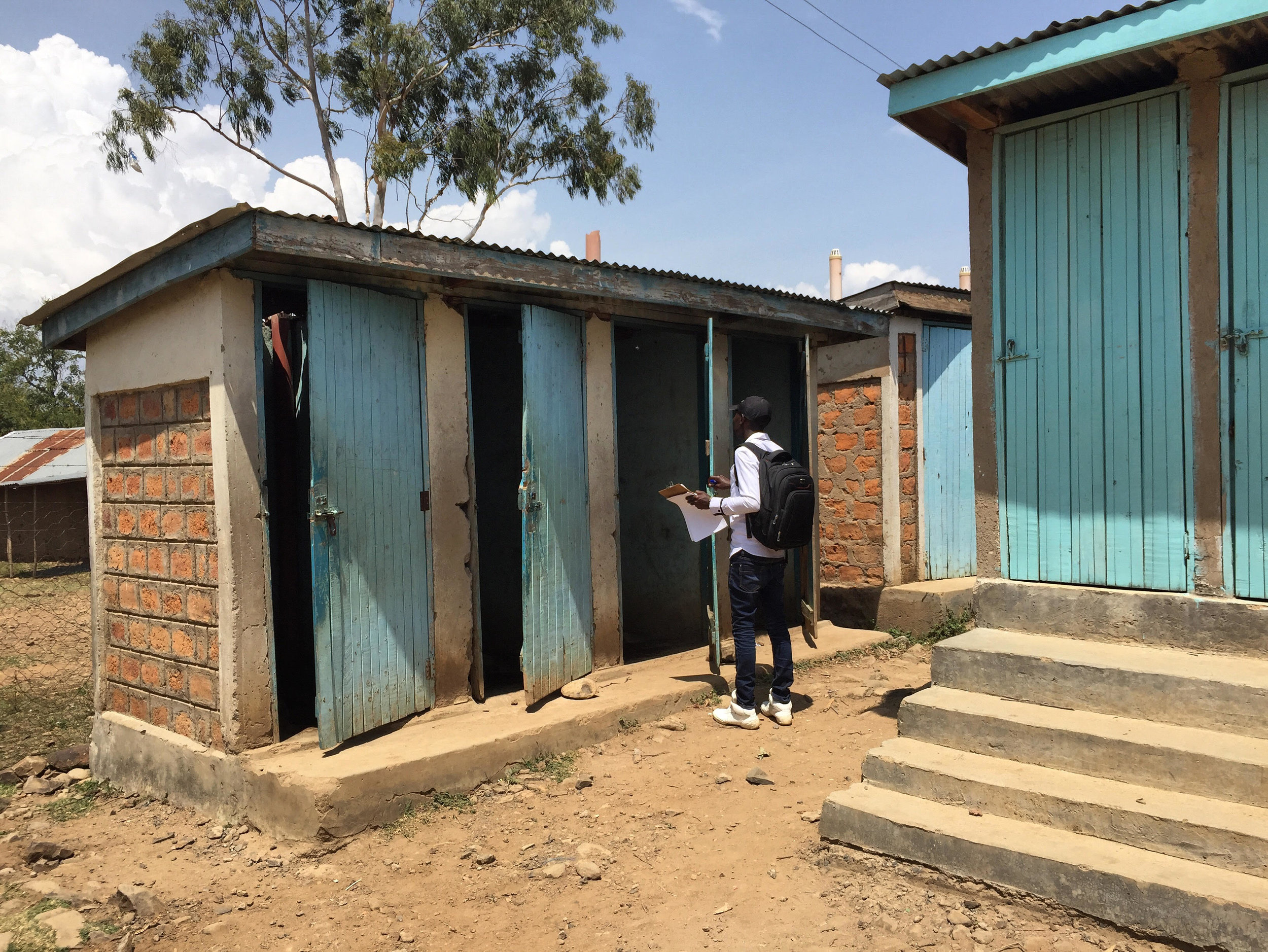
In January, we kicked off our data collection for the SWASH+ Life Cycle Costing study in 100 schools in Kisumu, Nakuru, Nairobi, and Mombasa counties of Kenya. Here, our data collector Charles Boera inspects a school's latrine block to estimate the cost of repairs.
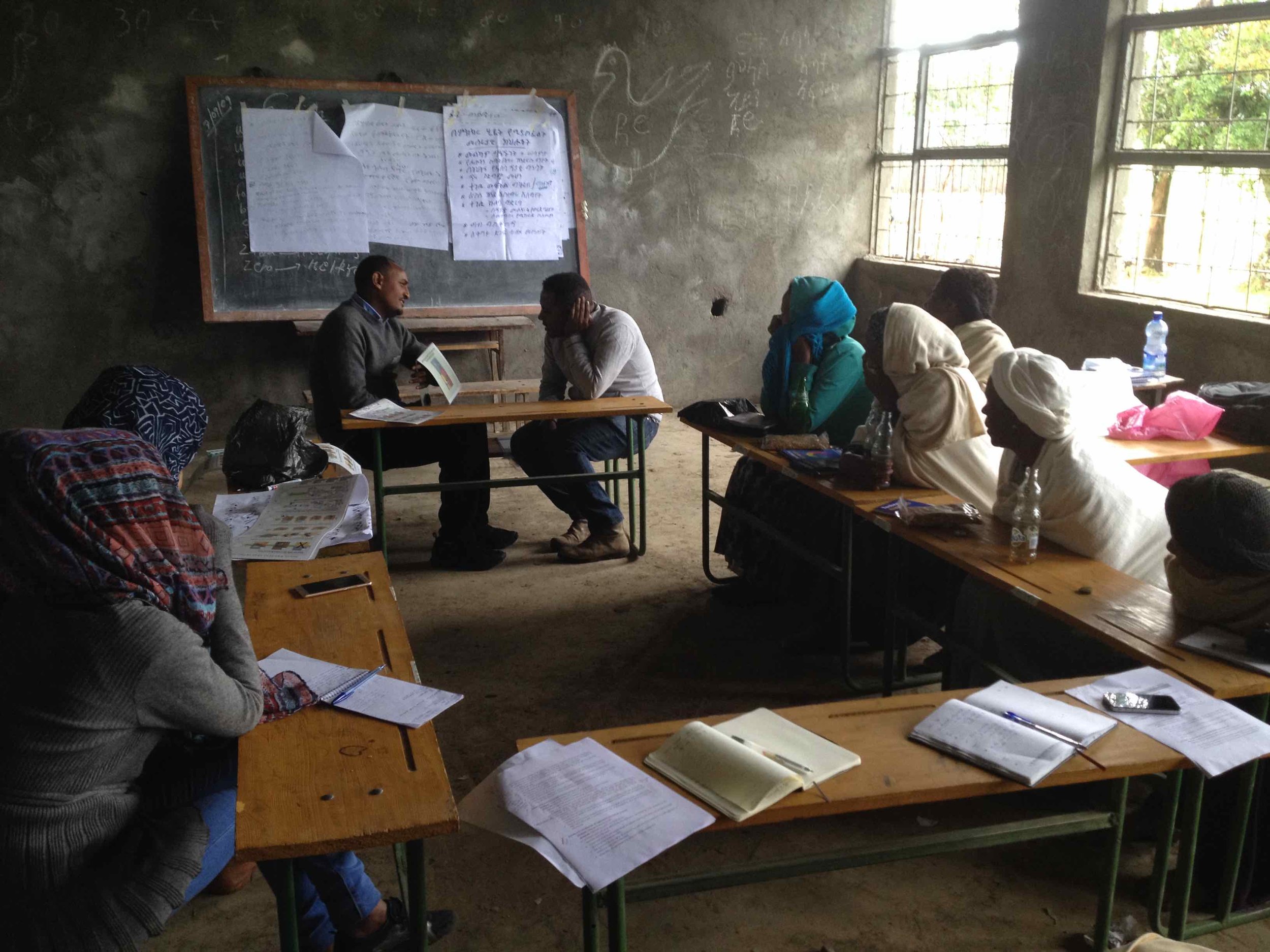
The two-day training for Andilaye household counseling visits have begun. These trainings will take place at in each Woreda (district) involved in the Andilaye intervention (Bahir Dar Zuria, Fogera, and Farta). The trainings are facilitated by Emory Ethiopia Andilaye team members. Health Extension Workers, Cluster Health Center Heads, and the Sanitation and Hygiene Officer and Health Officer will be in attendance from all intervention kebeles (villages). Here, Andilaye team members Siraj and Resom role play a household visit using the household counseling visit flipbook.

After presenting their summer practicum projects to THRIVE implementing partner, Homa Hills Community Development Organization, Graduate Research Assistants and 2018 MPH Candidates, Molly Linabarger and Breanna Wodnik, pose for a celebratory picture with our Public Health Program Associate Emily Awino Ogutu in Homa Bay, Kenya.
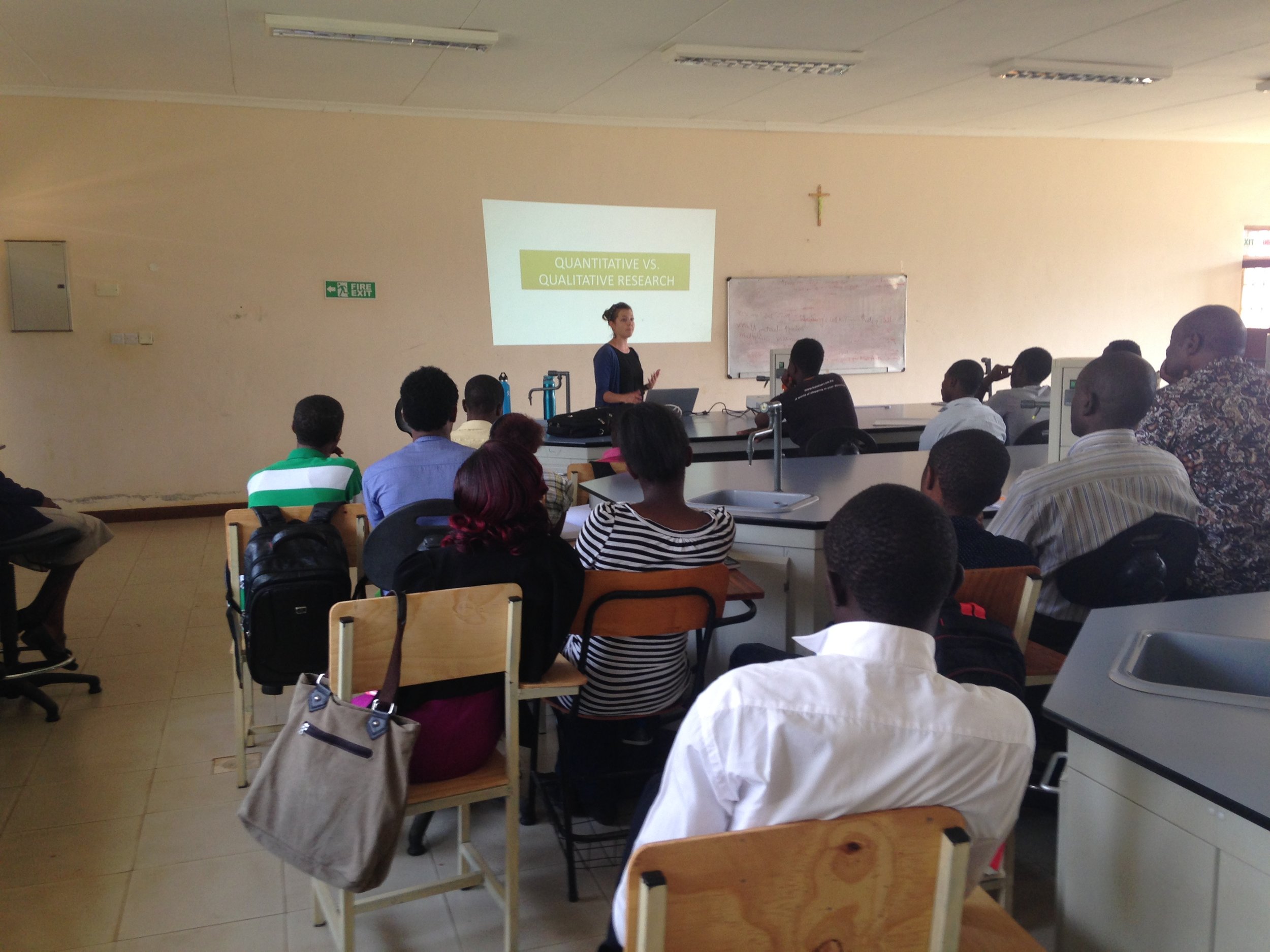
Graduate Research Assistant and 2018 MPH Candidate, Breanna Wodnik, presented on qualitative research methods and electronic data collection to fourth year medical students at Uzima University in Kisumu Kenya as part of her summer practicum and work on the THRIVE project.

Behavioral trials for the Andilaye intervention took place in May 2017 in the Amhara region of Ethiopia. The purpose of the behavioral trials is to test out aspects of the Andilaye intervention, from the overarching approach to the activities themselves, in order to determine what does and does not work at changing sanitation and hygiene behaviors in the Amhara context. Here, our behavior change communication specialist Siraj Mohammed is giving a key note address during a community mobilization and commitment event as part of the behavioral trial.
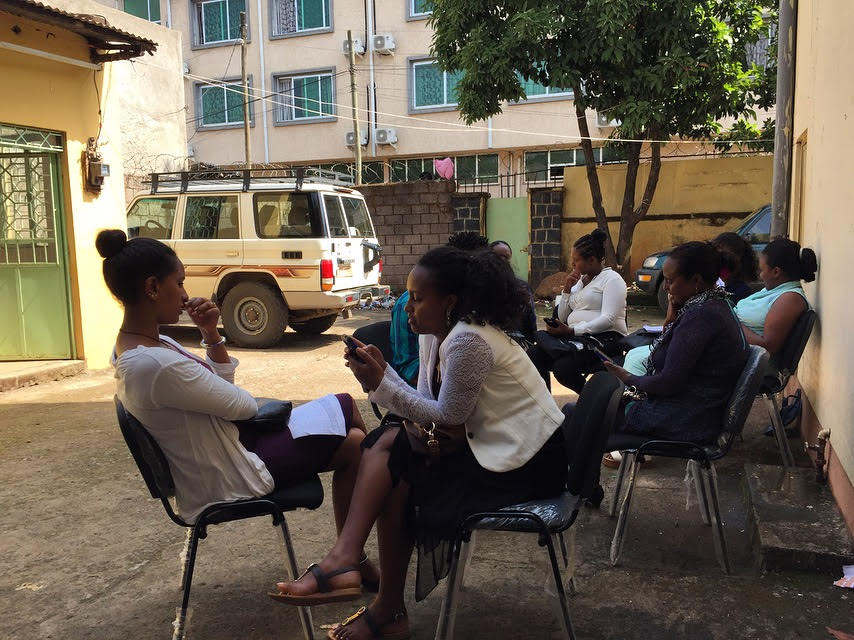
Data collectors for Andilaye get ready for another round of household visits by administering mobile survey in pairs. Mobile surveys developed using the freely available Open Data Kit help to improve accuracy and enable immediate availability of results. Our surveys also contain checks and prompts to limit entry errors during data collection.
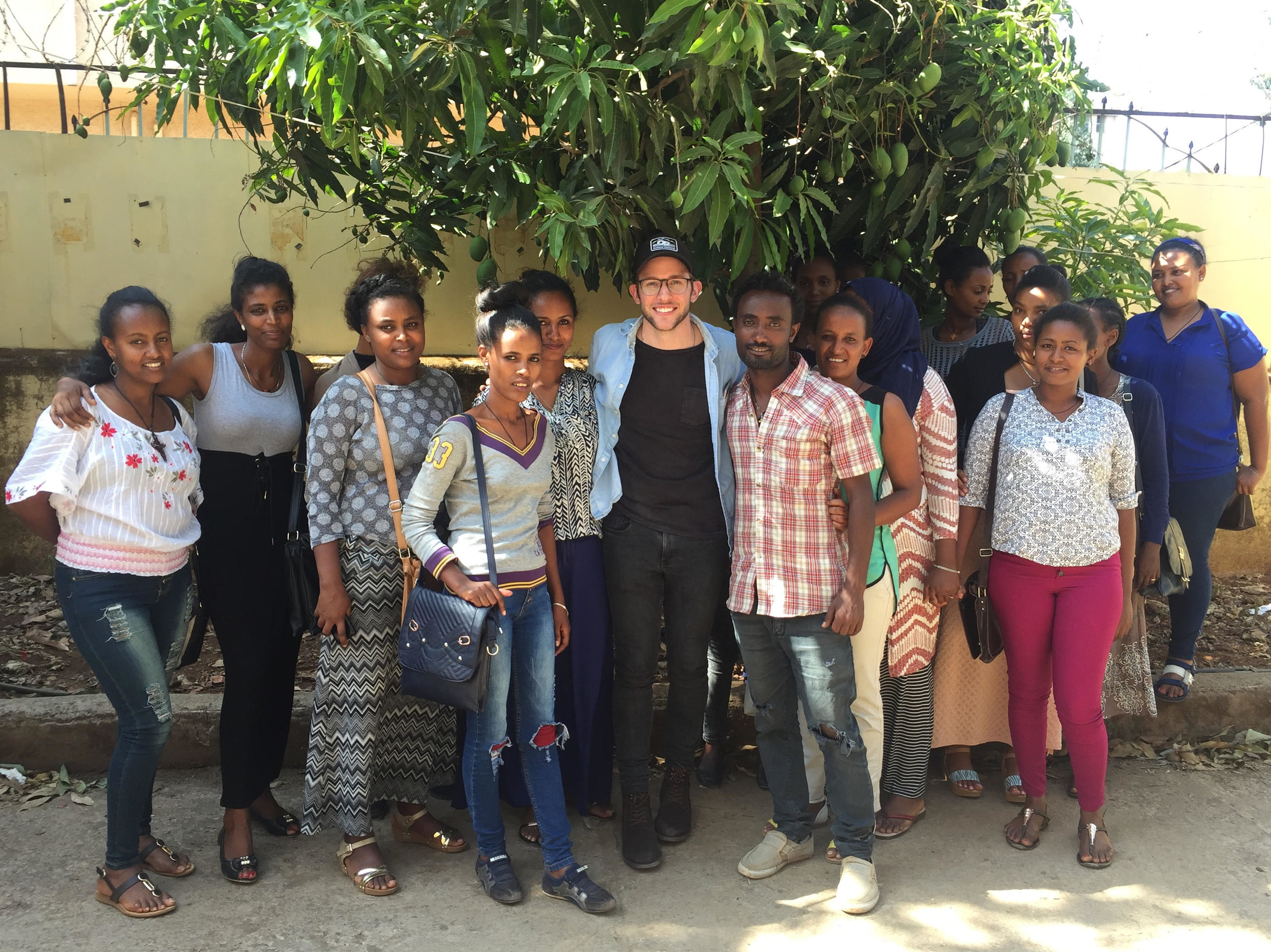
Baseline data collection for Andilaye is complete! Over the course of 37 days, we enrolled 1,589 households that will be followed throughout the next two years to measure changes in NTD-preventive sanitation and hygiene practices (i.e., behavioral outcomes) as well respondent-reported diarrhea and mental well-being in study communities over time. Here, our study manager Jed Snyder and team of data collectors pose for a celebratory picture.
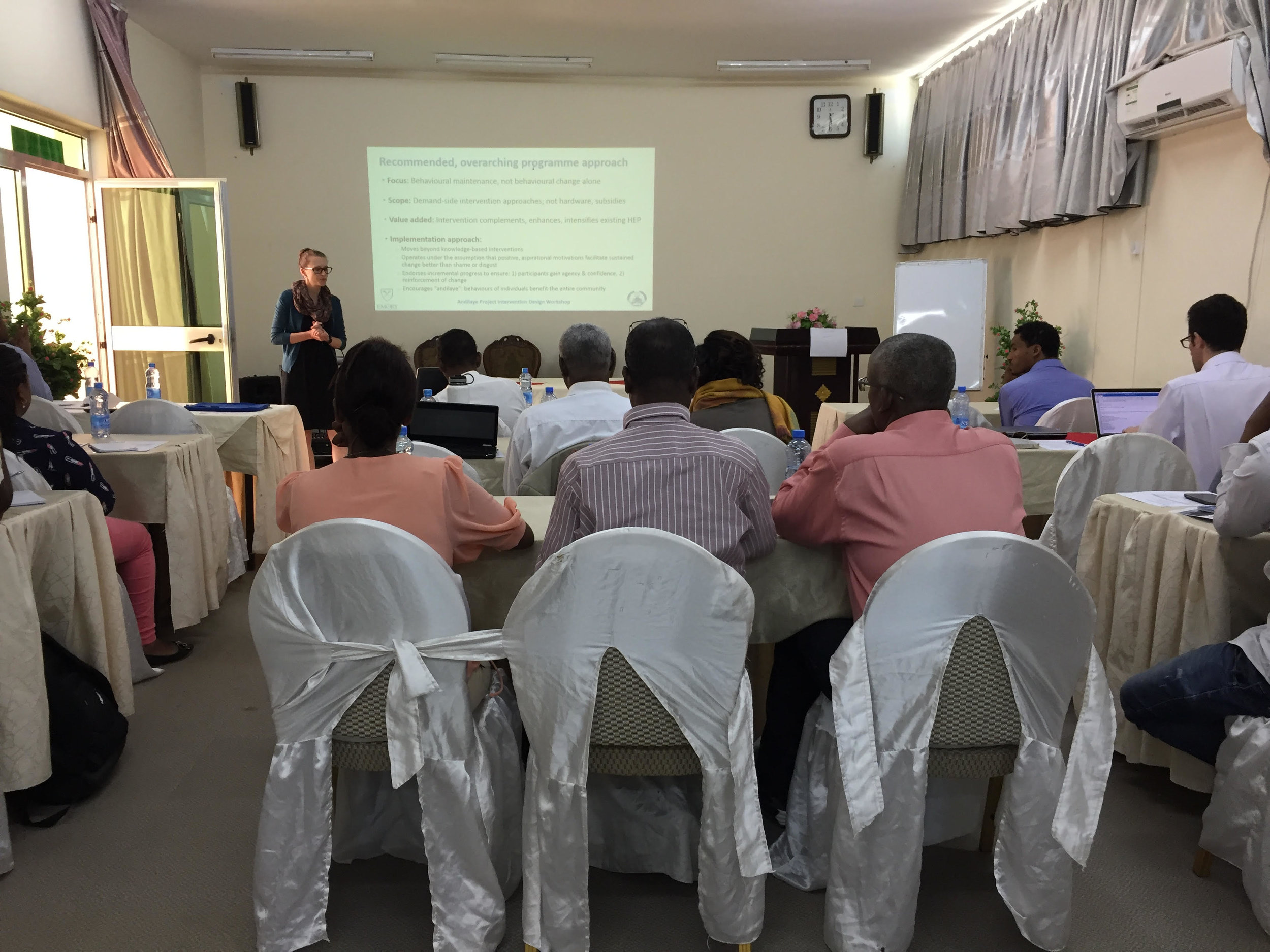
The Andilaye team held an intervention design workshop in Bahir Dar, Ethiopia on April 7 and 8, 2017 with key regional stakeholders. Here, our study coordinator Maryann Delea shares a summary of formative research results along with comprehensive problem and solution trees developed from formative research on sanitation, personal hygiene, and household environmental sanitation. Meeting participants partook in interactive activities to review findings and elicit feedback on target behaviors for intervention design. See the meeting report here.
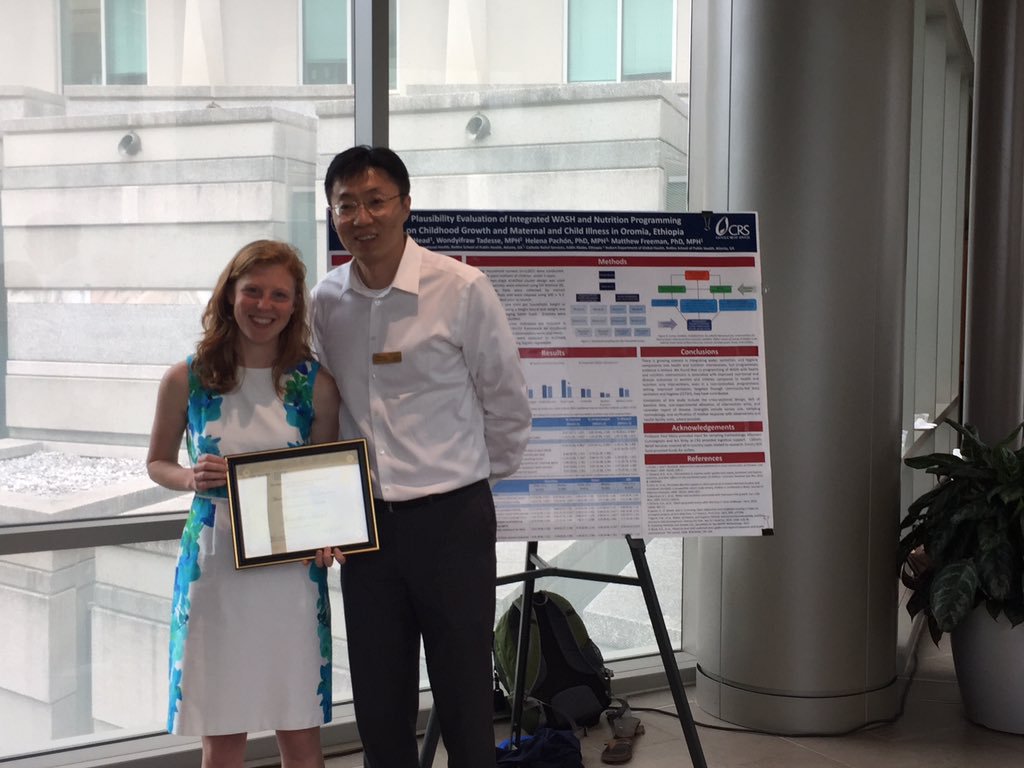
Congrats Jennifer Head! For winning the Rollins Department of Environmental Health Outstanding Research Award for her work with CRS in Ethiopia.
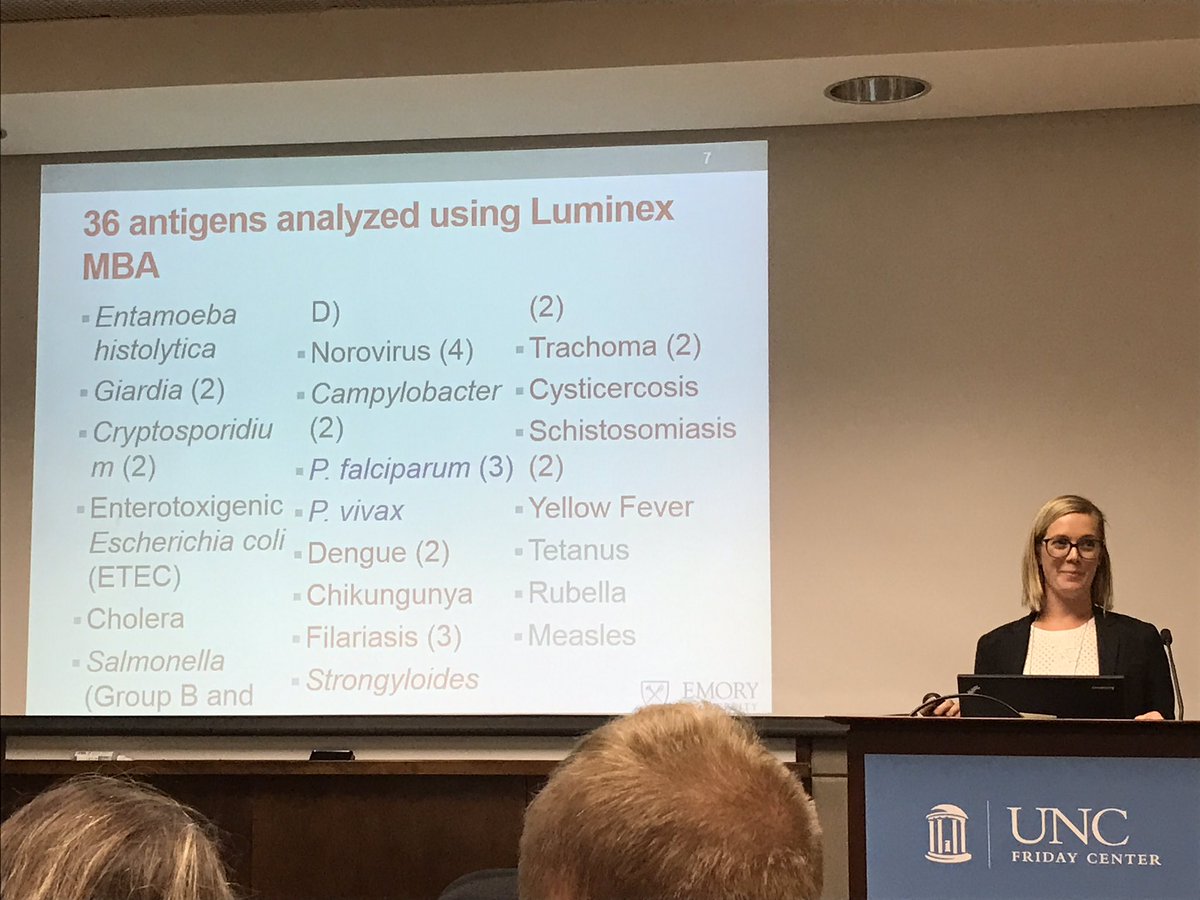
Anna Chard presenting on our Mali WASH in schools impact evaluation at the 2016 UNC Water and Health Conference.
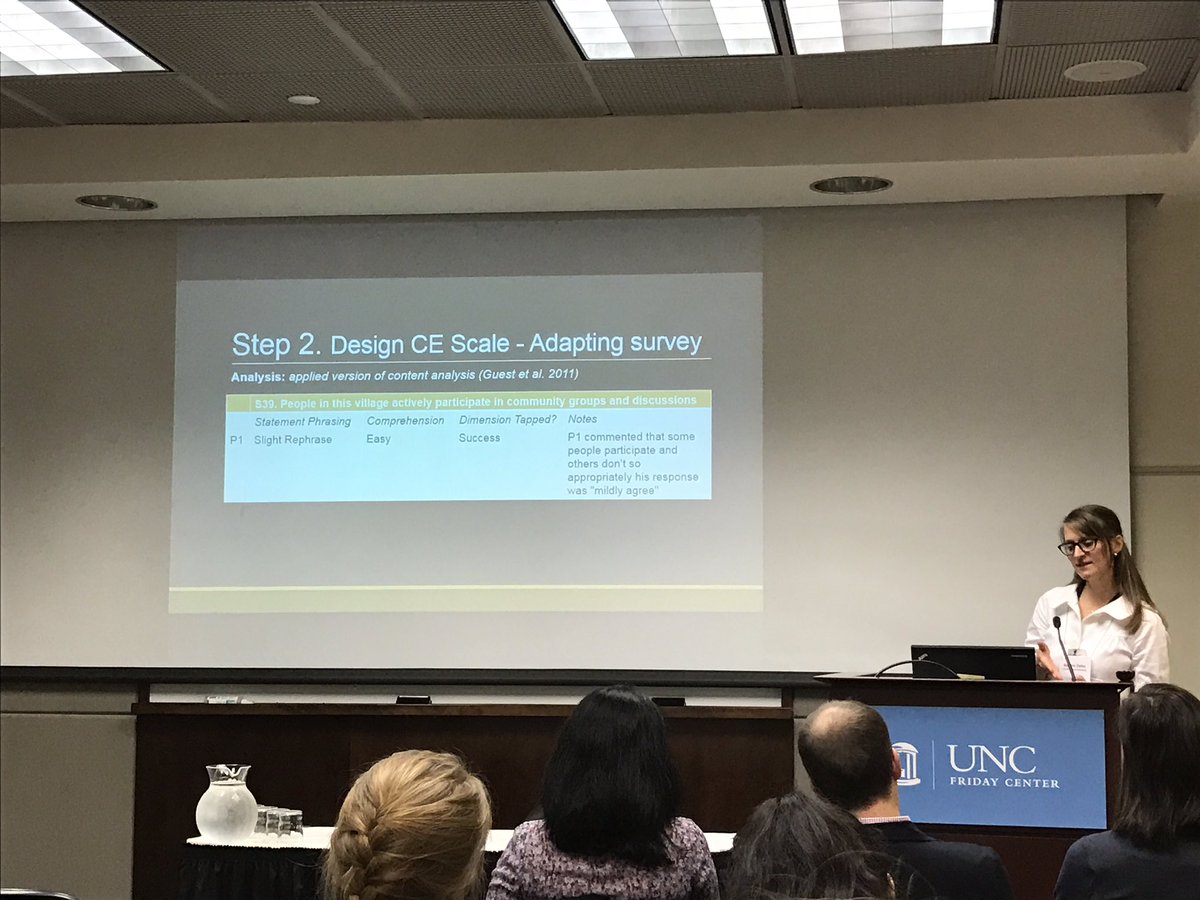
Maryann Delea presents the concept of measuring collective efficacy to tackle community sanitation challenges at the 2016 UNC Water and Health Conference.
















































































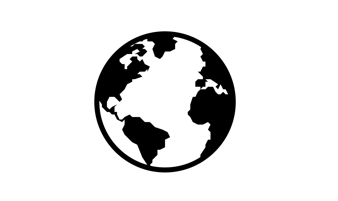

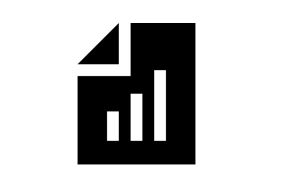

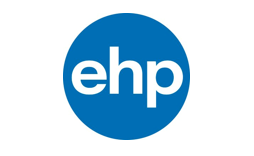
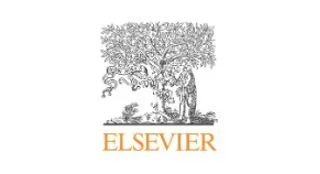
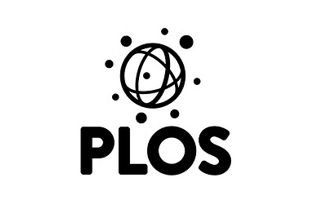
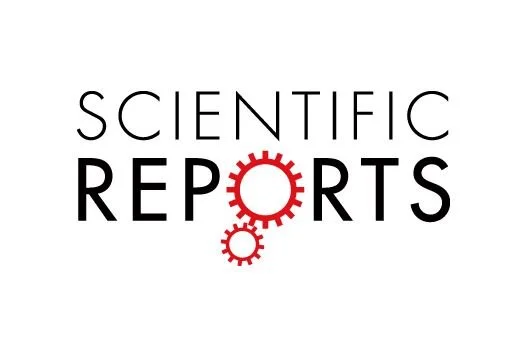
We developed and internally validated scales to measure economic and social resilience to environmental disturbances that quantify resilience as a latent construct and are grounded in resilience theory. These scales are suitable for application in urban informal settlements in Indonesia and Fiji. We recommend their use, with re-validation as needed, in the monitoring and evaluation of resilience-building interventions and policies targeting urban households in low-income settings.